Reviews of Films on DVD
© By John Arkelian
“Anna Karenina” (U.K., 2012) (B+): “I’ve got nothing left except you. Remember that…. You’ve murdered my happiness.” Those prophetic words, spoken by one of literature’s great tragic heroines to the man who is about to
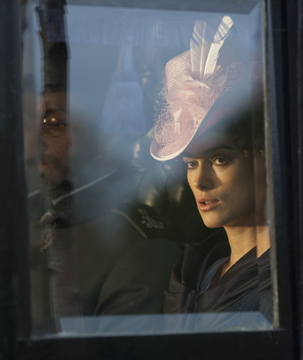
Keira Knightley in "Anna Karenina" (photo by Laurie Sparham, courtesy of Alliance Films)
become her lover, are uttered partially in jest; but they prove to be both true and prescient. For, in Leo Tolstoy’s sprawling, 864-page novel (originally published in installments in 1873-77), fierce, all-consuming passion truly does prove fatal to happiness. Or, perhaps it is as one of the novel’s translators observed, that one cannot build one’s happiness on another’s pain. In a boldly unconventional retelling of the novel that Time magazine listed among the ten best ever written, director Joe Wright (who also directed 2005’s big screen adaptation of “Pride & Prejudice”) offers a highly theatrical staging. Many scenes literally take place inside an old ornate theater, with groups of office workers moving in choreographed unison, one scene gradually bleeding into another, and a character leaving a formal party by climbing a ladder leading to the catwalks  overhead. This stylized and overtly theatrical approach is visually intriguing — rich with opulent costumes and sets — but it also keeps those scenes at one remove from the viewer on an emotional level, insofar as the artifice of the storytelling becomes a deliberate part of how the story unfolds. There is a great deal going on in Tolstoy’s story — with an ensemble of characters demonstrating the import of the book’s opening words, that, “Happy families are all alike; every unhappy family is unhappy in its own way.” It’s a story about the elusive thing we call happiness; but it is also very much about great passion, social and personal hypocrisy, selfishness versus selflessness, emotional insecurity, jealousy, faith, fidelity, marriages both good and bad, social change, and the respective merits of rural and urban life. It may be that the character Levin, a man sincerely interested in “living rightly,” is a semi-autobiographical representation of Tolstoy himself. But, at the heart of the story is the ill-fated passion of a married woman — the film’s flawed eponymous heroine — for a dashing officer who is not her husband. She gives up everything for love,
overhead. This stylized and overtly theatrical approach is visually intriguing — rich with opulent costumes and sets — but it also keeps those scenes at one remove from the viewer on an emotional level, insofar as the artifice of the storytelling becomes a deliberate part of how the story unfolds. There is a great deal going on in Tolstoy’s story — with an ensemble of characters demonstrating the import of the book’s opening words, that, “Happy families are all alike; every unhappy family is unhappy in its own way.” It’s a story about the elusive thing we call happiness; but it is also very much about great passion, social and personal hypocrisy, selfishness versus selflessness, emotional insecurity, jealousy, faith, fidelity, marriages both good and bad, social change, and the respective merits of rural and urban life. It may be that the character Levin, a man sincerely interested in “living rightly,” is a semi-autobiographical representation of Tolstoy himself. But, at the heart of the story is the ill-fated passion of a married woman — the film’s flawed eponymous heroine — for a dashing officer who is not her husband. She gives up everything for love,
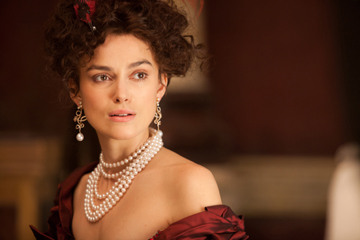
Keira Knighley in "Anna Karenina" (photo by Laurie Sparham, courtesy of Alliance Films)
uttering in the throws of the unbridled passion she has never experienced with her good, but unpassionate husband, the words, “This is love! This!” Presentiments of Anna’s doom recur at intervals throughout the film, with the sight and sound of an approaching train. Anna’s society tolerates infidelity in men, but it shuns women who transgress — at least it does if they flaunt their affairs or treat them as more than a trifle. Anna is mercilessly ostracized by society, a society in “the laws are made by husbands and fathers,” which is to say, by men. A disdainful woman says, “I’d call upon her if she’d only broken the law. But she broke the rules.” Anna’s own brother, a shameless serial philanderer, deems it “impossible” to offer succor to his outcast sister. The film offers strong performances from its ensemble cast, among them: Keira Knightly (as the passionate Anna, who is stifled by the demands propriety makes upon her); Jude Law (as her stiff, duty-bound, but still sympathetic husband); Kelly Macdonald (as Anna’s sweet sister-in-law Dolly); Matthew Macfadyen, who was Darcy to Keira Knightley’s Elisabeth in “Pride & Prejudice” (here playing her brother Stiva); Alicia Vikander (as Kitty) and Domhnall Gleeson (as Lavin). Aaron Taylor-Johnson is something of an acquired taste as Count Vronsky, the man with whom Anna conceives an all-consuming passion. At first, he comes across as rather too young and too ‘pretty;’ but, as the story progresses, he develops more facets. But, above all else, the film is a visual delight — full of sumptuous beauty and fecund inventiveness. There are a myriad of examples: The back of the stage opens to an expansive winter landscape. When Anna and Vronsky first dance, the other couples freeze motionless in pose for a few seconds as the couple whom only haves eyes for each other pass; and when Vronsky lifts Anna off the ballroom floor, she shudders in reaction, a visceral signifier of their nascent passion. The dancers make strange sweeping motions with their hands that seem to be emblematic of some choreographed rite rather than actual ballroom dancing motions. At a later party, women flutter their fans in unison like stylized swan wings; while Anna’s own fan movements later echo both the pulse of her own beating heart and the approaching hoof-beats of racing horses. And, time and again, we catch glimpses (as does Anna) of the grinding wheels of a locomotive, as the implacable harbinger of inevitable doom. Karenin warns Anna of what is coming: “You would be lost, irretrievably lost;” to which Anna can only reply, “All I know is that I sent him away, and it’s as though I shot myself through the heart.” Her story is one of overpowering emotion, of passions too potent to be ignored, and of impossible choices that can have no happy ending. For sheer visual panache, elegant performances, and compelling storytelling, “Anna Karenina” is easily among the year’s best films. “Anna Karenina” was nominated for Academy Awards for Cinematography, Music, Costume Design, and Production Design. At BAFTA, it won Best Costume Design and was nominated as Best British Film of the Year and in four other categories. It was nominated as Best Original Score (by Dario Marianelli) at the Golden Globes; it was nominated for Outstanding Achievement by the American Society of Cinematographers; and it was nominated for Excellence in Production Design by the Art Directors Guild. DVD extras include a director’s commentary, eight deleted scenes, and several useful featurettes. One of the latter discloses the thinking behind the costume design, which unexpectedly mixes 1950’s couture with 1870’s silhouettes. In Anna’s case, the look they were after was ‘a distillation of chic, luxury, and elegance.’ For ages 16+: Mild sexual content.
“Crazy Stupid Love” (USA, 2011) (B): When you meet your soul-mate, it’s supposed to be for life, right? That’s what Cal (Steve Carell) believes, anyway. He met the love of his life, Emily (Julianne Moore), in his teens. She was his first and only love, and he never dreamt that that could change — right up until the day she abruptly announces (in the first few minutes of the film) that she wants a divorce. Cal is shattered. He retreats, in self-pity, to the local bar that happens to be the chief playing field of Jacob (Ryan Gosling), a smooth operator and expert pick-up artist who leaves with a different beautiful woman on his arm every night. Jacob may not be subtle (“I guarantee you this: You’re never going to regret going home with that guy from the bar that one time that was a total tom-cat in the sack.”), but he makes up for it in self-confidence — and in a near-perfect ‘batting average.’ The one catch that eludes him is Hannah (Emma Stone), a flame-haired young woman who’s about to write the bar exams. Cal and Jacob cross paths at the bar, and Jacob resolves to take Cal on as a reclamation project. Recovering Cal’s “lost manhood,” as Jacob puts it, involves an extreme make-over, Lothario-edition (first to go are the Super-Clips haircut and the wallet that, quite literally, closes with Velcro) — and the human re-engineering process that follows is quite funny! The remodeled Cal starts to try his prowess at the bar (with such lovelies as Marisa Tomei); but, outward changes aside, his heart still beats for only one woman. And his 13-year old son Robbie (Jonah Bobo) is truly a chip off the old block — a confirmed romantic even at his tender years, he lives for two things — reuniting his sundered parents and winning the affections of his 17-year old babysitter, Jessica (winningly played by former competitive figure skater Analeigh Tipton), a girl on the threshold of young womanhood who, in turn, secretly pines for Robbie’s father! A tangled romantic comedy of errors ensues; and, in a plot turn almost worthy of a Shakespearian comedy, the libertine learns that his life of casual relationships is no substitute for the real deal: “I looked at people who were in love, and I thought the way that they were behaving and the things they were doing and saying… appeared pathetic. And I spent all this time with you, and I was trying to make you more like me; and it turns out, I just want to be…” Be? Be like Cal, perhaps? But that’s not giving anything away in a story that twists and turns in unexpected directions and keeps viewers amused all along the way. Those of us who regard ourselves as shameless romantics may yearn for straight-up (i.e. dramatic) cinematic romance (it is almost invariably — and usually inanely — twinned with comedy in contemporary Hollywood movies); but, this is one romantic-comedy combo that offers equal helpings of laughs and touching moments. “Crazy Stupid Love” has an appealing cast, with John Carroll Lynch in an amusing turn as an irate father, and Kevin Bacon as ‘the other man,’ in addition to all the appealing players named above. Co-directed by Glenn Ficarra and John Requa, the film was nominated for a Golden Globe as Best Actor (Ryan Gosling). For ages 18+: Adult situations, some sexual subject matter, and brief coarse language.
“Game Change” (USA, 2012) (B+/A-): “If he heals a sick baby, we’re really effed!” That’s the satirical appraisal of Barack Obama by his Republican

Ed Harris & Julianne Moore in "Game Change" (courtesy of HBO Films)
opponent, Senator John McCain, in the 2008 Presidential election campaign. McCain’s senior campaign strategist concurs: “He has 200,000 people screaming for him in Berlin. And what has he done? A man of no accomplishment has become the biggest celebrity in the world.” And how does one fight against star-power and celebrity? Why, with a game-changing counter move, of course. And the McCain team think they have found one in an instant celebrity of their own, the unknown neophyte Governor of Alaska, Sarah Palin, whom they hastily choose as McCain’s running mate and Vice-Presidential nominee: “We needed to do something bold to try to win the race.” And, at first, things look

Julianne Moore in "Game Change" (courtesy of HBO Films)
promising. Palin’s hits her speech at the Republican convention out of the proverbial ballpark, wowing listeners with her charisma and straight-talking persona. At 44, Palin is an attractive mother of five; her eldest son is about to be deployed to Iraq; her infant son was born with Down’s Syndrome; she took on both big oil and her own party establishment; she has high approval ratings in her home state; and she’s a soccer mom who likes to unwind by hunting moose. She’s made to measure as a pin-up gal for a significant portion of the electoral demographic. As McCain’s staff observes, “She’s so outside the box, she helps you regain the maverick label… She’s everything we need.” But in a moment of prescience, McCain wonders if “she might be too outside the box?” As it turns out, Palin does have many admirable qualities — she’s well-meaning; she’s an exceptionally talented natural actress, and she has the sincerity of an everywoman who has not yet been jaded by the grueling game of politics. She is talented at giving speeches, and she connects with ordinary folk. But, on the down side, there are immense gaps in her grasp of many things, including the salient issues of the day. She seems willing to learn; indeed, she is eager at first to close the gaps in her knowledge. But it seems that her reach has exceeded her grasp. A sinking sense of her own inadequacy for the high office she is seeking is the catalyst that diverts her attention from pressing matters at hand to peripheral

Julianne Moore & Ed Harris in "Game Change" (courtesy of HBO Films)
distractions. She rankles at being a perceived puppet of campaign handlers, and one sympathizes with her indignation; but, she seems unwilling or unable to focus the concentration needed to master the issues at hand. Things quickly start to unravel when Palin does face-to-face interviews. Her self-assurance falters, and her bluff starts to show through. And yet, her magnetic appeal to crowds of supporters enables her to retreat into illusions of her own greatness and to blame her stumbles on others: “All you’ve done is get in my way. Oh. And I am raising millions of dollars for this campaign. Hundreds of thousands of people are coming to see me, not John McCain, God bless him. They are coming to see me; so, if I am singlehandedly carrying this campaign, I’m going to do what I want!” Based on the book by journalists Mark Halperin and John Heilemann, “Game Change” is one part character drama, one part political drama. Both parts are utterly absorbing, for here we have fascinating people struggling for the highest of political offices. Whether you like Palin’s political views or loathe them, you are certain to connect with her as a decent, if flawed, human being. As McCain says, in sympathy, after she seems to go rogue, “That poor girl. She wasn’t ready for this.” It’s a story about hubris, ambition hindered by limitations, good intentions compromised by expediency, and good judgement hampered by wishful thinking. (And there are early warning signs of the irrationally hateful attitudes about Barack Obama that still persist in some right-wing quarters, with a few people at McCain rallies shouting invectives like, “He’s a Muslim,” “He’s a socialist!,” “Send him back to Africa!”, and “Kill him!” about Obama — to the appalled consternation of McCain himself.) And the film’s exceptional performances are all award-caliber! Not only will you feel like you are eavesdropping in a room with the real McCain, Palin, et al., you will be astonished at how much you sympathize with their varied 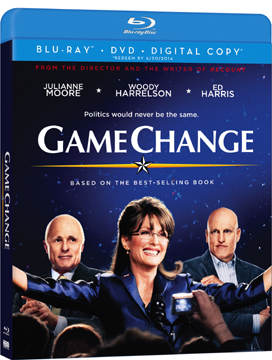 struggles and doubts. Julianne Moore is simply remarkable as Sarah Palin: She channels the character with a verisimilitude that has to be seen to be believed. Every bit as good are Ed Harris as John McCain (a man who actually wants to take the high road), Woody Harrelson as his senior strategist Steve Schmidt (who comes to the gradual realization that he has made a dire mistake in suggesting Palin as a running mate), Sarah Paulson (as campaign adviser Nicole Wallace, who has the unenviable job of guiding Palin along the desired path), and Jamey Sheridan and Peter MacNicol as other members of the McCain team. “Game Change” is one of the most critically praised and heavily awarded films of the year. At the Golden Globes (in the made-for-television category), it won Best Film, Actor (Harris), and Actress (Moore), and it was also nominated as Best Actor (Harrelson) and Actress (Paulson). At the prime-time Emmy Awards, it won five awards, as Best Film, Actress (Moore), Director, Writing, and Casting, and it was nominated in seven other categories, as Best Actor (Harrelson), Supporting Actor (Harris), Supporting Actress (Paulson), Cinematography, Music, Single-Camera Editing, and Sound Mixing. The AFI (American Film Institute) Awards named it the Best Television Program of the Year. It won Best Actress at the Screen Actors Guild, where both male leads were nominated for Best Actor; and it was a nominee as Best Television Movie at the Writers Guild of America awards. Made for HBO, “Game Change” is much better than most of what is shown on the big screen. It is one of the best films of the year, and it is highly recommended! For ages 18+: Abundant coarse language.
struggles and doubts. Julianne Moore is simply remarkable as Sarah Palin: She channels the character with a verisimilitude that has to be seen to be believed. Every bit as good are Ed Harris as John McCain (a man who actually wants to take the high road), Woody Harrelson as his senior strategist Steve Schmidt (who comes to the gradual realization that he has made a dire mistake in suggesting Palin as a running mate), Sarah Paulson (as campaign adviser Nicole Wallace, who has the unenviable job of guiding Palin along the desired path), and Jamey Sheridan and Peter MacNicol as other members of the McCain team. “Game Change” is one of the most critically praised and heavily awarded films of the year. At the Golden Globes (in the made-for-television category), it won Best Film, Actor (Harris), and Actress (Moore), and it was also nominated as Best Actor (Harrelson) and Actress (Paulson). At the prime-time Emmy Awards, it won five awards, as Best Film, Actress (Moore), Director, Writing, and Casting, and it was nominated in seven other categories, as Best Actor (Harrelson), Supporting Actor (Harris), Supporting Actress (Paulson), Cinematography, Music, Single-Camera Editing, and Sound Mixing. The AFI (American Film Institute) Awards named it the Best Television Program of the Year. It won Best Actress at the Screen Actors Guild, where both male leads were nominated for Best Actor; and it was a nominee as Best Television Movie at the Writers Guild of America awards. Made for HBO, “Game Change” is much better than most of what is shown on the big screen. It is one of the best films of the year, and it is highly recommended! For ages 18+: Abundant coarse language.
“Searching for Sugar Man” (Sweden/U.K., 2012) (A-): “What he demonstrated very clearly is that you have a choice. He took all that torment, all that agony, all that confusion and pain, and he transformed it into something beautiful… Insofar as he does that, I think he’s representative of the human spirit, of what’s possible. That you have a choice.” That’s what a philosophical working man in Detroit says about his friend — the construction worker and day-laborer Sixto Rodriguez. For Rodriguez is also a towering musical talent, a singer/songwriter equal in stature to Bob Dylan, who remained entirely unknown in his native America, even as, unbeknownst to the artist himself, this “hippy with shades” became a rebel icon in the ultraconservative apartheid era society of far-off South Africa: “To many of us South Africans, he was the soundtrack to our lives.” In 1970, a pair of music producers went to see Rodriguez, this undiscovered phenom of whom they’d heard rumors, in a riverside Detroit bar that was filled with smoke so thick you could cut it with a knife. And there he was, sitting in a corner, with his back to the bar’s patrons, singing unforgettable songs that embodied the mean streets and the struggles of the working poor. “Detroit in the 70’s was a hard place. Well, it’s still a hard place. Lots of decay, lots of ruined houses. Real poverty exists in this city. And those streets were Rodriguez’s natural habitat… He was this wandering spirit… a drifter… We thought he was like the inner city poet… a wise man [and] a prophet.” The producers signed Rodriguez and two record albums (“Cold Feet” and “Coming from Reality”) followed. But they flopped — notwithstanding the sheer, unmistakeable brilliance of the lyrics, music, and vocals — and Rodriguez slipped back into obscurity. He slipped back into obscurity, that is, everywhere but in South Africa. There, this mysterious figure, about whom nothing was known save his music, became a living legend. In fact, his music was the inspiration for the white liberal middle class opposition to apartheid. Urban legends sprang up purporting that he had dramatically killed himself on stage; but, in 1998, two determined fans in South Africa became amateur sleuths, tracking their hero down in the place where he’d started — the rough streets of inner city Detroit. There Rodriguez was doing what he’d always done — hard manual labor, renovating houses and carrying old refrigerators down staircases on his back! His records had ‘gone gold’ ten times over in South Africa, but Rodriguez knew nothing of their runaway success there; nor did a penny of the royalties sent to his U.S. record label ever reach him. But that didn’t embitter this unpretentious man. Instead, he raised his three daughters with the conviction that a person’s dreams and self-worth should not be limited by their material poverty. When his adoring South African admirers learned that their musical luminary was alive and well, they brought him to Cape Town, where Rodriguez serenely took to the stage to perform six consecutive concerts to sold-out crowds of thousands of rapturously elated fans. The result is a wonderful real-life fairy tale, a story that has to be seen to be believed, with a protagonist who is modest, soft-spoken, shy, gentle, and incredibly talented. Directed by Swedish director Malik Bendjelloul, “Searching for Sugar Man” is one of the best films of 2012. The film is currently a leading contender for Best Feature-Length Documentary at the upcoming Academy Awards. It has attracted many awards and nominations elsewhere. It won the Audience Award and Special Jury Prize at Sundance, where it was also nominated for the Grand Jury Prize. It won the 2nd Place Audience Award at Tribeca; it won the Audience Awards at the Amsterdam and L.A. Film Festivals; and it won Best Documentary at film festivals in Moscow and Athens. It is a nominee for Best Film and Best Screenplay at Sweden’s Guldbagge Awards; and it is a nominee as Best Documentary at BAFTA in the U.K. “Searching for Sugar Man” is a must-see! For ages 18+: Very brief coarse language.
“Arbitrage” (USA, 2012) (B+): Hedge-fund magnate, oracle of high finance, and billionaire, Robert Miller (Richard Gere) is one of those uber-wealthy Wall Street financiers who regard themselves as “masters of the universe.” The story opens with him being admiringly interviewed for his accomplishments. He is on the verge of selling his company for hundreds of millions of dollars, he is a prominent philanthropist, and he has a bright, beautiful wife, Ellen (Susan Sarandon) and an accomplished daughter, Brooke (Brit Marling). The world is his oyster, as the saying goes. He embodies and projects a certain image — the image of success. But things are fraying beneath the surface: A sure-thing investment (involving copper mines in Russia) has gone terribly wrong. As a consequence, Miller has had to rob Peter to pay Paul, and he’s desperate to sell his company before anyone discovers the gaping hole in its books. Defending his unlawful and unethical actions to his principled daughter, Miller proclaims: “I am the oracle. I have done housing. I have arb’d credit swaps. I have done it all. And yes! I know! It’s outside the charter, but it is effing minting money! It is a license to print money! For everybody. For ever! It is God!” “Until?,” his daughter asks. “Until it’s not,” Miller replies. He is walking on the very precipice of imminent financial catastrophe; but, as if that weren’t bad enough, troubles with his mistress Julie (Laetitia Casta) and his involvement in a fatal motor vehicle accident have given Miller another urgent reason to stay one step ahead of the law (in the persistent person of a detective played by Tim Roth). Gere does award-caliber work in this directorial debut from writer/director Nicholas Jarecki: Here is a man who has dedicated his life to ego and to accumulation. He lives for the trade, he’s obsessed with the deal, and he measures everything according to its value in cold hard cash. Yet, the remarkable thing — about the movie and the man — is that he still possesses a heart and a hold on our sympathies. He is a flawed man, yes, but he is not a fundamentally bad one. The film takes its title from a term from the world of finance: ‘Arbitrage’ refers to the purchase of currencies, securities, or commodities in one market for immediate resale in another market where their price is higher. It’s all about profiting from speculation (and sometimes from inside information). Writer/director Jarecki likens his antihero to a shark, who must keep moving to survive. But, unlike too many real-life financial crooks, Miller does not set out to defraud anyone. Rather, he is simply too enamored of his own Midas touch, too given over to the compelling force of sheer ego and the intoxicating hubris of imposing his will on the world around him. The result has something of a Greek tragedy about it. This fine film combines subject matter (large-scale financial chicanery) that is torn from the headlines with strong character drama and suspense film conventions. There are also some subtle elements of social satire, as we discover just how many people and institutions on both sides of the law are willing to lie and cheat in order to get what they want. The combined Blu-ray/DVD release from VVS Films offers two featurettes and deleted scenes on the former disc. The director’s commentary can been accessed on both discs, and a fascinating commentary it is, too, canvassing everything from the choice of songs (like “My Foolish Heart”) to the German concept of “schadenfreude” (taking pleasure in another’s misfortunes) to Aristotle’s “Poetics” (penned nearly 2400 years ago). “Arbitrage” was named one of the year’s Top Ten Independent Films by the U.S. National Board of Review; and Richard Gere was deservedly nominated as Best Actor at the Golden Globes. For ages 18+: Coarse language.
“The Tree” (Australia/France, 2010) (B/B+): When an eight year old girl’s father dies suddenly, she becomes innocently convinced that he is 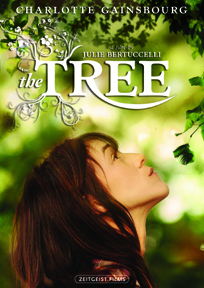 whispering to her in the rustling leaves of the immense Moreton Bay fig tree that looms over her family’s home in Australia’s Outback. Shot on location in Queensland, the ruggedly beautiful setting infuses this gentle story about loss, inconsolable grief, longing, and the hope of renewal, taking on a personality of its own. Despite the hint of ‘magic-realism’ in its premise, what we see and hear is thoroughly rooted in the natural world: The creaking of this majestic tree’s limbs, the rustling of its leaves in the wind, and the flora and fauna that shelter under its boughs are viscerally real, thanks to the film’s quietly understated tone. Only 40-ish when he succumbs to a sudden heart attack, Peter O’Neill (Aden Young) leaves behind him a young wife (played by British-born, French-resident actress Charlotte Gainsbourg) and four children. Of the four, young Simone (winningly played by Morgana Davies) is the precocious tom-boy who first makes a connection between her late father and the tree under which he died. Her stubborn certainty about that
whispering to her in the rustling leaves of the immense Moreton Bay fig tree that looms over her family’s home in Australia’s Outback. Shot on location in Queensland, the ruggedly beautiful setting infuses this gentle story about loss, inconsolable grief, longing, and the hope of renewal, taking on a personality of its own. Despite the hint of ‘magic-realism’ in its premise, what we see and hear is thoroughly rooted in the natural world: The creaking of this majestic tree’s limbs, the rustling of its leaves in the wind, and the flora and fauna that shelter under its boughs are viscerally real, thanks to the film’s quietly understated tone. Only 40-ish when he succumbs to a sudden heart attack, Peter O’Neill (Aden Young) leaves behind him a young wife (played by British-born, French-resident actress Charlotte Gainsbourg) and four children. Of the four, young Simone (winningly played by Morgana Davies) is the precocious tom-boy who first makes a connection between her late father and the tree under which he died. Her stubborn certainty about that
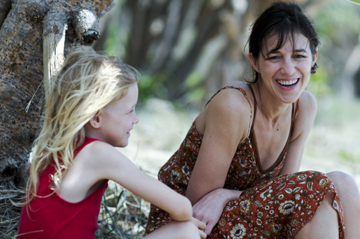
Morgana Davies & Charlotte Gainsbourg in "The Tree" (courtesy of Mongrel Media in Canada and Zeitgeist Films in U.S.A.)
connection comes to influence how her siblings and mother view the tree, too. But, if it is a protective, watchful spirit, the tree also poses mounting challenges, in the form of tendrils that hold the house in a tight embrace and roots that threaten to tear the house loose from its foundations. Here is metaphor writ large, as a family goes through varied stages of grief. Gainsbourg’s Dawn is initially numbed by her loss, hardly ably to get out of bed in the morning, let alone care for her four children. Indeed, her character is not altogether likable, too often coming across as both mopey and dopey. In time, the possibility of her finding romantic companionship with a new man (played by Marton Csokas) brings Dawn into conflict with Simone and perhaps with the tree itself. But the tree roots blocking the house’s drains are highly suggestive of emotional blockages, about coming to terms with great loss and learning to carry on with the business of life despite that loss. French director Julie Bertucelli adapted “The Tree” from an earlier screenplay by Elizabeth J. Mars, who in turn adapted it from the novel “Our Father Who Art in the Tree” by Judy Pascoe. While the adult lead Gainsbourg fails to strike a sympathetic chord with this reviewer, that discordance may be a subjective one. Others may warm to her character; and even if they do not, the film offers ample compensations in the rest of the cast, in the strangely compelling setting, in the sheer originality of its premise, and in the film’s admirably understated tone. “The Tree” was nominated for seven Australian Film Institute awards, among them: Best Actress (for both its adult and child leads) and Director; while, in France, it earned Cesar nominations for Best Actress, Adapted Screenplay, and Music. “The Tree” is distributed on DVD in the United States by Zeitgeist Films and in Canada by Mongrel Media. The Canadian version has no DVD extras, but the American release has the film’s trailer, nine very worthwhile deleted scenes (tallying up to over 22 minutes), and a half-hour documentary about the making of the film. What neither version has, however, is a commentary with the director and cast, and such a commentary would be very welcome for such a thoughtful, artful film. Mild sexual content and very brief coarse language.
“Facing Windows” [“La Finestra di Fronte”] (Italy/U.K./Turkey/Portugal, 2003) (A-/A): A quarreling couple, Giovanna and Filippo, played by the identically-named Giovanna Mezzogiormo and Filippo Nigro, come across a distinguished-looking old man (Massimo Girotti) who is clearly lost and helpless. He seems to be without any memory of who or where he is. Despite Giovanna’s misgivings, they give the old man temporary refuge; but he is haunted by the ghosts of past tragedy, and his sudden, unsettling presence in the already unsteady lives of others may prove to be a catalyst for unexpected change. For Giovanna is unfulfilled, surreptitiously observing a handsome neighbor (Raoul Bova as Lorenzo) across the courtyard each night from the vantage-point of her own discontentment. A story about choices, memories, desire, and the relationships that change our lives, this is one of the best films of 2003. It is intelligent and beautifully acted. You watch these faces intently. There’s a redemptive theme, a poetic sensibility, and nice big subtitles (that are easy to read for a change). “Facing Windows” is gently moving, utterly involving, very authentic in its emotional heft, and highly recommended: “You still have a choice. You can change… Don’t be content to merely survive. You must demand to live in a better world, not just dream about it. I didn’t do that.” This heavily honored film won five awards at Italy’s David di Donatello Awards, namely Best Film, Actor (Girotti), Actress, Music, and a Scholars’ Jury Award; and it was nominated in seven other categories, including Best Director, Screenplay, Cinematography, and Supporting Actress. It also won Special Recognition for Excellence in Filmmaking from the U.S. National Board of Review. “Facing Windows” was directed and co-written by Ferzan Ozpetek, who moved to Rome from his native Turkey and worked in live theater before film. The film’s musical score (by Andrea Guerra) has a central theme that is as powerful, haunting, and poignant as the most vivid of dreams. (If only the film score were available on CD in these parts!) For ages 18+: Coarse language; brief partial nudity; brief sexual content.
“Paradise” (USA, 1991) (A-/A): Is paradise as much a state of mind as it is a place? This gem of a film (which should not be confused with the 1982 “Blue Lagoonish” fluff of the same name) seems to have been overlooked by audiences and critics alike. And that’s a real shame, for this sweet, gentle coming of age story has a quiet poignancy and memorable performances. It elicits real emotions from the viewer, and that’s a rare quality indeed. One summer, ten-year-old Willard Young (Elijah Wood) is taken by his pregnant mother (Eve Gordon) to spend a few weeks with her best friend in the countryside. Willard is resistant to the plan, suspecting there’s more to his father’s long absence than he’s been told: (A) “Wake up… We’re here.” (B) “Where?” (A) “Paradise.” (B) “This is it?” As it happens, their destination is a pretty idyllic looking place; but there is veiled discord and unhappiness in this bucolic paradise. Willard is a very bright and unusually perceptive child; but he is also introverted and friendless. That changes in his new setting: He is befriended by the slightly younger but much bolder and more extroverted young tomboy Billie Pike (Thora Birch) and he gradually bonds with the married couple to whom he has been entrusted. But Willard can see that something is wrong between Ben and Lily Reed (Don Johnson and Melanie Griffith). Before Willard knows who Ben is, Ben tells him that he doesn’t like the Reeds anymore. Later, he says that, “Lily used to be different, not the person you know now. She didn’t used to be afraid of anything… She was so full of life, she gave off a sort of heat.” But Ben and Lily have suffered an awful loss, and it has left them sundered, bereft, and tormented by needless guilt: “I can’t stand to be touched. I can’t stand to feel anything. All I can stand is just to be numb instead. And to be sorry every single minute.” So, when the minister at the Sunday church service exhorts his assembled parishioners to “give your hand in forgiveness and love,” Ben sits with his arms folded across his chest, as Lily looks straight ahead. As she confides to the precocious boy in her care: “Sometimes things happen to people, hard things, and they get broken inside. I want Ben to come back; but I don’t know if I can fix what’s broken inside of me.” For this is a story about pain and loss, but also about forgiveness and love. And it’s about facing down the things that frighten us: “Don’t run away from things just because they scare you Willard. If you do, you’ll always be afraid. It’s a bad way to live.” In her directorial debut, screenwriter Mary Agnes Donohue has adapted and remade the award-winning film “Le Grand Chemin” [“The Grand Highway”] (France, 1987), which, in turn, was written and directed by Jean-Loup Hubert from his novel. Set in South Carolina, “Paradise“ is a gentle, wistful coming of age story, about reconciliation and love renewed. It boasts strong ensemble characterization and memorable performances by Melanie Griffith and Don Johnson (both of them admirably understated) as well as Elijah Wood and Thora Birch (both of whom are eminently believable as precocious kids who find an end to their friendlessness in each other), Canada’s own Sheila McCarthy, as young Billie’s colorful mother Sally, and Louise Latham (who makes a strong impression in one scene as a solitary artist), and Eve Gordon (who likewise creates a tangible sense of her character as Willard’s mother in just a few scenes). Birch won Best Young Actress at the Young Artist Awards, and Wood was nominated there as Best Young Actor. The beautifully emotional orchestral score by David Newman harkens back to the glory days of movie music. Its bittersweet ode to childhood adds a powerful emotional wallop to the movie, full of nostalgia, a sense of wonder, and the never-ending interplay between sadness and joy. Newman has scored many movies, earning an Academy Award nomination in 1997 for “Anastasia.” But, thus far, he has done his best work in “Paradise” and in 2005’s “Serenity. “Sadly, “Paradise” appears to have fallen out of print on both DVD and VHS. That’s a shame, because it is a real treasure. For ages 14+: Very brief partial nudity.
“Thirteen Conversations About One Thing” (USA, 2001) (A): Here are four intersecting stories about cause and effect, meaning, luck versus providence, and second chances. The result is remarkably intelligent, thought-provoking, and philosophical: “Life only makes sense when you look at it backwards. Too bad we have to live it forwards.” The captivating characters are portrayed by a note-perfect cast: Matthew McConaughey, Alan Arkin, Clea DuVall, John Turturro, and Amy Irving. Director Jill Sprecher co-wrote the script with her sister Karen. The “one thing” of the title is happiness: (Q) “What is it that you want?” (A) “What everyone wants. To experience life. To wake up enthused. To be happy.” In exploring the riddle of happiness, we meet one character who seeks freedom from a life of predictability and dull routine, only to find that his demons follow him into his new life. Another character is cynical and bitter about the happiness of others: “Show me a happy man, and I’ll show you a disaster waiting to happen.” But happiness isn’t a riddle for nothing: Its enigmatic and elusive ways defy comfortable formulations, as each of the film’s characters discover. Among its awards recognition, this film was nominated at the Independent Spirit Awards for Best Supporting Actor (Arkin) and Screenplay. “Thirteen Conversations About One Thing” is easily one of the best films of 2001, and it is highly recommended! For ages 18+: Coarse language.
“Morlang” (The Netherlands, 2001) (B+/A-): Julius Morlang (Paul Freeman), a successful British artist living in Rotterdam, may be over 60, but he is as vital and virile as ever. His muse, Ellen, also happens to be his wife; and the couple seem to be passionate about each other — artistically, sexually, and romantically. But Morlang comes to suspect that his wife may be having an affair with Robert (Marcel Faber), a younger Dutch artist; and, that perceived rival is also attracting the attention of Morlang’s longtime agent and friend Wim Giel (Eric van der Donk), who suddenly starts to find Morlang’s work to be insufficiently avant garde. How all of this affects Morlang is the stuff of subtle ambiguity. For Morlang is not given to outward demonstrations of emotion. Indeed, Ellen angrily confronts him about the impassive face he presents to the world: “Please come out of your effing shell!… Maybe I just can’t stand it anymore. Maybe I can’t stand your passivity. The way you keep everyhing bottled up is pure effing arrogance… You’re not so effing calm, are you? You’re bloody seething [but you won’t admit it].” When Morland develops a relationship with a lively younger Irish woman, Ann (Susan Lynch), is he striking out against Ellen? Director and co-writer Tjebbo Penning has fashioned a sleek, stylish character puzzle that combines first-rate performances, intelligence, and truly artful direction. At one moment, for instance, Morlang follows his wife to spy on her. But, instead of showing us what he espies, we see the emotional result on Morlang himself of whatever it is he sees. At another moment, someone comes to a crucial fork in the moral road; hesitating for a moment, that character looks out a window to visualize one course of action before walking out the door to very deliberately take a very different course of action. A Dutch film, performed in English by a mostly British cast, “Morlang” is a fine psychological drama about passion, creativity, jealously, deceit, and something darker — something seething beneath an outwardly calm surface. Its settings are divided between Rotterdam and coast of Ireland near the imposing Cliffs of Moher. Its story eschews histrionics in favor of subtlety, and it goes in some very unexpected directions! Though the film was honored at a couple of film festivals, it somehow seems to have eluded the attention and praise it so richly deserves as a very grown-up, very elegant psychological drama. For ages 18+: Coarse language; brief nudity; and brief sexual content.
“Incendies” (Canada, 2010) (A-): When a Lebanese-Canadian woman, Nawal (played with quiet power and dignity by the Belgian actress Lubna Azabel), dies suddenly in middle age, she leaves a series of troubling requests to her two adult children. The twins — Jeanne (Melissa Desormeaux-Poulin) and Simon (Maxim Gaudette) — are to search for the brother they never knew they had and for the father they always believed was long dead. In the process, they are sent on a journey into their mother’s past, into a life filled with unsuspected fire and frenzy — the fire and frenzy of great love, great loss, great pain, great suffering, and great endurance. Why has their mother instructed that she be buried naked and “face down away from the world,” without any headstone to mark her presence? The twins are about to find out, as they assemble the scattered pieces of the puzzle that is their mother’s past. Adapting his screenplay from the play by Wadji Mouawad, Canadian writer/director Denis Villeneuve’s film flows lyrically back and forth in time: We see Nawal’s story unfold as a young woman caught up in man’s monstrous inhumanity to man, even as we retrace her footsteps years later through the eyes of her Canadian daughter. The fulcrum of the story is the savage sectarian war that raged inside Lebanon between 1975 and 1990. That brutal internecine conflict took tens of thousands of lives and reduced a once proudly civilized and European society to savagery. When Jeanne embarks on her journey to discover the unspoken history of her mother’s tragic life, her kindly mathematics mentor succinctly summarizes the nature of what she has taken on: “Now you are embarking on a new adventure. You will face insoluble problems that will lead to other, equally insoluble problems. Friends will insist that the object of your toil is futile. You’ll have no way of defending yourself, for the problems will be of mind-boggling intensity.” Only later do we realize that those words, as accurate as they are for Jeanne’s quest, are even more apt for the monumental struggle of her mother’s life. “Incendies” is a riveting, heart-wrenching story about the connections between a mother and her children. Quietly powerful, the film will just about break your heart at times. We get caught up in the intersecting stories of Nawal, Jeanne, Simon, and their trusted family friend Jean Lebel (Remy Girard). Hatred, violence, and anger have dealt them a horrific series of blows; but they go on, each in their own way, refusing to be broken by adversity or by outright malevolence. Their story is rich is irony. It deals with very painful things; but, at its heart, it’s all about “a promise to break the chain of anger,” a promise that is born of love. The result is a powerful, emotional film that will stay with you long after you’ve seen it. “Incendies” attracted many nominations and awards. It was nominated as Best Foreign Language Film at the Academy Awards and at BAFTA. It was nominated as Best Foreign Film at France’s Césars and Italy’s David di Donatello awards. It won eight awards at Canada’s Genies, namely, Best Film, Actress (Azabel), Director, Adapted Screenplay, Cinematography, Editing, Sound, and Sound Editing; where it was also nominated for Art Direction and Make-up. It won ten awards at Quebec’s Jutra Awards, among them Best Film and Actress, while it was also nominated for a second Best Actress award (for Desormeaux-Poulin). The U.S. National Board of Review named it as one of the year’s Top Five Foreign Films; and it won Best Canadian Film at the Toronto International Film Festival. For ages 18+: Very brief coarse language; war-related violence; and disturbing themes.
“The Queen of Versailles” (USA, 2012) (B+): “Everyone wants to vacation like a Rockefeller. We show them how they can. Everyone wants to be rich… The next best thing is to feel rich. That’s the guiding philosophy that made David Siegel, the founder and CEO of the largest privately-owned time-share company in the world, a billionaire. He takes pride in asserting that, “I personally got George W. Bush elected.” His wife is a former model and beauty pageant queen — a statuesque blonde fond of fur coats and small dogs. The mother of eight (seven of them by birth), Jackie also happens to be 30 years younger than David (she’s 43, he’s 74): “It took me awhile to fall in love with him. It felt wonderful to be so adored. That’s what attracted me.” When their story opens, they live in a very big house; but they have something even bigger in the works — an enormous, 90,000 square foot Floridian palace loosely modeled on Versailles. But the largest house in America is incomplete when the wheels fly off the American economy in 2008. Work on their mega-house (listed at $75 million even its unfinished condition) stops, and David’s biggest, boldest time-share complex, in Las Vegas, is imperiled by the bankers he and Jackie see as vultures. On the home front, cutbacks are called for — and some are made: Their staff of domestic servants is cut from nineteen to four, the kids exchange private schools for public ones, some pets expire from neglect, and, all the while, the family’s pack of little dogs leave their droppings hither and yon. But the couple is accustomed to living large (very large indeed); and, while the shopping may be done at Walmart, Jackie gets there in a stretch limo. David frets about more than just Jackie’s shopping sprees: “Every light in the house is on,” becomes his plaintive refrain. Is Jackie the proverbial ‘trophy wife?’ One daughter thinks so. After all, David did threaten to ‘trade Jackie in’ for two 20-year olds when she turned 40. Both of them came from humble origins. In Jackie’s case, her home town in New York State offered limited opportunities for advancement: “I figured I could either be a secretary and work for an engineer, or I could be an engineer.” She had the ambition and ability to opt for the latter, and she got a degree in computer engineering. But she soon bored of that work, flying away to the big city to work as a model instead. Jackie had intelligence, but she calculated that she could advance more rapidly and more dramatically by relying on her beauty. But physical beauty can fade with age, and Jackie takes preemptive measures with cosmetic treatments that leave her face looking temporarily burned and ravaged. On looking at what Jackie has undergone to maintain her beauty, David recoils from her post-treatment (and still raw) face, callously remarking that, “I don’t want to kiss some old hag.” With colorful characters that would be the envy of most fictional stories, filmmaker Lauren Greenfield has fashioned an irresistible documentary film about a couple who embody the so-called American dream and take it to its ultimate extreme. What’s remarkable here is just how engaging they are, proverbial warts and all. They may be filthy rich, but they’ve got an instantly recognizable array of eminently human foibles, worries, and vanities. They are funny, compulsively watchable, and, oddly enough, even a little poignant at times. Someone called “The Queen of Versailles” a funny allegory for the American dream. More than that, it may be a microcosm for the state of North American society — living beyond our means, transfixed by empty materialism, placing value on the superficial, gaudy, or crass, instead of the truly valuable things in life. Too often, as a society, we in the West overlook character in favor of cosmetic glitz, we buy things rather than manufacturing them, we neglect real family values, we put accessorizing above improving minds, and we foolishly prefer quantity to quality. That’s the bigger context to this film, which won Best Director in the documentary category at the Sundance Film Festival; but, at its heart, it’s the utterly fascinating story of two specific individuals — a pair we like, whatever their flaws.
“The Girl with the Dragon Tattoo” (USA, 2011) (B+/A-): Given the strength of the 2009 Swedish film of the same name, it was hard to imagine what an English-language remake could possibly add. But, as it turns out, this remake stands on its own as a laudable cinematic retelling of Stieg Larsson’s bestselling novel. When disgraced investigative journalism Mikael Blomkvist (Daniel Craig) is engaged by the aging corporate magnate Henrik Vanger (a star turn by Canada’s Christopher Plummer) to look into the disappearance of a beloved niece 40 years earlier, the wealthy recluse tells him, “Someone in this family murdered Harriet… You’ll be investigating thieves, misers, bullies… the most detestable collection of people that you will ever meet. My family.” Blomkvist takes on the work, welcoming the opportunity it offers to escape his own recent notoriety, and his efforts soon bring him face-to-face with an unlikely ally. Lisbeth Salander (Rooney Mara) is outwardly as hard as nails — a Goth-girl, punk-rocker, computer hacker, complete with facial piercings that telegraph her street-cred as a rebel and outsider. But she is also badly wounded psychologically from a lifetime of abuse and neglect. Somehow, this improbable pair click — as workmates, friends, and perhaps more. The relationship between this 40-something man and this 20-something young woman, truly the oddest of odd couples, is at the very heart of the story’s hold on viewers. They are worlds apart in age, socio-economic status, and emotional make-up, but, somehow, they fit together. And it doesn’t hurt that they inhabit a story that’s pregnant with brittle suspense, a gnawingly ominous sense of dread, and superlative character work from the great Stellan Skarsgard and supporting players like Joely Richardson, Steven Berkoff, Robin Wright, Geraldine James, Donald Sumpter, Yorick van Wageningen, and Goran Visnjic. And it is all punctuated with startling moments of sudden, sometimes brutal, violence. Directed by David Fincher and written by Steven Zaillian, “The Girl with the Dragon Tattoo” won an Oscar for Best Editing; it was also nominated for Academy Awards for Best Actress, Cinematography, Sound Editing, and Sound Mixing. It won a Saturn Award as Best Thriller; it won Excellence in Production Design from the Art Directors Guild; it was nominated at the Golden Globes for Best Actress and Musical Score; and Rooney Mara was recognized by the National Board of Review as Best Breakthrough Performer. For ages 18+. Warning: Brief coarse language; nudity; sexual content; violence, including sexual violence; and disturbing content.
“Take This Waltz” (Canada, 2011) (C+/B-): Sometimes each of us is our own worst enemy. That’s true of all of the characters in Canadian writer/director Sarah Polley’s story about happiness being marred by restlessness. Early in the film Margot (Michelle Williams) watches costumed re-enactors at the Fortress of Louisbourg as they conduct a “public humiliation” of an adulterer: “Are you sorry? Are you contrite?” ask the disapproving voices of society’s guardians. The moment is full of foreshadowing; for it is the very time and place in which Margot meets Daniel (Canadian actor Luke Kirby), igniting an attraction that will gradually threaten to undermine Margot’s marriage to Lou (Seth Rogen). Fate (or contrived writing) takes a hand as Margot and Daniel happen to be seatmates on the flight back from Nova Scotia. They share a cab, and it turns out that Daniel lives right across the street (literally) in Toronto. (Such screenwriting contrivances would suit a romantic comedy better than a serious drama.) Proximity only fuels the fire of growing restlessness on Margot’s part. She seems discontented at home, for reasons that are never entirely clear. What is clear is that the odd games she plays with her cookbook writer husband grate on the viewer: One moment they are burbling in infantile baby-talk; the next they are exchanging mock-violent verbal quips of a sort better suited to eight year olds. Margot’s enigmatic restlessness is at the heart of the story: Is it fueled by feelings of neglect or boredom with her amiable spouse? Is it prompted by feelings of passion and/or love for ‘the other man?’ Or, is it simply a self-destructive yen for the figurative ‘grass on the other side of the fence?’ Margot’s sister-in-law Geri (played by comedian Sarah Silverman) is not too foggy from drink to guess that Margot is being tempted to stray; and she warns Margot that “New things get old” — words that take on pinpoint accuracy as the story progresses. “Take This Waltz” is a slow-paced, quiet film full of introspective conversation. The trouble is that it is better acted than it is written. The screenplay treads very near the borderlands of artificiality, contrivance, and affectation, and, perforce, it crosses that border at times: (A) “I want.” (B) “You want?” (A) “I want to know what you do to me.” At times, you will swear that you can hear the screenwriter behind the actors. And things sometimes get a tad pretentious. Among other missteps: What’s up with the lingering, utterly gratuitous nudity of several women (of varying ages and shapes) in a gym shower? Maybe that scene is meant to whet our appetites for the wildly excessive journey of sexual discovery depicted late in the film. Who knew that marital fidelity could be undermined by a hankering for “threesomes?” That improbable excess comes out of nowhere and nearly derails the film. Other improbabilities include: a couple with limited means (he’s a rickshaw driver, for heaven’s sake) inhabiting an enormous downtown loft, and a public swimming pool that’s open (but entirely deserted) at night, all too conveniently waiting to serve as a trysting location for a couple of aquatically-minded paramours. The film seems to be about Margot’s choice between comfort and security (in the person of Lou) and seeming excitement (in the person of Daniel). All of us can long for what we don’t have. But does desire lead to fulfillment or to more emptiness? “Take This Waltz” is too laid-back for its own good. It lacks energy. And, despite its solid performances, its characters (and their relationships) always feel off-kilter. None of it of it engages emotionally or viscerally, until, perhaps, its final scene. That moment has a poignancy one wishes was more evident throughout. “Take This Waltz” attracted two Genie Award nominations (Actress and Make-up) and four Director’s Guild of Canada Award nominations (Director; Editing; Production Design; and Sound Editing). For ages 18+: Coarse language; very frank sexual language in one scene; nudity; and sexual content.
Note: For another critic’s take on “Take This Waltz,” see Milan Paurich’s comment at: https://artsforum.ca/letters
“House of Dark Shadows” (USA, 1970) (B+/A-): When producer Dan Curtis dreamt up the idea for a Gothic television drama, he envisaged a
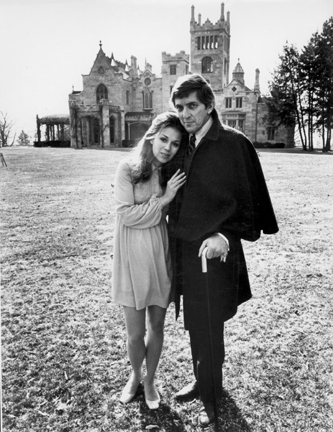
Kathryn Leigh Scott & Jonathan Frid in "House of Dark Shadows (courtesy of MGM).
dark-haired young heroine traveling by train along the rocky coast of Maine to take up a post as governess for the proud, wealthy family who lived in a sprawling mansion on the cliffs. It was a place that was full of secrets and suspense; and, the serial television drama, “Dark Shadows,” that Curtis’ dream inspired was the first (and well-nigh only) time that Gothic drama has ever formed the basis of a television series. Before long, it made a permanent detour into the realm of the supernatural, peopling its rich story-lines with all manner of werewolves, witches, and ghosts. But it was one particular supernatural character that made the 1966-71 series a major hit and sent its ratings soaring into the stratosphere. That character was Barnabas Collins, an eighteenth-century gentleman of means who is afflicted with vampirism as a consequence of a love triangle gone terribly wrong. (Whoever said that ‘hell hath no fury like a woman scorned’ must have had this story in mind.) Released from his chained coffin after 200 years of imprisonment, he introduced himself to the descendants of his family
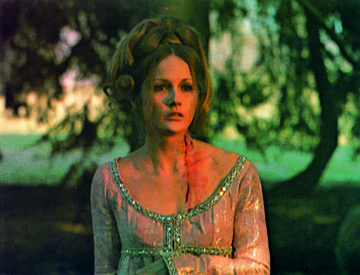
Nancy Barrett in "House of Dark Shadows (courtesy of MGM).
as a long lost “cousin from England” and went on to win the intense abiding fascination of viewers. The secret to the character’s success is not difficult to discern: The noted Canadian Shakespearian actor Jonathan Frid, a man more accustomed to playing Richard 3rd and Caliban than a vampire, invested the character with palpable inner conflict, sadness, and self-loathing. Here, for the first time ever, was the vampire as tragic hero, a man with a terrible problem that puts his irrational, destructive side into implacable conflict with his sense of moral order. Reluctant, ambivalent, and romantic vampires are thick on the ground in fiction these days; but here was the first overtly sympathetic portrayal of a vampire! Jonathan Frid’s portrayal of Barnabas Collins as a tragic, romantic figure made him an enduring icon of American popular culture, as instantly
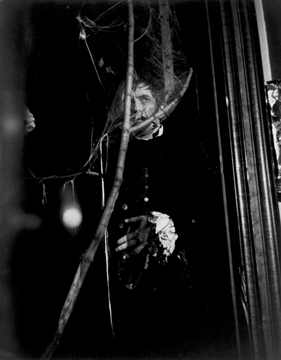
Jonathan Frid in "House of Dark Shadows (courtesy of MGM).
recognizable in the United States as fellow Canadian William Shatner’s inimitable portrayal of Captain James T. Kirk. The immense success of the television series prompted Curtis to make two motion pictures based on “Dark Shadows” for MGM. He made the first one, “House of Dark Shadows,” while the daily television series was still in full production, dividing the cast so some of them could concentrate on the motion picture while others carried the main brunt of responsibility for the television series. The first movie retells the story of the vampire’s arrival in the Collinwood of the 20th century. But because it tells a self-contained story, it leaves its key player in more villainous shades than those he gradually acquired on the television version. And, Curtis, who took on directorial responsibilities here, emphasizes violence and action far more than the television series did. Indeed, his star, Frid, never liked the film version’s indulgence in bloodshed and violence (both of which are very modest by today’s standards), holding that they did a disservice to the focus on intricate storytelling and character development that were hallmarks of the television version. But, “House of Dark Shadows” is a stylish, suspenseful drama that successfully blends elements of supernatural suspense, Gothic romance, and tragedy in engaging ways. It may add more ‘horror’ and violence to the mix
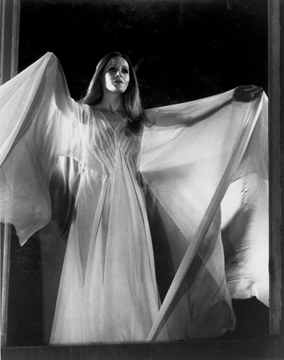
Nancy Barrett in "House of Dark Shadows (courtesy of MGM).
than the television version did, but it retains the High Romanticism that is at the heart of “Dark Shadows.” Its Barnabas Collins may be more villainous than the flawed hero his television self evolved into, but he retains the same preoccupations with lost love, sundered family, and shattered adherence to his own sense of right and wrong. The film benefits enormously from on-location shooting — much of it at the fabulous Gothic Revival-style mansion Lyndhurst, which towers above the high banks of the Hudson River in Tarrytown, New York, surrounded by its own forested estate. For a modest outlay of money, Curtis & Co. got access to a place that’s redolent with character, rich in elegance, and fully-stocked with its own antique furnishings. Curtis’s distinctive use of low camera angles is on display here; as is the work of his professionally inseparable musical composer, the Julliard-trained Robert Cobert, whose evocative themes — dramatic, melancholy, threatening, and delicate — always were the heart and soul of the “Dark Shadows” mythos. The cast, including the 1930’s and 40’s big screen siren, Joan Bennett and Academy Award nominee Grayson Hall (for “Night of the Iguana”), are entirely drawn from the television series, and they shine here — freed at last from the television series’ unfortunate use of “live-to-tape” recording, which precluded do-overs and sometimes yielded awkward results. Although “House of Dark Shadows” (and its less memorable 1971 sequel “Night of Dark Shadows”) were both released promptly on VHS and in the old laser-disc format), Warner Brothers (which acquired some of the MGM catalog of titles by way of Turner Entertainment) has waited an absurdly long time to release them (on October 30, 2012) on DVD and Blu-Ray. The veritable tsunami of DVD releases over the past dozen years somehow never included these two films. Why? Now that they’ve finally been released, it’s a crying shame that Warner opted for no-frill, bargain-basement releases. Despite a wealth of potential supplementary material, including lost footage from the second film (recovered by an avid fan) that would have restored it to its originally intended form, Warner offers no extras at all — no commentaries, no deleted scenes, no features on the cast, or on the late Dan Curtis, or on Cobert’s brilliant music, or on the franchise’s nearly half-century long existence and its avidly loyal fan following. Warner did not even use the original one-sheet art, logotype, or other promotional graphics from the films. Instead, it opted for drab, generic cover art which does no justice to the films. And in lieu of extras, all we get is each film’s trailer. Unsuspecting viewers of these DVDs would never imagine that “Dark Shadows” leapt from television to movies, then returned to television in 1991 with a new cast (Ben Cross, Jean Simmons, et al.) in a very sophisticated prime-time remake from Dan Curtis, and then tried for television a third time (in 2004) with still another cast, before crashing on the breakers of inane self-mockery, courtesy of Tim Burton and Johnny Depp’s dreadful 2012 parody on the big screen. “House of Dark Shadows” is not be missed by devotees of Gothic romance and romantic vampires. Everyone else will find good entertainment value here, too.
“The Devil’s Backbone” [“El Espinazo del Diablo”] (Spain/Mexico, 2001) (B+): “What is a ghost? A tragedy condemned to repeat itself time and again? An instant of pain perhaps? Something dead which still seems to be alive. An emotion suspended in time. Like a blurred photograph. Like an insect trapped in amber.” A ghost represents unfinished things, and that’s what this stylishly well-crafted film is all about. The setting is an old orphanage that sits like an isolated fortress in the midst of an arid plain. It’s 1939, and the Spanish Civil War is going badly for the Republican side. Their orphaned sons are cared for in the under-funded, under-staffed once-grand old hacienda in the desert. There is a faded elegance to the place, with its great hall of a dormitory and the tarps that cover unidentified contents in many of its rooms. Faded elegance is the term for the woman who runs the place, too. Bereft of her husband and her right leg (a prosthetic replacement gives her mobility), Carmen (Marisa Paredis) is refined and proper and still beautiful, despite the toll that time, stress, and disappointment have exacted. Her colleague, the gentlemanly Doctor Casares (very nicely played, with gentle humanity and a hint of quiet sadness, by Federico Luppi) loves Carmen; but he cannot give her the passion she craves. There is lovely poignancy to their inchoate love affair, a love that has spanned decades. There is a mysterious deep cistern of water in the basement beneath the kitchens; and there is a large unexploded bomb lodged in the earth of the central courtyard, a visceral, humming reminder of the war that rages just over the horizon. Into this strange place, a place that is seemingly set apart from the rest of the world, comes young Carlos (Fernando Tielve). Mere moments after his arrival, he encounters (and stands up to) the school’s bully Jaime (Inigo Garces) and he sees what he takes to be a ghost of a young boy. But writer/director Guillermo del Toro — the man behind 2006’s great “Pan’s Labyrinth” — is far too talented and original a filmmaker to settle for a conventional ghost story. This stylish, richly atmospheric film is really more of a character drama than a supernatural one; and the real monster of the piece is a living human being, a “lost one” whose own bitterness and anger at being “a prince without a kingdom… the one who was really alone,” find expression in coldness of heart and an inability to express any feeling save aggression. The result is as much about human conflict — arising from greed, fear, resentment, anger, and disappointment — as it is about the supernatural. The filmmakers challenge conventions in another way, too, by drenching their Gothic story in sunlight. Here, scary things move in broad daylight. Man’s inhumanity to man is a key part of the story, with echoes of the ruthless war that surrounds the school finding expression within its walls. But there is also something of hope, friendship, courage, and rough justice here, as young boys are obliged to cope with things for which their tender years have not prepared them. Watch for the director’s use of an incessantly moving camera and his fondness for doubling and duality in the way the story unfolds. The cast is very good, with Spain’s then teen heartthrob Eduardo Noriega cast decidedly against type, and Irene Visedo making an impression as the kind young woman, Conchita, who comes to see him as the psychopath he is. The film was nominated for Costume Design and Special Effects at Spain’s Goya Awards; and Stateside, it was nominated for a Saturn Award as Best Horror Film. For ages 18+: Some coarse language; brief sexual content; brief violence.
“Hugo” (USA, 2011) (B+/A-): A lonely young boy lives in the secret passages and catwalks of the Paris train station, tending to the station’s clocks. Bereft of his family, Hugo (Asa Butterfield) leads a sad and solitary life, unseen by others and always on guard against discovery by the martinet-like station inspector (Sacha Baron Cohen) who is relentlessly determined to apprehend and evict beggars and orphans from his zealously guarded turf. Hugo is fascinated by gears, coils, and levers — by what director Martin Scorsese calls “the machinery of creativity.” And he has inherited both his watchmaker father’s talent for fixing things and a broken automaton, that is, a robotic figure in the scaled-down form of a man. Hugo is obsessed with completing his father’s dream of making the automaton work again. But that mission brings him into contact and conflict with a bitter old toymaker played by Ben Kingsley. Can Hugo fix the living as successfully as he can fix inanimate objects? Can he find his own place in the world in the process? “Machines never come with any extra parts, you know. They always come with the exact amount they need. So I figured if the entire world was one big machine, I couldn’t be an extra part; I had to be here for some reason. And that means you have to be here for some reason, too.” Finding our purpose, what we are meant to do in this world, looms large in this story: “Maybe that’s why broken machines make me so sad. They can’t do what they’re meant to do. Maybe it’s the same with people. If you lose your purpose, it’s like you’re broken.” But, “Hugo” is also a celebration of the early, pioneering days of filmmaking, a time when we were less jaded and the powerful medium of film more often moved and astonished us, a time when it could more readily ‘show us our dreams in the middle of the day.’ Based on the book “The Invention of Hugo Cabret” by Brian Selznick, “Hugo” is a visually delightful recreation of Paris between the wars, conjuring a microcosm of the world inside the walls of a sprawling train station. Imaginative and poignant by turns, it is a story that embodies the words of one of its leading characters: “And now my friends… Come and dream with me.” Butterfield, Kingsley, and Cohen are supported by Chloe Grace Moretz (2010’s “Let Me In”), Ray Winstone, Emily Mortimer, Helen McCrory, Jude Law, Michael Stuhlberg, Frances de la Tour, Richard Griffiths, and the great Christopher Lee. The result is a modern variation on a Dickensian novel about an orphan’s search for home. The film earned a great multitude of nominations and awards. For example, it won five Academy Awards — as Best Art Direction, Cinematography, Sound Editing, Sound Mixing, and Visual Effects — and it was nominated in six additional categories — as Best Film, Director, Adapted Screenplay, Music (by Canadian composer Howard Shore), Editing, and Costume Design. It earned nine nominations at BAFTA, winning in two of those categories (as Best Sound and Production Design); and it won Best Director at the Golden Globes, where it was also nominated as Best Film and Music.
“The Ides of March” (USA, 2011) (A-): Is there room in politics for idealism, let alone integrity? Or is it a milieu inhabited only by jaded cynics, bald-faced liars, hypocrites, shameless manipulators, and self-serving egotists? Will politicians let us down every time? They are flawed human
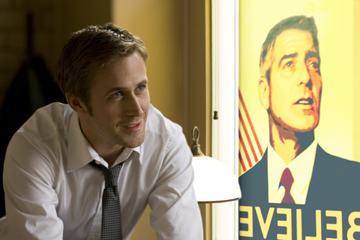
Ryan Gosling & George Clooney (in poster) in "The Ides of March" (courtesy of Alliance Films).
beings like the rest of us, of course; but can they rise above their flaws to be genuine examples for the rest of us to follow? In this strongly acted piece of political suspense, Canada’s Ryan Gosling plays a media expert employed by a politician who seems to be the real deal. George Clooney, who also directed and co-wrote this film, is a Democratic Governor seeking his party’s Presidential nomination. He has ideas, he has charisma, and he seems to be a real hope for substantive change. In the eyes of Gosling’s character, “He’s the only one that’s actually going to make a difference in peoples’ lives, even the people that hate him… I don’t give an eff if he can win. He has to win!” Gosling is a hard-boiled realist, but he has to believe in his candidate. Will corruption rear its ugly head, and if it does, will it leave anyone unscathed? Clooney has assembled a strong ensemble cast, with himself as the candidate, Gosling as his communications chief, Philip Seymour Hoffman as his campaign manager, Paul Giamatti as his opponent’s campaign chief, Evan Rachel Wood as an intern with whom Gosling gets involved, Marisa Tomei as a journalist who can be a “friend” one day, a foe the next, and Jeffrey Wright as a Senator whose delegates give him a lot of bargaining power. Jennifer Ehle and Gregory Itzin do very good work in small roles as the Governor’s wife and a grieving father, respectively. “The Ides of March” earned critical praise and numerous nominations and awards. It was nominated at the Academy Awards as Best Adapted Screenplay (Beau Willimon co-wrote the screenplay, adapting it from his play “Farragut North”); and it was nominated as Best Film, Director, Actor (Gosling), and Screenplay at the Golden Globes. The film is part political thriller, part character drama, and both components are working at a very high level. Its characters engage us, and its story raises a host of fascinating questions about loyalty, integrity, and just how far any of us is willing to go to get what we want: “This is the big leagues. It’s mean. When you make a mistake, you lose the right to play.” For ages 18+: Frequent coarse language.
“Y tu mama tambien” [“And Your Mother Too”] (Mexico, 2001) (A-): Two 17-year-old boys lead a hedonistic existence that’s given over to girls and sex and booze and dope. One of them (Tenoch, played by Diego  Luna) is very well off; the other (Julio, played by Gael Garcia Bernal) is from the lower middle class; but they are inseparable best friends. And, did I mention that they are very preoccupied with sex, not unlike 17-year-old boys everywhere. When their girlfriends go off to Italy for the summer, the boys lose no time in seeking out alternative female company. That’s when they meet Luisa (the lovely Maribel Verdu of “Pan’s Labyrinth”). She’s newly arrived from Spain, as the wife of Tenoch’s obnoxious older cousin. Luisa is older (28), self-assured, and drop-dead gorgeous. She is also not at all inclined to accept the verdict of a quiz in a woman’s magazine that she is “a woman who is afraid to accept her freedom.” With hormones (and wishful thinking) in overdrive, the boys impulsively ask Luisa to accompany them on a out-of-town trip to a fabled beach of their own imagining on the Oaxacan coast. It’s a two or three day drive away; but don’t ask the boys to be too specific: “Julio and Tenoch had clearly no idea where they were… nor how to get to a place that did not exist,” observes the narrator. But that doesn’t stop the trio from embarking on a road-trip that becomes a journey of self-discovery for each of them, marked along the way by outposts of desire, jealousy, sorrow, loss, and acceptance. There’s tension and conflict in store for them, but also healing — not to mention some very frank depictions of sexuality. At times, we wonder what this all-grown-up woman could possibly see in a pair of teens who are pretty immature, not to mention crude. But Luisa bears troubling burdens of her own and seeks the freedom of the open road and beckoning coast. The result is a coming of age story told through a road-trip and an unconventional psycho-sexual tangle of competing needs. Writer and director Alfonso Cuaron (2006’s “Children of Men”) allows his camera to pan across the photo-laden walls of his characters’ homes, quietly giving us glimpses into their lives and pasts. In one scene, the camera lingers in Luisa’s apartment after she has exited it; and we watch her get into the boys’ car from her open window a few floors above, as though we are a part of Luisa that she has left behind. There’s lots of local color on this journey: In one scene a very old man shuffles into a room to collect payment from the travelers for some drinks while an equally old woman cuts a rug in the next room. And dryly ironic interjections by an unseen narrator put things in a more expansive context: Right after we learn that Luisa lost her first love in a traffic accident in Europe, the narrator notes, in a few matter-of-fact words, that a fatal automobile accident occurred some years past on the very stretch of road the trio are traversing — and, as we hear those words, we see a roadside shrine of two crosses beyond the window as the car passes by. So, tragedy in one place is mirrored by tragedy in another. There are hints of social commentary peeking in at the story’s margins: Our more or less privileged travelers pay no heed to the sight we see of soldiers leaping out of a vehicle to interrogate some peasants traveling a pied; and later, the narrator tells us the fate of a herd of escaped pigs and that of a contented fisherman who is displaced by condos and relegated to janitorial work in the towers erected for the wealthy. And humor is never far from the surface. When Luisa asks a provocatively pointed sexual question, the car itself overheats (along with the boys) in seeming reaction, in its case by emitting an ejaculatory burst of steam . Coarse, crude, blatantly sexual, raunchy at times, “Y tu mama tambien” has lots of dry, ironic humor but also moments of poignancy and wisdom. And it is very, very authentic from beginning to end. The film earned numerous awards and nominations, including a Best Original Screenplay nomination at the Academy Awards, a Best Foreign Language Film nomination at the Golden Globes, the Best Foreign Language Film and Screenplay nominations at BAFTA, and a Golden Lion nomination at the Venice Film Festival; it won Best Foreign Film at the Independent Spirit Awards. No DVD extras. This film is part of a three-film “Festival Collection” boxed set from Alliance Films, along with two other films from Latin America — “City of God” and “The Motorcyle Diaries.” For ages 18+. Warning: Very strong sexual content and nudity; as well as frequent coarse language (in Spanish).
Luna) is very well off; the other (Julio, played by Gael Garcia Bernal) is from the lower middle class; but they are inseparable best friends. And, did I mention that they are very preoccupied with sex, not unlike 17-year-old boys everywhere. When their girlfriends go off to Italy for the summer, the boys lose no time in seeking out alternative female company. That’s when they meet Luisa (the lovely Maribel Verdu of “Pan’s Labyrinth”). She’s newly arrived from Spain, as the wife of Tenoch’s obnoxious older cousin. Luisa is older (28), self-assured, and drop-dead gorgeous. She is also not at all inclined to accept the verdict of a quiz in a woman’s magazine that she is “a woman who is afraid to accept her freedom.” With hormones (and wishful thinking) in overdrive, the boys impulsively ask Luisa to accompany them on a out-of-town trip to a fabled beach of their own imagining on the Oaxacan coast. It’s a two or three day drive away; but don’t ask the boys to be too specific: “Julio and Tenoch had clearly no idea where they were… nor how to get to a place that did not exist,” observes the narrator. But that doesn’t stop the trio from embarking on a road-trip that becomes a journey of self-discovery for each of them, marked along the way by outposts of desire, jealousy, sorrow, loss, and acceptance. There’s tension and conflict in store for them, but also healing — not to mention some very frank depictions of sexuality. At times, we wonder what this all-grown-up woman could possibly see in a pair of teens who are pretty immature, not to mention crude. But Luisa bears troubling burdens of her own and seeks the freedom of the open road and beckoning coast. The result is a coming of age story told through a road-trip and an unconventional psycho-sexual tangle of competing needs. Writer and director Alfonso Cuaron (2006’s “Children of Men”) allows his camera to pan across the photo-laden walls of his characters’ homes, quietly giving us glimpses into their lives and pasts. In one scene, the camera lingers in Luisa’s apartment after she has exited it; and we watch her get into the boys’ car from her open window a few floors above, as though we are a part of Luisa that she has left behind. There’s lots of local color on this journey: In one scene a very old man shuffles into a room to collect payment from the travelers for some drinks while an equally old woman cuts a rug in the next room. And dryly ironic interjections by an unseen narrator put things in a more expansive context: Right after we learn that Luisa lost her first love in a traffic accident in Europe, the narrator notes, in a few matter-of-fact words, that a fatal automobile accident occurred some years past on the very stretch of road the trio are traversing — and, as we hear those words, we see a roadside shrine of two crosses beyond the window as the car passes by. So, tragedy in one place is mirrored by tragedy in another. There are hints of social commentary peeking in at the story’s margins: Our more or less privileged travelers pay no heed to the sight we see of soldiers leaping out of a vehicle to interrogate some peasants traveling a pied; and later, the narrator tells us the fate of a herd of escaped pigs and that of a contented fisherman who is displaced by condos and relegated to janitorial work in the towers erected for the wealthy. And humor is never far from the surface. When Luisa asks a provocatively pointed sexual question, the car itself overheats (along with the boys) in seeming reaction, in its case by emitting an ejaculatory burst of steam . Coarse, crude, blatantly sexual, raunchy at times, “Y tu mama tambien” has lots of dry, ironic humor but also moments of poignancy and wisdom. And it is very, very authentic from beginning to end. The film earned numerous awards and nominations, including a Best Original Screenplay nomination at the Academy Awards, a Best Foreign Language Film nomination at the Golden Globes, the Best Foreign Language Film and Screenplay nominations at BAFTA, and a Golden Lion nomination at the Venice Film Festival; it won Best Foreign Film at the Independent Spirit Awards. No DVD extras. This film is part of a three-film “Festival Collection” boxed set from Alliance Films, along with two other films from Latin America — “City of God” and “The Motorcyle Diaries.” For ages 18+. Warning: Very strong sexual content and nudity; as well as frequent coarse language (in Spanish).
“City of God” [“Didade de Deus”] (Brazil, 2002) (B+/A-): Why did the chicken cross the road? Why, because it was fleeing for its life and limb, of course! And that’s exactly how this acclaimed drama from Brazil opens — with a frantic flight by a chicken from an urban gang of youths intent on killing and devouring it. It’s a piece of tour de force film-making that has to be seen to be believed. Who’d have thought that the frenzied pursuit of a flightless bird by a bloodthirsty mob would be so gripping? It is suspenseful, poignant, and darkly humorous all at once. And that makes it emblematic of the film as a whole. For here is the story of children and adolescents struggling to survive on the mean streets of Rio de Janeiro’s slums. In this dangerous, morally unhealthy setting, a life of crime seems to be the default option for many youngsters; and it is shocking to behold just how quickly they get immersed in the culture of violence that rules the streets. The hapless chicken at the film’s opening is an anthropomorphic chicken. More than that, it’s a metaphor for those youths who try to escape both the slum and the foreshortened lifespan it claims as its due: “A picture could change my life, but in the City of God, if you run away, they get you, and if you stay, they get you, too.” It is truly disturbing to see young kids armed to the teeth, let alone to see them kill in cold blood. But, the remarkable thing is that these characters are three-dimensional people. Many of them are thugs and killers, but even the worst among them is recognizably human, with some redeeming quality or other, like vulnerability or a bond of friendship. There is social commentary here: “But for the rich and powerful, our problems didn’t matter. We were too far removed from the picture-postcard image of Rio de Janeiro.” There is also a keen understanding of violent street culture: “To be a real hood you need more than just a gun. You need ideas.” There are very clearly delineated characters: “Benny was just too cool to go on being a hoodlum.” There are many instances of a sort of fatalistic doom that seems to preordain that those who try to evade the slum’s ruinous effects will be caught by it. And there are glimpses of hope too, especially in the central figure of “Rocket,” a boy who aspires to become a photojournalist. Based on a true story, “City of God” was directed by Fernando Meirelles, with co-director Katia Lund. It won both lavish critical acclaim and a multitude of nominations and awards, including four Academy Award nominations (for Best Director, Cinematography, Adapted Screenplay, and Editing). For ages 18+: Frequent coarse language (in Portuguese); violence; brief nudity; and brief sexual content. The film is part of a three-film “Festival Collection” boxed set from Alliance Films, along with two other films set in South and Central America — “Y Tu Mama Tambien” and “The Motorcyle Diaries.”
“Seven Minutes in Heaven” [“Sheva dakot be gan eden“] (Israel, 2008) (B): Sometimes existing can feel like a burden; a curse even, rather than the blessing it should be. That’s certainly how it feels to Galia. She has
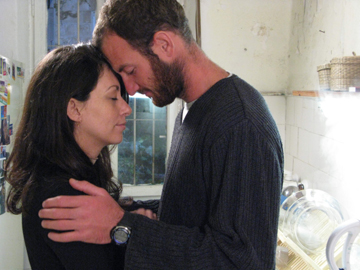
Reymond Amsalem & Eldad Fribas in "Seven Minutes in Heaven" (courtesy of Film Movement).
narrowly survived a suicide bombing on a public bus; but she bears even more psychological scars than she does physical ones: “My back looks like I burnt it on a barbeque; my boyfriend was on life support; and the doctor thinks it’s a miracle.” The trauma has shattered Galia’s psyche, afflicting her with visions of those who lost their lives on the bus, as well as gaps in her memory and survivor’s guilt. She’s also left with a growing compulsion to find the anonymous stranger who pulled her from the burning wreckage and brought her back from the brink of eternity. But she is embittered, cynical, and numb about the workings of man and destiny that have left her alive but damaged 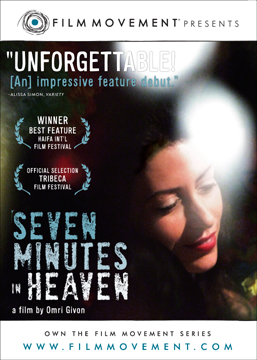 and bereft: “I was already half-dead [but] it seems someone decided I didn’t deserve to go.” Very gently paced and melancholy in tone, the story takes an intriguing, wholly unexpected turn late in the film — a change in course that propels it into fascinating territory. Galia is very nicely played by Reymonde Amsellen, who brings a subtly haunted and restless quality to the role. (Amsellen had a role in 2009’s “Lebanon,” as a despairing Lebanese woman.) Written and directed by Omri Givon (it’s his directorial debut), “Seven Minutes in Heaven” depicts one woman’s struggle with questions which may not have answers. The film won festival awards in Haifa, Warsaw, and Bratislava (Slovakia); and it was nominated for Best Actress by the Israeli Film Academy. For ages 18+: Brief coarse language.
and bereft: “I was already half-dead [but] it seems someone decided I didn’t deserve to go.” Very gently paced and melancholy in tone, the story takes an intriguing, wholly unexpected turn late in the film — a change in course that propels it into fascinating territory. Galia is very nicely played by Reymonde Amsellen, who brings a subtly haunted and restless quality to the role. (Amsellen had a role in 2009’s “Lebanon,” as a despairing Lebanese woman.) Written and directed by Omri Givon (it’s his directorial debut), “Seven Minutes in Heaven” depicts one woman’s struggle with questions which may not have answers. The film won festival awards in Haifa, Warsaw, and Bratislava (Slovakia); and it was nominated for Best Actress by the Israeli Film Academy. For ages 18+: Brief coarse language.
The DVD’s accompanying short film is “Grandmothers” [“Avos”] (Brazil, 2009) (B-): Ten-year old Leo is not impressed by the socks and underwear he receives from his two grandmothers as gifts on his tenth birthday. Both women exclaim that, ‘You can’t have too many,’ and they adhere to the same principle when it comes to feeding their grandson. Luckily, Leo’s grandfather presents him with a rather more intriguing gift, in the form of an old Super-8 movie camera. Leo proceeds to film the preparation of the ubiquitous food, the quarrel between his elders about the Bill Clinton/Monica Lewinsky scandal, and the numbers tattooed on his grandparents’ arms. What it all ultimately signifies will be in the eye of the beholder; but director Michael Wahrmann’s 12-minute short film has an authentic feel that seems very nearly like a documentary.
“Foreign Letters” (USA, 2012) (B): Family moves can be tough on kids under the best of circumstances; but international moves can bring with 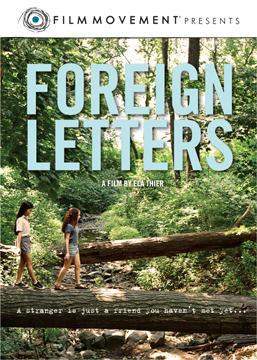 them not just a new neighborhood and a new school but also a new language and an unfamiliar culture. When 12-year old Ellie’s family moves to Connecticut from Israel in 1982, she clings to contact with the bosom friend she left behind (“my best friend in the entire universe times infinity”). Struggling with English, she is isolated in school; but her status as an outsider makes her a keenly perceptive observer of her new society’s peculiarities — traditions like bringing a tree indoors once a year and cutting Asia in half on maps in order to present America as the center of the world. But then Ellie notices another girl on the fringes, a refugee from Vietnam named Thuy who wraps herself in her studies like armor, getting an early start (from the vantage-point of Grade Six!) on preparing for the SAT exams! Slowly, tentatively, Ellie tries to break through Thuy’s reserve in order to make a connection with this other lonely girl. The result is a very simple story, simply told, with naturalistic performances. Noa Rotstein is the more precocious of the pair as Ellie; but Dalena Thuy-Anh Le is believable (if a tad stiffer) as Thuy. Writer/director Ela Thier (who also appears in the film as Ellie’s mother) essays autobiographical material here:
them not just a new neighborhood and a new school but also a new language and an unfamiliar culture. When 12-year old Ellie’s family moves to Connecticut from Israel in 1982, she clings to contact with the bosom friend she left behind (“my best friend in the entire universe times infinity”). Struggling with English, she is isolated in school; but her status as an outsider makes her a keenly perceptive observer of her new society’s peculiarities — traditions like bringing a tree indoors once a year and cutting Asia in half on maps in order to present America as the center of the world. But then Ellie notices another girl on the fringes, a refugee from Vietnam named Thuy who wraps herself in her studies like armor, getting an early start (from the vantage-point of Grade Six!) on preparing for the SAT exams! Slowly, tentatively, Ellie tries to break through Thuy’s reserve in order to make a connection with this other lonely girl. The result is a very simple story, simply told, with naturalistic performances. Noa Rotstein is the more precocious of the pair as Ellie; but Dalena Thuy-Anh Le is believable (if a tad stiffer) as Thuy. Writer/director Ela Thier (who also appears in the film as Ellie’s mother) essays autobiographical material here:

Noa Rotstein & Dalena Thuy-Anh Lee in "Foreign Letters" (courtesy of Film Movement).
The story is based on her own actual experiences, experiences which also provided the basis for her acclaimed 2009 short film, “A Summer Rain.” Although it is an American film, it feels like a foreign film. A good part of the dialogue is in Hebrew, and the viewpoint is very much one of immigrants. The low-key, gentle result is a picture of childhood innocence and naivete, though it is not insensible to the possibility of childhood cruelty, either. It does a remarkable job of capturing the voices of ‘tweens in a thoroughly authentic fashion. DVD extras include the short film “A Summer Rain” (reviewed directly below), a five-and-a-half minute interview with the real-life friends portrayed in the film (director Ela Thier and Van Khang), two deleted scenes (involving childhood puzzlement over tampons and a short-lived vacuum cleaner), biographical notes, and a trailer.
“A Summer Rain” (USA, 2009) (B+/A-): Writer/director Ela Thier first brought her autobiographical account of being a childhood stranger in a strange land to the screen in this acclaimed 17-minute short film. Like her later feature-length return to the same subject matter (2012’s “Foreign Letters”), its central protagonist is her own twelve-year old self, very adeptly portrayed by Noa Rotstein. Ellie has an enduring friendship with a girl back in Israel, and she forms a new one with the Vietnamese girl next door (played by Dalena Thuy-Anh Le) in her new home in the Eastern United States. The later feature film is good; but the short film is even better, telling the same story through different experiences and different dialogue. It has a great line, “English is… such a hard language that even Americans can’t speak it very well.” Compact, concise, and without an extraneous moment, the short film surpasses its later feature film cousin as a delightful ode to friendships and crossing the cultural gaps that too often divide us.
“Meet John Doe” (USA, 1941) (A+): Not the best known film directed by Frank Capra and written by Robert Riskin, this classic film is certainly one of their greatest. At its heart is Long-John Willoughby, a harmonica playing, down-on-his-luck bush league baseball pitcher perfectly embodied by Gary Cooper. He is fashioned, by a wily newspaper reporter played by Barbara Stanwyck, into a mystery man who vows to kill himself to protest the sorry state of the world by jumping off city hall on Christmas Eve. What starts as a gimmick to sell newspapers becomes a movement founded on decency and goodwill that gives hope to hundreds of thousands of ordinary people across the country — and softens even Stanwyck’s brassy, no nonsense heart. Trouble is there’s a ruthless manipulator (Edward Arnold) paying the bills — a tycoon who uses the public’s hunger for principled idealism to cynically advance his own hidden political agenda — one that smacks of fascism all decked-out in red, white, and blue. The story has poignancy, humor, romance, high drama, whimsy, and social commentary, and it’s a political cautionary tale to boot! It epitomizes Capraesque themes about the essential goodness of the common man, and his capacity to prevail over the brute force, ill-gotten gains, philistinism, and the shameless attempts of ‘the powers that be’ to shape the world to suit their own selfish ends. The cast — which also includes Walter Brennan, Spring Byington, and James Gleason — is note-perfect. Cooper nails his role as a shy, gentle, honest man who becomes a hero through sheer humble decency: “I’ve been lonely and hungry for something practically all my life.” With its winning cast, and a story that’s not afraid to celebrate idealism, it’s one of the best films ever made: “We’re a family apart, the John Does. We’re the meek who are supposed to inherit the earth. You’ll find us everywhere: We raise the crops; we dig the mines, work the factories, keep the books, fly the planes, and drive the buses. And when the cop yells ‘Stand back there you,’ he means us — the John Does… In our struggle for freedom, we’ve hit the canvas many a time, but we always bounce back, because we’re the people, and we’re tough… A free people can beat the world at anything – from war to tiddlywinks — if we all pull in the same direction.” “Meet John Doe” was nominated for an Academy Award for Best Writing — Original Story, for the story by Richard Connell and Robert Presnell Sr. that formed the basis of Riskin’s screenplay. The two-disc 70th anniversary release from VCI Entertainment offers a digital restoration of the film, a commentary that incorporates some archival remarks by Capra himself, three featurettes, and more. All that’s missing is the full 132-minute version of the movie. This print, like most surviving prints is the shorter 123-minute version.
“A Separation” [“Jodaeiye Nader az Simin”] (Iran, 2011) (B/B+): Sometimes ‘nothing’ becomes ‘something;’ sometimes the simplest disagreements or misunderstandings can take on life-altering dimensions. That’s exactly what happens among and between two families in Tehran. When we first meet Nader (Peyman Moadi) and Simin (Leila Hatami), it’s in divorce court. She wants a divorce because she wants to emigrate, and he feels compelled to stay put to care for his ailing father. And she needs his consent to take their daughter, Temeh (Sarina Farhadi) out of the county. Since that consent is not forthcoming (both parents love their daughter very much), Simin gives up her dream of leaving Iran and instead moves out of the marital home. In a cause-and-effect manner that pervades the story, Simin’s departure obliges Nader to find a caregiver for his father (Ali-Asghar Shabazi), who has Alzheimer’s and cannot be left unattended while Nader is at work. But the new caregiver, a religiously observant woman named Razieh (Sareh Bayat), has troubles of her own, with an unemployed, indebted husband (Shahab Hosseini), a precocious young daughter (Kimia Hosseini), and another child on the way. One family is middle-class, well educated, and Westernized; the other is poor and of a more traditional bent. Both families are made up of decent people. But both families are beset by internal stresses, and each of these nuclear families come into conflict with the other — through a combination of bad luck, misperceptions, a stubborn belief that they’re in the right, and lies of (perceived) necessity. Once the cycle of conflict begins — whether it is within a family or between two competing families — that conflict can take on a life of its own, escalating of out control, and propelling all involved into a spiraling descent to ever greater misfortune and unhappiness. (Come to think of it, that goes for nations as much as for individuals.) Produced, written, and directed by Asghar Farhadi, “A Separation” is a low-key, unpretentious window into the lives of its characters. They may live in a place few of us have seen first-hand, a place that has acquired mostly negative associations in recent years, thanks to the excesses of its wayward clerical-controlled regime. But, this is a film about real, down-to-earth people, not politicians or clerics, not fundamentalists or radicals. It turns out the film’s characters are very much like us: They love their children, they struggle to keep their marriages together, they are sometimes torn between conflicting loyalties, and their first inclination is to do the right thing. But each of the film’s characters is faced with difficult dilemmas. Does one choose a loved one over the truth, for instance? “A Separation” is a story about the stresses and strains of human conflict; and it’s a story built around paradox. This critically acclaimed film earned many, many nominations and awards, among them: Best Foreign Language Film at the Oscars, Golden Globes, Independent Spirit Awards, National Board of Review, the Cesar Awards (France), and the David di Donatello Awards (Italy), to name just a few. It won Best Film, Actor, and Actress at the Berlin Film Festival; and it was nominated as Best Original Screenplay at the Academy Awards. The DVD extras include a very informative commentary and two interviews with the writer/director.
“The Hunger Games” (USA, 2012) (B-/B): In the near future, an oppressive oligarchy of the very rich ruthlessly oppresses what we haven taken to calling (in the real world of the here-and-now) the ninety-nine
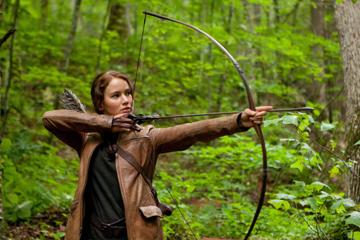
Jennifer Lawrence in "The Hunger Games" (courtesy of Alliance Films).
percent. Hedonistic, dissolute, rather effete, and largely devoid of empathy for others, these self-appointed overlords rule “Panem,” a kind of feudal state seemingly build on the remains of a collapsed United States. And they periodically exact a terrible tribute from the citizens of the outlying districts: Each of those districts must send a boy and a girl, chosen by lottery, between the ages of 14 and 18, to fight to the death. Only one of the 24 forced-contestants will remain alive at the end of each of these annual blood-sport spectacles. And spectacle is the word for it, with the hapless youngsters forced to compete for sponsors and ratings, even as their fates are the grist for wagering among the rich and powerful who inhabit the capital city. The object of the exercise seemed to be to punish the underclass for past rebellion and to control them through a noxious blend of fear and faint hope. The state manipulates both to maintain its absolute control: Thus, each of the “games” has a single winner — to offer a slender, state-sanctioned “hope” to the same oppressed masses which the state is bent on intimidating. “The Hunger Games” is adapted from the first book in Suzanne Collins’ trilogy written for young adult readers. Cinematic adaptations of the two remaining books are to follow — in the form

Jennifer Lawrence in "The Hunger Games" (courtesy of Alliance Films).
of three additional films — over the next three years. The central premise of the first book — forcing teenagers to kill each other in contrived gladiatorial games — is an extraordinarily ugly one. The film tactfully has most of the killing occur off-screen or at a distance, thankfully sparing us the actual nitty-gritty unpleasantness of violent death in which the rich oligarchs of Panem revel. Some commentators have accused the filmmakers of thereby watering-down the violence; but any other course of action would have yielded results too distasteful to watch — doubly so when many of those watching this film are themselves of tender years. The great strength of the film lies in casting Jennifer Lawrence as its protagonist, the young Katniss Everdeen. Lawrence deservedly garnered critical acclaim (and Best Actress nominations at both the Oscars and the Golden Globes) for her lead performance in 2010’s gritty “Winter’s Bone;” and she brings similar gravitas to this role. Her strong will, courage, ingenuity, and aptitude with a bow and arrows make her a strong female role model; her unshakeable integrity and grim resolve make her an admirable heroine for both genders and all ages. But the sheer realism of Katniss the character and Lawrence the actor seem to collide head-on with the deliberately over-the-job depiction of the decadence of the rich elite. Katniss comes from a place of great poverty and deprivation. But the city of the rich to which she is forcibly taken is given over to every manner of excess — from flamboyant forms of attire, to a fondness for televised spectacle (the eponymous “Hunger Games” constitute the ultimate low in so-called reality television), to the perversion of technical wizardry to serve empty showmanship and malign surveillance instead of real human needs, to all the oversized hype, rhinestone glamour, and crocodile tears that prevail in the capital: (A) “I can sell ‘the star-crossed lovers from District 12’”, says Woody Harrelson, with a PR-man’s gleam in his eye. (B) “[But] we’re not star-crossed lovers!” objects Katniss. (A) “It’s a television show!” The film’s intention, obviously, is to burst the bubble of our own, real-life society, with all its preoccupation with instant celebrities, breathlessly inane coverage of every trivial detail of the personal or professional lives of actors, athletes, politicians, and those who do something unusual or outrageous enough to attract the fleeting attention of a bored public. We live in a society, alas, in which the lowest common denominator (in matters of taste and conscience) rules with an iron fist, a society in which we listen in rapt attention to boors, to loud, ignorant voices who utter tripe with all of solemnity of profundity. Through our co-conspirators in the popular media, we raise celebrities and we bring them low; and we insist that they emote on cue. We tell ourselves we have democracy, even as we shrug-off the culture of deceit, manipulation, short-sightedness, and willful blindness that long ago poisoned our freedom and left us as unwitting, self-satisfied serfs to powers and processes we neither comprehend nor control. That’s the world we live in, sad to say. It’s also the world this film aims to satirize, by exaggerating the way things already are in the here-and-now. The trouble is that the modality for depicting that larger-than-life version of our own world indulges over-much in the bombastic, cartoonish (get a load of the pink eye-liner, Marie Antoinette hairdo, Kabuki whiteface, and stylized lipstick on an unrecognizable Elizabeth Banks’ Effie!), and the garish (the forced contestants, a.k.a. “tributes,” are shown-off driving chariots like Roman gladiators, except that our heroine and her comrade are sporting fiery virtual capes made of photons). The crowd in the film is impressed; so, too, may many real-world viewers of the film; but, it’s over-the-top instead of subtle, and it feels at odds with the serious, realistic depiction of Katniss. The same goes for the game-controllers’ manipulation of the forest setting of the game itself. It’s not just wired for sight and sound. With the push of a button, its controllers can cause trees to crash to the ground, spontaneously ignite raging forest fires and make them disappear moments later, and conjure a pack of ravaging wolf-life carnivores. These contrivances are solid and tangible (they have the power to pursue and kill), so, they can’t be holograms. Or is this some sort of Star Trekian “Holodeck” with the safety protocols disabled? It doesn’t make much sense, and it is much less involving as a drama than it would be without all the intrusive special effects. By too closely mimicking the same hollow artifice and flashy superficiality it seeks to skewer, “The Hunger Games” needlessly forfeits a good deal of its dramatic weight and seriousness of tone. Still, it’s well worth seeing for Lawrence: She makes the movie! The two-disc DVD offers several extras: Most of them are a bit too brief, a bit too bombastic, and a bit too self-congratulatory. It’s odd that the author of the novels makes no appearance at all in the 14-minute bit devoted to her books. Another featurette has Canada’s Donald Sutherland (who plays the series’ ruthless President Snow) compare Katniss to Joan of Arc and talk about “the decaying fabric of empire… of the privilege” like any good Canadian would. Others draw analogies to the Greek story of Theseus and other youths consigned as tributes to the Labyrinth of Crete (whence dwelth the fearsome Minotaur), and note the book’s origins in the bitterly divisive years of Bush the Younger. One featurette does run to greater length, as it canvasses casting, design, locations, and much else. Not recommended for young children.
“The Aristocats” (USA, 1970) (B+): In 1910 Paris, an elegant lady instructs her ancient lawyer to prepare a will: Her entire estate will go to her beloved cats, “Duchess” and her three kittens, for their lifetime. Thereafter, it will pass on to her loyal butler and help-meet, Edgar. But, Edgar (who has obviously taken the old canard that ‘the butler did it’) to heart) has other ideas (“Those cats have got to go!”), and he puts them into action by dumping the felines in the countryside far from the city. Duchess (very nicely voiced by Eva Gabor) is every inch the lady of refinement and gentility, calmly cajoling her rambunctious kittens to stop rough-housing and resume their piano and oil painting lessons. And she’s a disarmingly feminine feline: What discerning tomcat could possibly resist her charms: Certainly not O’Malley (Phil Harris), the singing ally cat who is pressed into service as the gentrified cats’ guide and protector. They meet a pair of English geese, hang with a trumpet-blowing Scatcat and his feline jazz band, and combine forces with a mouse and a horse to defeat the scheming butler. Disney’s animated film looks lovely in both its town and country sequences; but its greatest asset is its charming characters. They’re irresistible — for romantics of all ages. The Blu-ray/DVD combo pack has a cute bonus short called “Bath Day,” involving a wash-time adverse kitten named Figaro. Better still, there’s a deleted song from the main feature (which was originally intended to be used twice in the movie), which is presented here with its original audio and storyboards: Introduced by one of the film’s two songwriters, that eight-minute sequence is a welcome extra.
“The Rescuers” (USA, 1977) (B+): Wisdom can fail us sometimes. A wise old cat, Rufus, gives good counsel to a sad little orphan girl, Penny, when he tells her, “Faith is a bluebird you see from afar… You can’t touch it, or buy it, or wrap it up tight, but it’s here just the same, making things turn out right.” But the same good-hearted cat errs when he forgets his faith in talking to the film’s protagonists: “Two little mice. What can you do?” What can they do? Why, when they are Miss Bianca (Eva Gabor) and Bernard (Bob Newhart), the possibilities are endless. A little lady of beauty, charm, and savoir faire, Bianca sets male hearts to swoon, and she baulks at nothing. Bernard is made of humbler stuff, but he rises to the occasion out of admiration and growing love for his “co-agent.” The pair is dispatched by the ‘International Rescue Society’ — which is housed in the mice-only section of New York’s U.N. headquarters building — to find and rescue the little girl whose plea for help has washed ashore in a bottle. It seems she has been abducted from an orphanage and taken to the bayous of the Deep South by villains who need a small child to enter a place that’s too small for them and search for a giant diamond. Getting there means flying, and that’s where ‘Air Albatross’ comes in. Its sole pilot (who is his own aircraft), Orville, is named after one of the famed Wright Brothers and nicely voiced by Jim Jordan. Another highlight comes in the form of Evinrude, a little dragonfly who propels a bayou boat (a leaf is the boat; he’s the engine). Evinrude doesn’t speak, but he’s a scene-stealer. The chief villain, meanwhile, is human: Madame Medusa (Geraldine Page) is an overly broad broad, in the tradition of Cruella Deville and the witch from “The Little Mermaid,” complete with a pair of crocodilian henchmen. Based on a book by Margery Sharp, the film opens with an unexpectedly melancholy tableau of swamp, derelict paddlewheel boat, and forlorn child. But the mood turns to optimism and adventure when our diminutive, but admirably brave and resourceful, mice come to the rescue. This cute Disney animated feature is available in a Blu-ray/DVD combo pack with its 1990 sequel (reviewed below).
“The Rescuers Down Under” (USA, 1990) (B+): Unlike most sequels to Disney animated features, this one started life as a theatrical film, and it upholds the quality of the original as a consequence. This film’s opening sequence is markedly different in style from the original. It starts with a close-up view of life on a leaf (with several types of insects), and then races across the Australian Outback, past looming red rocks and right into the window of a small solitary house. A little boy lives there with his mother. Cody (Adam Ryen) is a nature-child, and he’s friends with all the animals he meets. When he rescues a golden eagle from a man-made trap, his latest friendship runs him afoul of a ruthless poacher named McLeach (memorably voiced by the late great George C. Scott), a cruel man who holds nothing sacred. Cody is abducted by the villain as a way to get at the coveted golden eagle. But word reaches far off New York (in a truly inventive sequence of island-hopping re-transmission by mice!) and Miss Bianca and Bernard are back on the case. Eva Gabor and Bob Newhart recreate their roles from 1977’s “The Rescuers,” in a story that adds a romantic rival for Miss Bianca’s attentions (to unsettle the shyly unconfident underdog Bernard) in the form of a kangaroo-mouse in safari-garb named Jake (Tristan Rogers). Jake is a mouse’s mouse, a sort of Crocodile Dundee of the mouse world who has all the confidence, charisma, and bold derring-do that Bernard lacks. Will Bernard get the nerve (or the chance) to ‘pop the question’ to his beloved Bianca? Romance has to wait till they deal with a life and death struggle against the bad guy (who boasts, “I didn’t make it all the way through third grade for nothing!”). Transportation down under is provided this time by Wilbur (voiced by Canada’s late John Candy), brother-albatross to the Orville of the first film. He’s got a larger role than his sibling, and he gets one of the best laughs: (Q) “Is this a non-stop flight?” (A) No, we’re definitely going to make connections with a bigger bird. Non-stop! What do I look like? Charles Lindbergh?” The result is good fun for all ages. A ten-minute making-of featurette describes the filmmakers’ approach in creating big bold vistas in which to frame the epic adventure story they wanted to tell.
“Pocahontas” (USA, 1995) (A): One of the great Disney musicals, this film is a modern classic and a near-masterpiece, with a pleasingly serious tone and honest-to-goodness gravitas! In a prologue set in 1607 London, a ship readies to embark for the New World. On board is Captain John Smith (Mel Gibson), a brave and heroic leader of men, and his moral-opposite, Governor Radcliffe (David Ogden Stiers), who knows how to give a good speech but is really only interested in one thing — gold. Then, the opening credits take us to an idyllic North America (Virginia, to be precise) where the indigenous natives live in harmony with the natural world, fishing and harvesting corn. That’s where we find the eponymous Pocahontas (voiced by Irene Bedard, with wonderful singing by the ever-so-talented Judy Kuhn). She is the chief’s daughter, and she’s a free, independent-minded spirit: “She has her mother’s spirit; she goes wherever the wind takes her.” Her constant companions are a mischievous raccoon, Meeko, and an often indignant hummingbird, Flit, and they provide just the right note of comic relief, nicely avoiding the pratfalls of overly broad and raucous silliness that so many sidekicks in Disney animated films stray into. Pocahontas’ father wants her to marry his bravest warrior; but Pocahontas believes that her dreams are leading her in another, yet to be revealed direction. Her song, “Just Around the Riverbend” is a rousing anthem to her adventurous, questing spirit: “Shall I choose the steady course… Is all my dreaming at an end? Or do you still wait for me, dream-giver, just around the river-bend?” And that rousing song plays out in a sylvan paradise of majestic tress and waters that are alternately calm and bursting with energy. Pocahontas consults with Grandmother Willow (Linda Hunt), the wise living spirit of an old tree, who counsels her to “listen with your heart;” in scenes that are poignant and dignified. And dignity infuses the film’s portrayal of the New World’s native people, people who are shown to have as much claim to being cultured and civilized as the arrogant newcomers who come to their shores with an expectation to dominate whoever and whatever they encounter. Pocahontas encounters John Smith, whom she grows to love. Her gentleness and dignified ways transform his preconceptions about the Indians; but armed conflict between the Europeans and native people looms. In some biting social commentary, the Governor belligerently sings of “savages” and urges his men to “sound the drums of war… They’re not like you and me, which means they must be evil.” And a parallel sentiment has taken hold in the native camp. Will the love and self-sacrifice of this New World’s Romeo and Juliet restore harmony? And, just as importantly, will viewers take heed of the movie’s messages about violence (“a man’s not a man unless he knows how to shoot”), exploitation (“we’ll show you people how to use this land properly, how to make the most of it”), and cultural diversity (will we rejoice in it or hold, as most men do, that ‘uncivilized’ means ‘not like us’). The powerfully emotional song “Colors of the Wind” makes all those points (and more): “You think you own whatever land you land on. The earth is just a dead thing you can claim. But I know every rock and tree and culture has a life, has a spirit, has a name. You think the only people who are people are the people who walk and think like you. But if you walk the footsteps of a stranger, you’ll learn things you never knew you never knew.” The result is as great a set-piece as any song from any Broadway musical! It won composer Alan Mencken and lyricist Stephen Schwarz an Academy Award, and they won another one for Best Original Score. “Pocahontas” is a must-see, must-own film — full of achingly glorious music and lyrics, wonderful natural beauty, and strong characterization. Most of the extras are on Blu-ray only, but the DVD does have an interesting seven-minute featurette about the music. And the Blu-ray/DVD combo pack also includes the 1998 direct-to-video sequel, which is reviewed below.
“Pocahontas II: Journey to a New World (USA, 1998) (C/C+): Disney’s direct-to-video sequel to its great 1995 motion picture is a pale imitation of the original. One wants to see these characters again, but it’s a shame they are so diminished here. The sequel takes its strong-willed heroine to the British royal court to intercede for her people. The script, the visuals, the animation, and the music are all mediocre — the stuff of an above-average television cartoon. The storytelling and characterization is broader; the look of the film is flatter. Even scenes in the previously idyllic-looking Virginia are over-stark, with winter snow providing a convenient excuse for too much blank space in the landscape. The comic relief trio of raccoon, hummingbird, and boxer-dog are over-done this time round. So, too, is the prancing and preening of the villainous Governor; and his big song and dance number at court strikes all the wrong, over-the-top notes. Pocahontas’ over-sized (and mute) native bodyguard is the stuff of caricature, which undoes some of the dignified portrayal of natives in the first film. The story even has Pocahontas in what amounts to ‘white-face’ at one point, a ploy which may send the wrong signals to viewers. Some of the same voice cast returns, though Mel Gibson’s younger brother Donal takes over as John Smith in a much smaller role. Singer Judy Kuhn is back, but there’s a new music and lyrics team this time, and it’s definitely the B-team. The whole story has been dumbed-down a few notches; in the process, it has been drained of nearly all of its visual and emotional impact. And it’s a real downer to see the great love story of the original punctured here (in revisionistic fashion) by a rival for Pocahontas’ heart, in the form of a young British nobleman, John Rolfe (voiced by Billy Zane).
“Chimpanzee” (USA, 2012) (B/B+): Disney’s nature documentary finds “a world full of drama, sadness, and joy” among a small group of chimpanzees in an African rainforest. It shamelessly anthropomorphizes the apes, ascribing to them personalities, motivations, and emotions of a sort once reserved for human beings. That approach certainly permeates the narration by actor Tim Allen: Whether his storytelling style and emphatic delivery will put off those looking for straight-up documentaries will vary according to individual tastes. Either way, it’s a pretty common device these days, extending even to weekly installments of a television program about the life of meerkats (mammals in the mongoose family). A jazzy song used early in the film feels out of place and distracting; but its return late in the film does not. Maybe in the meantime, we’ve bought into the human-like aspects of these intelligent animals? There’s no doubt about their intelligence. They use rocks and logs as tools to crack open nuts. And they collaborate to methodically hunt their prey. Who knew that chimpanzees hunt and eat smaller monkeys? This reviewer is not so sure he wanted to know. After all, that reminder of the brutish side of the animal kingdom breaks the spell this film casts by portraying its dramatis personae as a human-like family. Trouble is: What makes the neighboring chimpanzee family the bad-guys? True, they are moving in on our protagonists’ territory, but that aggression is prompted (much like its human counterpart can be) by dwindling resources on their own side of the border. The focus here is on a juvenile chimp, Oscar. He loses his mother at an age when he is still utterly dependant on her for survival. To the evident surprise of the filmmakers, Oscar is eventually adopted by his group’s alpha-male, Freddie. The film has some beautiful photography, like slow motion raindrops striking stalks of fungi which emit bursts of dust-like spoors. And there’s gorgeous time-lapse photography, like a spider spinning its web in concentric circles and vines sending their tendrils upwards and outwards. Over the end credits, the noted researcher and advocate of chimpanzees, Jane Goodall, endorses the sentiment of this entertaining film, namely, that “We’re not the only beings with personalities and minds capable of thought.” Part of the theatrical receipts and Blu-ray/DVD sales proceeds of the film are apparently going to conversation efforts to protect these animals, animals whose habitat is in grave danger. The primary extra, a “making-of” featurette appears only on the Blu-ray disc.
“The Debt” (USA/U.K./Hungary, 2010) (C+/B-): A remake of the 2007 Israeli film “The Debt” [“Ha-Hov”] about three Israeli Mossad agents who are dispatched to Communist East Germany in 1966 to apprehend a Nazi war
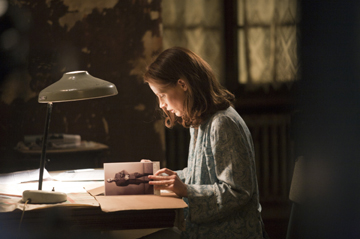
Jessica Chastain in "The Debt" (courtesy of Alliance Films).
criminal known as “the Butcher of Birkenau.” Early in the film, we are shown one version of how that mission is supposed to have ended; but, 31 years later, in 1997, we gradually discover that there is more to the story than we first thought. There’s unfinished business involved, along with a quest for closure by characters who are no longer exactly in their prime for secret agent work. The 1966 portion of the film is most involving: Three agents — played by Jessica Chastain (of “The Tree of Life”), Sam Worthington (of “Avatar”), and New Zealand’s Marton Csokas — of disparate character are thrown together in a stressful situation, and circumstances oblige them to keep close quarters with their captive, a suavely evil man who knows how to uncover and exploit their psychological weaknesses. The villain, an erstwhile Nazi doctor named Vogel, now makes his living as a gynaecologist; and he is as convincing as a gentle, mild-mannered caregiver as he is spitting venom, thanks to standout work by the Danish actor Jesper Christensen. And, while we’re on the subject, there’s a startling scene while Chastain’s Rachel is on the examination table in which she ‘takes back the stirrups’ (if not the night) for women everywhere who have to endure the indignity of an intimate medical examination. Different actors play the three protagonists later in life, with the stellar trio of Helen Mirren, Ciaran Hinds, and Tom Wilkinson taking over from the actors noted earlier. But, through no fault of these fine players, the story of past ghosts coming back to haunt aging survivors is never as engaging as the earlier spy thriller. For one thing, it lacks both the pressure-cooker situation and the unhappy love triangle stresses and strains that fueled the earlier part of the story. A couple of credibility problems impede both sections of the film: In the 1966 section, both male agents too-conveniently leave Rachel alone with their dangerous prisoner. And he’s remarkably fit (and in surprisingly good fighting trim) for an older man who’s been tied up for days or weeks. And, 31 years later, Rachel spy skills seem all too fresh for someone who has been out of the business for as long as three decades. Jessica Chastain got numerous nominations at festivals and from critics’ associations for her performance. She and the always worth-watching Ciaran Hinds really deliver the goods here, along with the aforementioned villain of the piece. The same cannot be said for the DVD extras. The commentary is a plus, but the three mini-featurettes (which collectively run only eight minutes) are really just little promo-pieces, and they’re awfully short on useful substance.
“Margaret” (USA, 2011) (B+): Anna Paquin (the star of HBO’s “True Blood”) delivers a powerhouse performance as a teenage girl, Lisa Cohen, who is deeply traumatized by the tragic death of a stranger in a traffic accident. You see, Lisa is partially responsible for the accident: She was playfully motioning to a bus driver (Mark Ruffalo) as he pulled away from the curb. Their innocent interaction (gesturing back and forth) takes his eyes off the road; he inadvertently runs a red light; and the bus strikes a pedestrian. The woman dies in Lisa’s arms. Lisa’s first impulse when she talks to investigators is to deliberately misstate what happened, out of pity for the bus driver. But that decision doesn’t sit well with her, and her life starts to unravel. Do the gods “kill us for their sport?” So goes the question in Shakespeare class at her upscale New York private school. And it’s a question that corrosively eats at Lisa’s emotional well-being. One of the unexpected things about this unusual film is the way Lisa reacts to her crisis of conscience. Afflicted by grief and guilt, she acts-out — at home and at school — becoming spiteful, vindictive, and self-destructive. One character accuses her of adolescent self-dramatization: “We are not supporting characters in the fascinating story of your life.” Lisa is well on her way to spinning out of control, and her selfishness does not endear her to others. Indeed, as she becomes increasingly strident, combative, and abrasive, Lisa is often hard to like. And that goes for some of the other characters in the film as well. But, the acting by one and all is very fine. And even a girl who is swerving recklessly across life’s highway can wring tears from us moments after alienating us with her discordant ways. Another of the other unexpected things about this movie is the way it eschews a conventional focus on a single storyline and instead immerses us in several subplots: There’s Lisa’s mother’s work as a stage actress and her romance with a South American admirer; there’s the angry impatience of a lifelong friend of the accident victim; there’s Lisa’s awkward conversations with her father on the other side of the country; and there’s a long detour into legal action arising from the accidental death. For some viewers, the sheer abundance of subplots will represent distracting digressions; others will see the result as an ambitious full-body immersion into the world of these characters. Part of the point may be to trace the ripples of cause and effect that radiate from human interactions, ripples that touch a myriad of others in unforeseeable ways. Writer/director Kenneth Lonergan made a strong impression with 2000’s “You Can Count on Me.” His new film was actually filmed a few years ago, but it’s blink-and-you’ll-miss it theatrical release (in 2011) was delayed by legal wrangles attendant upon the deaths of two of its producers. Lonergan has assembled a strong cast — with Paquin as a stubborn, volatile, impulsive, naive, and yet still ultimately sympathetic teenage girl; J. Smith-Cameron as her mother, a woman painfully struggling to connect with Lisa; Jeannie Berlin as an abrasive, unglamorous woman who is angered by the meaningless loss of her friend (and who gives Lisa a run for her money in the volatility department); along with the aforementioned Mark Ruffalo; Matt Damon; Jean Reno; Kieran Culkin; Matthew Broderick; and Allison Janney. Lonnergan uses an interesting eavesdropping technique on select occasions: In one, we pan across a restaurant setting, overhearing snippets of chatter from all sorts of unrelated conversations, until we finally arrive at the table where Lisa sits across from the boy who adores her. In two very nice bits of sound design, we leave an opera hall, but the singer’s voice goes with us as we pan across a city streetscape; and, later, a conversation in an apartment is underscored by the sound of a car alarm ringing somewhere outdoors. “Margaret” is a very hard movie to pin down: It eludes simple categorization or conclusions. It has to do with grief, and with guilt, and with how loss affects us. It seems to be saying that loss can affect the young very differently, for that seems to be the theme of the poem by Gerard Manley Hopkins (“Spring and Fall”) from which the movie gleans its name. It has to do with the quest for closure, and the awful aching void that comes when closure is not to be had. It has to do with mothers and teenage daughters and the fraught, turbulent nature those relationships can assume. And, there is something of a coming of age story here, too. When all is said and done, “Margaret” may be a masterpiece. Or, it may be a mess. Or, it may be a bit of both. It might leave you gobsmacked, wondering what it all means. But it’s all but certain to get you thinking and talking. Here it a film of high intelligence, brave disregard for the ordinary conventions of storytelling, and great ambition. But, is it also self-indulgent? Might a more focused story have worked even better? Opinions will vary. For this reviewer, less might well have been more. (After all, the director’s cut has a three-hour running time.) Whether “Margaret” ultimately succeeds or not will doubtless be a matter of vigorous debate among thoughtful filmgoers; but there is undeniable talent behind its attempt to achieve greatness. For ages 18+: Coarse language; sexual content; brief nudity; brief violence. There are no extras on DVD or Blu-ray; and here’s a film that calls out for a commentary.
“The Secret World of Arrietty” [“Kari-gurashi no Arietti”] (Japan, 2010) (A-): Mary Norton’s 1952 fantasy novel, “The Borrowers,” is the inspiration for this story of a little girl, Arriety, and her parents, who secretly share a country house with humans. The ‘Borrowers’ are, quite literally, ‘little people,’ standing only a few inches tall. They have a cozy home hidden beneath the floorboards, and they acquire their foodstuffs and other implements of daily life by unobtrusively scavenging in the over-sized world that surrounds them: “Borrowers take only what they need,” says Arrietty’s proud and dignified father. The 14-year old’s first “borrowing” is a single straight pin — a object that’s too small and insignificant to be missed by its human owner, but preciously useful to the diminutive people who have no access to manufactured good of their own. Disney continues its laudable habit of releasing the gorgeous animated films from Japan’s ‘Studio Ghibli,’ for North American viewers, re-dubbing them in English. “The Secret World of Arriety” was written by Japan’s master artist of an animator Hiyao Miyazaki; but this time he left directorial duties to a colleague. But, it doesn’t matter. The film offers an exquisitely rendered, beautifully verdant natural world: Every blossom, every dewdrop glows with authenticity. As is the norm with films made by (or in the distinctive style of) Miyazaki, it is like walking into a living painting or a dream — an experience that will transport adults back to the glorious, unjaded days of childhood wonderment! As to the story and characters, they are a delightful triumph of the imagination — wholly believable and utterly engrossing. Every detail is exactly right. (Well, to be fair, a housekeeper voiced by Carol Burnett, for would-be comic relief, is rather broad and loud.) But there’s a sweetness, an innocence, and a profound visual beauty to the rest that’s nothing short of entrancing. And its message is a nice antidote to the violence, coarseness, or superficiality of so many other movies, involving as it does, friendship, trust, tolerance, and perseverance: “Sometimes you have to stand up for the things that are worth fighting for.” The Blu-ray disc has a few extras, but a film of this quality deserved more, including a feature commentary. Highly recommended for all ages!
“We Bought a Zoo” (USA, 2011) (C): A globe-trotting adventure writer is grounded after the death of his wife by the need to care for his two young children. Based on a true story, Benjamin Mee’s (Matt Damon) brother (Thomas Haden Church) urges him to start over. And he goes whole hog — buying a new home that comes with its own small zoo. The family heals as it bonds with its new friends (human and animal) and overcomes challenges. The result is a mildly pleasant, though unremarkable, family story. Maggie Elizabeth Jones is quite cute as the 7-year-old daughter, and other supporting players, including Scarlett Johannson (as a potential love interest), Colin Ford (as the son), as well as Elle Fanning and Patrick Fugit (as zoo staff), are fine, too. Peter Riegert, an actor we’ve seen far too little of since 1988’s delightful “Crossing Delancey,” makes a brief appearance as Mee’s editor boss. The DVD comes with a commentary and a featurette; but its best offering is a “family-friendly” audio version, which, presumably, edits out any coarse words. If only that option were standard issue with all feature films! What a boon it would be to those of us who are repelled by the torrent of coarse and vulgar language which befoul so many movies these days!
“Underworld Awakening” (USA, 2011) (C-/C): The fourth film in its series opens with a brief recap of what has gone before, then introduces a new element: that humanity has become aware of the warring races of vampires and ‘lycans’ (werewolves) and has embarked on a campaign to exterminate both species of non-humans. The series’ protagonist, a warrior-vampire named Selene (Kate Beckingsale), plans to flee with her (unseen) Incredible Hulk-like boyfriend, Michael (played in two of the earlier movies by Scott Speedman, but missing in action throughout this one); but they’re captured. Twelve years later, she escapes deep-freeze imprisonment and goes looking for what the human scientists call “Subject 2,” thinking it must be her lost lover. Instead, it turns out to be a young girl (India Eisley) who is a vampire/lycan hybrid like Michael, and who may be her daughter. They seek refuge with a vampire coven in hiding, headed by a father and son (Charles Dance & Theo James), all the while trying to evade recapture by the evil scientist (a miscast Stephen Rea, in a rare dull showing by that usually reliably interesting actor) who is relentlessly hunting them. This is easily the least effective film in the franchise: The story in this installment is weak, and Bill Nighy’s absence (as a vampire king) is sorely felt. But it’s nice to see Kate back in latex and combat mode. Cast members Eisley and James also make an impression.
“Neverlost” (Canada, 2010) (D): This low budget hybrid of fantasy and horror has a very catchy opening with a lively country song and romantic images; but, it’s all downhill from there. An insomniac, Josh (Ryan Barrett), narrates his own story, as he is temporarily reunited with his dead lover (Emily Alatalo) when he doubles his dose of sleeping pills and passes out. Is he hallucinating, or is he somehow gaining brief admittance to an alternative reality — a reality in which he didn’t lose his beloved in a house fire? It’s hard to say, harder still to care, since what’s true of his life is likewise true of this film: “At some point everything went straight in the shitter.” The acting by the small, uncharismatic cast isn’t very good. The frequent vulgar language is off-putting, and it feels scripted to boot. Little fantasy vignettes, in which Josh reenacts what he imagines, are too heavy-handed; and, the film’s would-be dark humor is just dumb. The film’s tone aims for quirky, but it has to settle, rather ignominiously, for amateurish. Sam Borstein adds a bit of interest as the homicidal father of Josh’s deceased girlfriend; on the other hand, Jennifer Polansky grates as Josh’s current girlfriend. But the fault is as much the screenplay’s as it is hers. For ages 18+ only.
“X-Men First Class” (USA, 2011) (B): In 1944 Poland, Erik Lensherr is a prisoner in a Nazi concentration camp; meanwhile, Charles Xavier lives in a mansion on the Hudson River. Both are children; both already have superhuman powers. Eric’s captors use anger and pain to force him to demonstrate what he can do. When the story jumps ahead, Charles (James Purefoy) is in Oxford, meeting fellow mutants; while Eric (Michael Fassbender of “Shame”) is hunting the Nazi (Kevin Bacon) who tormented him: (Q) “Who are you?” (A) “Let’s just say I’m Frankenstein’s monster, and I’m looking for my creator.” Eric is ready, willing, and able to kill people in cold blood; while Charles hews to a more humane code of behavior. For a time they, and their respective followers, find common cause against a shared foe (the story’s villain is woven into the real-life Cuban Missile Crisis of 1962). But there’s little doubt that these allies of convenience have fundamentally incompatible views of the mutants’ place in the world and that they are headed for an irrevocable breach. The franchise’s outlandish-looking mutants (with their correspondingly odd assortment of special powers) do little to recommend it to this reviewer. It is too blatantly the stuff of comic books. Ditto for combined the usual roll-call of battles, explosions, and the insufferably over-used, bombastic “special effects” that are a blight on so many movies these days. But there is a pleasant surprise here — in the form of some very good performances. The leads take pride of place, but there is talent among the supporting players too — actors like Kevin Bacon, Jennifer Lawrence (of “Winter’s Bone”), Rose Byrne, and Oliver Platt.
“Wrath of the Titans” (USA, 2012) (C+): For the wont of worship, the gods will perish? In this follow-up to 2010’s “Clash of the Titans,” men have forsaken the gods, who are losing their power as a result. Their decline is weakening the walls of the underworld, Tartarus, and threatening to loose various nasties upon the world. The Greek hero Perseus (Avatar’s Sam Worthington), the son of Zeus and a mortal woman, wants nothing to do with the gods. But it is to him that his father (Liam Neeson) turns for help: “You will learn someday that being half human makes you stronger than a god, not weaker.” With a queen (Rosamund Pike’s Andromeda) and a jester (Toby Kebbell’s Agenor) as companions, Perseus goes to the underworld to battle Ares, try to redeem the despairing god Hades (Ralph Fiennes), and rescue his father. But first he makes a side-trip to an island populated by Cyclops to seek guidance from an eccentric scene-stealer of a god named Hephaestus (Bill Nighy in full flourish). The result is a simple story, predictably heavy on action, which is buoyed by a good cast and holds the viewer’s interest. It is only 90 minutes long, which feels a tad skimpy somehow.
“Journey 2: The Mysterious Island” (USA, 2012) (F): A sulky teen (Josh Hutcherson), his step-father (Dwayne Johnson), a kooky charter pilot (Luis Guzman), and his daughter (Vanessa Hudgens) go looking for a legendary island in S/E Asia. It turns out Jules Verne’s Mysterious Island is a real place — complete with an active volcano, tiny elephants, big lizards, and surprisingly ready-to-serve (as flying steeds) giant bees. The teen’s long lost grandfather (a slumming Michael Caine) happens to be there, for no convincing reason, and he’s a combination of the Richard Attenborough’s “Jurassic Park” owner and the Professor Challenger character from the old “Lost World” movies. It’s not Caine’s finest hour. The whole island’s about to sink and the race is on to find Captain Nemo’s submarine. The result is neither funny (well, its silliness did elicit one moment of fleeting laughter), nor adventurous. Nor does it possess an iota of internal logic. The only real mystery here is how this dreck ever got made.
“Sherlock Holmes: A Game of Shadows” (USA, 2011) (C-): Director Guy Ritchie returns with a sequel to his equally underwhelming 2009 film “Sherlock Holmes” as a rash of bombings in 1891 put Holmes (Robert Downey Jr.) and Watson (Jude Law) on the trail of their nemesis, Professor Moriarty. In the first three minutes, a big (four men versus one) fist-fight demonstrates what’s wrong with Ritchie’s take on Sir Arthur Conan Doyle’s iconic characters: It’s all too much — too boisterous, too loud, and too dependant on explosions. It relies almost entirely on gratuitous, exaggerated action sequences and not nearly enough on Holmes’ powers of deduction. This is Sherlock Holmes dumbed-down for the video game crowd. There are a sprinkling of witty lines, to wit: Moriarty’s remark to a victim, “I don’t blame you, I blame myself,” and the villain’s later observation to Holmes that, “You aren’t fighting me so much as the human condition;” and the long-suffering landlady’s plea to Watson concerning the wildly eccentric Holmes, “Doctor, you must get him to a sanatorium.” But that’s not enough to recommend this overblown, bumptious counterfeit that masquerades (none too convincingly) as the Great Detective.
“Contagion” (USA, 2011) (C+/B-): An unknown new respiratory virus (with bat and pig origins) comes out of China and spreads exponentially across the world, killing millions in its path, in this doomsday drama from director Steven Soderbergh. The first part plays like an epidemic procedural, with a documentary-like style, a somewhat didactic tone, and an effective percussive score that ratchets-up the tension. But things get really heavy-handed later, as panic, looting, and rioting spread with the lethal virus. With a large ensemble cast (among them, Matt Damon, Marion Cotillard, Gywneth Paltrow, Laurence Fishburne, Jude Law, Kate Winslet, and Jennifer Ehle), there’s not a lot of time to get invested with individual characters. There’s one nice bit of dark humor at a lab: “It’s a bad day to be a rhesus monkey. Crikie, first we shoot them into space; now we’ll be shooting them full of virus.” The film never seems quite sure of what it wants to be — a cautionary tale, a scary revelation about how easily and quickly contagious illnesses can spread, a bleak contrast of the best and worst in human nature, a character drama with many characters, or a sometimes soapy movie of the week. In the end, it feels like a television miniseries that has been compressed into a 106-minute feature film.
“Dolphin Tale” (USA, 2011) (B): “Just because you’re hurt doesn’t mean you’re broken.” What goes for injured dolphins goes for distressed and/or lonely humans too. In this case, a fatherless 14-year-old boy, Sawyer Nelson (Nathan Gamble) is traumatized by the wartime injury of his older cousin (and surrogate father figure). But his chance encounter with an injured dolphin, and the people caring for it, turns his life (and the dolphin’s) around. It’s a variation on the tried, tested, and true “boy and his dog” formula, of course, but it works just fine, with an ensemble cast — notable among whom are Cozi Zuehlsdorff (as Hazel, a youngster who befriends Sawyer), Ashley Judd (as the boy’s mother), Kris Kristerofferson (as a crusty source of wisdom), Morgan Freeman (as a similarly wise elder), Frances Sternhagen (fondly remembered from 1981’s “Outland”), and Austin Stowell (as the handicapped cousin). For his part, Harry Connick, Jr. is a tad off-beat as the marine biologist ministering to the tailless dolphin. It may all be pretty predictable, but it manages to be a serviceably endearing family film nevertheless.
“The Collapsed” (Canada, 2011) (F): As this low, low budget (and consistently lame) film opens, a family of four (all of them adults) are hiding out in a city from unknown dangers. When they find a car, they flee into the countryside. Then, on foot in a forest, one of them wanders a long way off for privacy so she can shave her legs! Is that really a priority during the Apocalypse? The quartet is ridiculously insouciant about the risk of getting lost, not to mention getting killed. Their absurd nonchalance deals a lethal blow to the film’s credibility. The acting is mediocre — at best. The patriarch comes off best of the bunch, but that’s not saying much. (He inexplicably remains clean-shaven throughout these proceedings. Maybe he borrowed his luckless daughter’s toiletries when we weren’t looking?) For people in this unspecified, but dire, situation, these characters remain remarkably dead-pan. Creepy music, quick camera pans, camera point of view shots, and heavy breathing from some unseen presence substitute for extras, make-up, special effects — and ideas! The writing is amateurish; in lieu of sets, we get forest scenes, a cabin, and deserted rooms. Worst of all, the protagonists seem to have all the sense of fools — wandering off and/or separating for no good reason and purporting to navigate unknown woods as if they know where they’re going. Both women are dead 30 minutes in — a demise that is accomplished without make-up, fight choreography, or even acting, as it all happens off-screen. The last we see of them, they’re just laying still: They might as well be playing possum. We never buy any of these people as a real family. There is a surfeit of DVD extras, like a 72-minute documentary, two (count ’em, two) feature commentaries, interviews, and more. And for what? The film is a waste of time for the viewer, and a waste of half-baked effort by the filmmakers. It is a tedious dud that might have been forgiven if it were just a student exercise, because, frankly, that’s what it most resembles. Only 84 minutes long, but still too long!
“John Carter” (USA, 2012) (B): Why in this (or any other) world, did this film flop at the box office and make its hurried way ignominiously to DVD, reportedly causing one or more Disney executives to lose their jobs in the process? Why? It is, in fact, at least as good as the over-vaunted “Star Wars” series, and, like the phenomenally successful “Avatar,” it has a stranger in a strange land theme, along with a fully-realized (and often quite striking) alien setting. The setting is the planet we call Mars, known to its indigenous inhabitants as Barsoom; and the source of the story and characters is the pulp adventure novel “A Princess of Mars” written in 1912 by Edgar Rice Burroughs (1875-1950), the creator of Tarzan. The story revolves around a man who finds himself transported from 1868 America to a Mars that’s in the midst of a war involving competing humanoid city-states. Burroughs penned eleven novels (and assorted short stories) about his fictional world of Barsoom; and it seemed to director and co-screenwriter Andrew Stanton (who directed “WALL-E” and “Finding Nemo” and wrote a string of Pixar hits) like the perfect vehicle for a new film franchise. The film’s high octane action sequences are genuinely exciting, the romance is engaging, the alien dog is endearing, an alien warrior race (the Tharks) is fascinating, and the eponymous hero (played by Canada’s Taylor Kitsch) is both heroic and emotionally-wounded. The opening bit (one of three or four separate openings) is somewhat abstruse, but it all becomes clear at the end. What’s in between is a swashbuckling romance, with an epic feel. The rest of the cast includes Lynn Collins (as the strong-willed princess Dejah Thoris, who has strength, passion, and independence to spare), Samantha Morton, Mark Strong, Ciaran Hinds, Dominic West, James Purefoy, Willem Dafoe and Thomas Haden Church. The predominantly British players all speak what the filmmakers call “pulp Shakespeare,” but they pull it off with aplomb, in a film that was unfairly overlooked during its brief theatrical release. Most of the extras are on Blu-ray only; but the DVD has an informative featurette. And, by the by, Utah seems to make a very credible Mars!
“Machine Gun Preacher” USA, 2011) (B-): When a bad man mends his ways, he finds himself relying on some of the violent habits of his past to further a good cause. This film is based on the life of Sam Childers (played by Gerard Butler), a tough guy who sees the light and devotes himself to God and family. But a visit to strife-torn South Sudan, where he witnesses the terrible ordeal of children preyed upon by the so-called “Lord’s Resistance Army” (a vile terrorist group which is responsible for 400,000 murders and 40,000 child abductions) from neighboring Uganda, he feels compelled to intervene. When building orphanages and schools does nothing to stop the deadly predations of the LRA, Childers goes on the offensive, using force to impede the violent men who turn terrorized children into their accomplices. Our first impressions of Childers are not a pretty picture: He’s foul-mouthed and foul-tempered. He is a man of savage violence, and he is a drug addict to boot. Freshly out of prison, he berates his wife for giving up lucrative stripping for more respectable work! But remorse over nearly killing a man leads Childers to church, repentance, and respectability, even though he still describes himself as a “hillbilly from Pennsylvania.” Stories about the redemption of lives never get stale; but Childers’ transformation never wholly engages us — and it’s not clear why. Maybe it just doesn’t feel authentic? After all, the man is a hardboiled thug one minute, a self-appointed evangelical preacher the next. Something just feels contrived and inauthentic here. It’s hard to say where the fault lies — in the performances or in the screenplay — but the story never packs the emotional wallop it should. The religious material never quite rings true; instead, it always feels awkward and artificial. The sequences in Africa are well-intentioned but they are as clumsily heavy-handed as the donation appeals we see on television about kids suffering in troubled parts of the world. Perhaps part of the problem is that the story has a split-personality: It creates expectations of vigilante-driven action, even though it also aspires to be a more realistic character-driven tale about a man seeking to make amends: “I’ve done a lot of things that I ain’t proud of. Hurt a lot of people. Truth is: helping you kids is about the only good thing I’ve done is this life.” For ages 18+: Very coarse language, brief sexual content, violence, and disturbing subject-matter. The extras are on the Blu-ray disc only (a regrettable new norm for most combo-pack releases which combine DVD and Blu-ray discs under one cover), and they consist of a couple of featurettes.
“Stars and Stripes Forever” (USA, 1952) (A-): A lively biographical account of America’s famous March King, the composer and band leader John Philip Sousa (1854-1932) has been e-released in a Blu-ray/DVD combo set. Sousa is the man behind a host of beloved marches, like “The Washington Post,” “Semper Fidelis,” El Capitain,” and the eponymous “The Stars and Stripes Forever,” to name just a few. The man’s music is rousing, patriotic, and utterly irresistible. It has been said that Sousa had but one standard: the best! It’s no surprise then, that there’s a forceful personality behind the music: “Like Caesar, Sousa expects him to render onto Sousa that which is Sousa’s.” The great, inimitable Clifton Webb is in fine form here, and he brings irrepressible exuberance and verve to the role. He’s the peacock on parade here, and you’ll relish every minute of his performance. Ruth Hussey is fine in a less flamboyant role as Sousa’s wife. The film invents another couple (played by Robert Wagner and Debra Paget) to provide a younger love interest. In an excusable bit of artistic license, the film shoe-horns a turn-of-the-century musical into the story, though in fact Sousa didn’t write it. With its appealing cast, and music that’ll have you tapping and humming along, this upbeat and entertaining gem is highly recommended.
“Fort Apache” (USA, 1948) (B+): The first film in director John Ford’s “cavalry trilogy,” along with 1949’s “She Wore a Yellow Ribbon,” and 1950’s “Rio Grande,” was filmed, like the others, among the towering sandstone formations of Monument Valley along the borderlands of Utah and Arizona. This time out, Henry Fonda plays an army officer who is none too pleased about his posting to a desolate frontier outpost. New to the West, his heavy-handed response to Indians who leave a reservation out of sheer desperation threatens dire results for his new command. To make matters worse, though he denies it, Lt. Colonel Thursday is a martinet: “I fully realize that prolonged duty in a small outpost can lead to carelessness and inefficiency and laxity in dress and deportment. We’re not cowboys at this post.” Fonda’s character has contempt for the Apaches, and he underestimates them — errors in judgment that can easily be fatal in this unforgiving place. Fonda’s arrogance and seeming desire for glory don’t go over well with John Wayne’s Captain York, a man who knows the land and their adversaries but who is obliged to bite his tongue and follow orders. The result is a classic western, with nice supporting turns by a teenage Shirley Temple, Pedro Armendariz, Ward Bond, George O’Brien, Victor McLaglan, and Anna Lee. A featurette looks at the splendid desert setting.
“One Day” (USA/U.K., 2011) (C+): On their graduation night in 1988 at some unspecified English university, Emma (Anne Hathaway) and Dexter (Jim Sturgess) almost have a one night stand. But their relationship changes direction before things get physical and establishes itself as a life-long friendship. We revisit the couple at different intervals in the following years, as Emma ends up waitressing in a Mexican restaurant instead of taking London by storm as she’d imagined: “Welcome to the graveyard of ambition,” she says. “London swallowed me up. I thought I’d make a difference, but no one knows I’m here.” Dexter’s reply? “If I could give you one gift, it would be confidence.” But Dexter ends up in a downward spiral, one that nearly breaks him and their relationship. His mother (Patricia Clarkson) tells him, “I know that you’re going to be a fine man. Decent, loving, accomplished. But I don’t think you’re there yet. And right now, well, I worry, that you’re not very nice anymore.” And truth be told, he isn’t. He goes through a cocaine addiction, and three years pass with no contact between the protagonists. At one point, Emma declares that “I just don’t like you anymore.” Trouble is: neither do we. And we aren’t sufficiently invested in these characters to believe they’d weather this rough patch. At one point, it seems as if a scene is missing from the film: The pair talk about an intimate night together — a night that comes as awfully big news to the viewer. There are a couple of tender moments, including Emma’s sudden decision to leave another boyfriend for Dexter — a moment that’s helped by composer Rachel Portman’s (“The Joy Luck Club”) lovely, bittersweet melody. The same goes for the couple’s first, loving embrace. But the very strongest bits come right at the film’s surprisingly emotional end. Over-all, though, one can go only so far on Anne Hathaway’s sweetness and likeability. The story itself does not always compel and neither does the male character. Inconsistencies in tone abound: It often plays like romantic comedy, but there sometimes more promising straight romantic drama moments and even some real drama at the ends. The actor (Ken Stott) who plays Dexter’s father does strong and affecting work; we wish we saw more of him. And a failed comedian beau of Emma’s (played by Rafe Spall) also makes an impression. But one wants the entire movie to live up to its best moments, and it doesn’t. Directed by Denmark’s Lone Scherfig, who also directed 2009’s “An Education.” DVD extras consist of a commentary, deleted scenes, and three featurettes.
“Footnote” (Israel, 2011) (B/B+): A father (Eliezer) and his son (Uriel) have both become scholars in the arcane field of Talmudic studies. But don’t let the esoteric subject-matter of what occupies their research worry you. This is a story about a very down-to-earth tacit rivalry between a father and son of contrasting temperaments and values. Eliezer labors in quiet obscurity, somehow always missing the recognition he outwardly scorns but inwardly yearns for: “For sixteen consecutive years, he was submitted as a candidate for the Israel Prize. In all these years, others were found more worthy.” Things — like worldly success, popularity, an aura of self-confidence, and the praise of his peers — come easier for Uriel, who is as at ease talking to the general public as he at gathering the kudos of his colleagues in academe. When the esteem and recognition of the outside world suddenly seem to be within Eliezer’s grasp; a problem arises that threatens a catastrophic break between father and son of well-nigh-unto Biblical proportions! As the filmmakers point out, Elieser doesn’t like to compromise: He’s stiff, and others are not, and he resents them for it. The father aspires to truth, the son to peace; the father rarely speaks, the son never stops. Both happen to share a passion for the most obscure, highly-specialized, and intrinsically obsessive sort of academic research, but that’s where the similarity ends. Shlomo Bar-Aba delivers an extremely effective deadpan performance which speaks volumes with facial expression and very few spoken words. Writer/director Joseph Cedar (“Beaufort,” 2007) compares Bar-Aba to an Israeli Peter Sellers, and he describes him as an actor who sustains dramatic tension through his unpredictability. Lior Ashkenazi, who plays the son, Uriel, is one of Israeli’s preeminent leading men. It’s not the characters’ field of study that ultimately matters to the storytelling; on the contrary, it’s their conflicting approaches to life. Cedar sees the merits of each of their opposing viewpoints: “The world needs both. Without the Eliezerness, nothing has value. And without the Urielness, nothing gets done.” Elsewhere, the otherwise spare plotting never discloses the identity or significance of a mystery woman hinted at in two scenes; and the seeming staid professional setting of the father and son is nicely contrasted by a sweepingly dramatic score (by Amit Poznansky). “Footnote” was nominated as Best Foreign Language Film at the Academy Awards. It won Best Screenplay at Cannes, where it was also nominated for the prestigious Palme d’Or. The U.S. National Board of Review put it among the Top Five Foreign Language Films of the Year. And, at Israel’s Film Academy Awards, it won Best Film, Actor (Bar-Aba), Supporting Actor (Ashkenazi), Director, Cinematography, Screenplay, Editing, Costume Design, and Sound. It was also nominated there for Best Supporting Actress (Alma Zack), Music, and Make-up. The humor here — wry, dry, and deadpan as it is — is leavened with hints of understated poignancy. But there are some broader moments (watch for a top secret meeting of seven academics in a room the size of a large closet, and a novel disguise donned in place of missing clothing), and they work very well too. So do the microfilm-reader-styled changes of scene, and an entertaining demonstration of philology in action — in which Eliezer’s growing suspicions of something being rotten in the symbiotic states of academia and governmental bureaucracy are shown as a highly sophisticated kind of word association: Let’s just say, he finds a wealth of meaning and metaphor in a single word. DVD extras consist of a 24-minute featurette and a Q&A session with the director.
“Being Flynn” (USA, 2012) (B): “America has produced only three classic writers: Mark Twain, J.D. Salinger, and me…. Everything I write is a masterpiece, and soon, very soon, I shall be known.” Magnificent
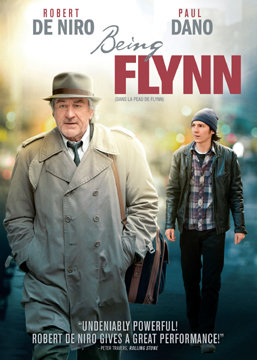
Courtesy of Alliance Films
obsession, or self-delusion bordering on mania, those words are at the heart of Jonathan Flynn’s sense of self. But no sooner does he utter those words, than his estranged son Nick interrupts him, taking over as the story’s narrator: “This isn’t his story. Well, it is; but he’s not telling it. I am. I’m Nick Flynn, his son.” Father and son are played by Robert De Niro and Paul Dano, respectively; and those actors deliver strong, nuanced performances. Convinced by his own dreams of glory, Jonathan sings his own praises while driving a taxi for a living. He hasn’t seen his son for 18 years, leaving the physical and emotion child-rearing to his deserted wife Jody (played in flashbacks by the always effective Julianne Moore). Needless to say, Nick has some highly conflicted feelings about the father who has only ever been manifest in his life “as an absence, a non-presence, a name without a body.” And, then, without a word of contrition for a lifetime of neglect, the father suddenly reenters his son’s life, when the father’s abrupt and sharp downward spiral lands him at the homeless shelter where his son works. Their reunion is decidedly not the warm and cuddly affair that you’d find in a more conventional film: “So, after 18 years of wondering, here’s what I learned about my father: He’s a racist, he’s a homophobe, and he’s effing crazy.” Their difficult reunion gives birth to latent doubts in Nick’s psyche: Is he like his father? Will he fall prey to the same flaws and weaknesses? Written and directed by Paul Weitz (2002’s “In Good Company”), the movie was adapted from the real-life memoir of Nick Flynn, “Another Bullshit Night in Suck City.” The writing is gritty and visceral; and it sometimes has a literary ring to it: “My father is an invisible man in an invisible room in the invisible city.” And the performances are award-caliber. It’s a career best for Dano (of “There Will Be Blood”), who brings nicely textured sensitivity and self-doubt to his role as a young man who may be sucked into the same vortex of doom that seems to have swallowed his father whole. And it’s gratifying to see De Niro play a man whose native charisma cannot hide his essential unattractiveness. It may be an even better performance than De Niro’s work in 2010’s overlooked “Stone.” Olivia Thirlby makes an impression in a supporting role; indeed, the entire roster of supporting players (among them Lili Taylor) is rock-solid. “It’s another prison, these blowers, cause once you’ve landed you can’t leave. Because one step off the blower is cold, hypothermia cold, now that you’re sodding with steam. The blower is a room of heat with no walls.” The only DVD extra is a 6-minute featurette. For ages 18+: Coarse language.
“Broken Embraces” [“Los Abrazas Rotos”] (Spain, 2009) (B): “I was always tempted by the idea of being someone else, as well as myself.” Those words are spoken by Mateo Blanco (played by Lluis Homar), a
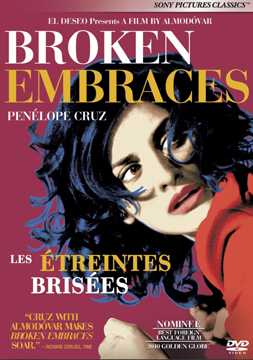
Courtesy of Sony Pictures Classics
screenwriter and former director who has taken on a new name (Harry Caine) after the automobile accident that claimed both the love of his life and his sight. And he’s not the only character who has multiple selves to his credit: His lost love (Lena, played by Penelope Cruz) is a dutiful daughter, business-like secretary, part-time call-girl, mistress to a much older financier, aspiring actress, and femme fatale. Her sugar-daddy (Ernesto Martel, played by Jose Luis Gomez) is both a powerful businessman and a man driven to irrational extremes by his obsession with his mistress. And, Judit (Blanca Portillo), the dutiful agent and close friend of the bereft filmmaker, has a secret or two of her own, born of jealousy. Spanish director Pedro Almodovar’s film has elements of film-noir, comedy, romantic tragedy, and deliberate melodrama. It seems to contain homages to Alfred Hitchcock and to the 1950’s auteur of melodramatic cinema Douglas Sirk. Almodovar has a string of acclaimed films to his credit — motion pictures like “Volver,” “Talk to Her,” “All About My Mother,” and “Women on the Verge of a Nervous Breakdown.” But “Broken Embraces” is a hard film to pin down. Is it meant to be a serious romantic drama — “an amour-fou [or mad love] with four lovers,” as Penelope Cruz has said? Frankly, the tone seems too arch to be taken as straight drama. Or, is the film meant to be a virtuoso exercise in style, with sly use of framing, color (watch for the ubiquitous use of the color red), and plotting to reference other filmmakers and, mayhap, the art of filmmaking itself? Among its imponderables are the inclusion of a protracted clip from a comedic film within the film near the end. Why is it there? What is its significance? Answers are elusive. And it is difficult to entirely buy into Cruz’s erotic relationship with either of the men in her menage a trois: Both are much older than her, and that gap of years is a distraction. At least, it would be if we are meant to accept the story as straight-forward romantic drama. Despite its ambiguous, even odd, tone, “Broken Embraces” does captivate — in part through the sheer magnetism of its beautiful leading lady, in part through its quixotic refusal to follow a conventional path, and in part through the unmistakable talent behind and in front of the camera. “Broken Embraces” won Best Score at Spain’s Goya Awards, where it also earned nominations as Best Actress, Screenplay, Costume Design, and Make-up. It won Best Composer at the European Film Awards, where it was nominated for Best Actress and Director. And it was nominated as Best Foreign Language Film at the Golden Globes. DVD extras include, inter alia, deleted scenes, a seven-minute comedic short film (featuring Marta Aledo) that is loosely derivative from the feature, and a superficial Q&A session with Penelope Cruz. For ages 18+: Nudity, sexual content, and brief coarse language.
“The Joy Luck Club” (USA, 1993) (A): Relationships between mothers and daughters are complex webs of hopes, dreams, disappointments, and regrets. Amy Tan co-wrote the screenplay for this story about four sets of mothers and daughters from her own novel of the same name — and it’s an emotional powerhouse of a movie. There are eight characters and eight points of view. It’s about the fierceness of maternal love: “It’s not too late. All my pain, my regrets. I will gather them together. My daughter will hear me calling even though I’ve said no words. She will climb the stairs to find me. She will be scared because at first her eyes will see nothing. She will feel in her heart this place where she holds her fears. She will know: I am waiting like a tiger in the trees, now ready to leap out and cut her spirit loose.” And it’s about the anguish of children failing to achieve what they think is expected of them: “This power I had, this belief in myself. I could actually feel it draining away. I could feel myself becoming so… ordinary. All the secrets I once saw I couldn’t see anymore. All I could see… were my mistakes, my weaknesses. The best part of me just… disappeared…. I did it to myself.” It’s about knowing one’s true worth. It’s a movie in which the words “I see you” have profound meaning. But, most of all, this bittersweet and powerfully moving story is about love. The writing and performances are first-rate. And, Rachel Portman’s score is the most emotionally evocative film music in years: It essentially consists of just a single theme, but that theme is heart-wrenching! Like the film, there is sadness, beauty, redemption, and love in its achingly poignant notes. A swan’s feather is an important motif in one of the stories, but, as a metaphor for a mother’s love for a daughter its significance is universal: “This feather may look worthless, but it comes from afar and it carries with it all my good intentions.” “The Joy Luck Club” grips its viewers emotionally, and the tears we shed will be prompted as much by joy as by sadness. Brief coarse language. No DVD extras.
“Barney’s Version” (Canada, 2010) (B+): The late Canadian novelist Mordecai Richler’s protagonist Barney Panofsky (winningly played by Paul
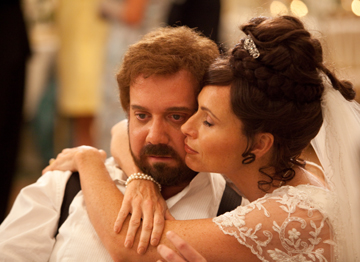
Paul Giamatti & Minnie Driver in "Barney's Version" (photo by Takashi Seida, courtesy of eOne Films).
Giamatti) may have been married three times, but no one can say he isn’t a true romantic. It’s just that his timing is off a bit. He marries his first wife, the troubled Clara (Rachelle Lefevre), in Rome in 1974 because he believes her to be pregnant with his child. The still-birth of a black baby prompts the attending physician to inform Barney that the baby cannot be his, unless Barney happens to be an albino. Later, back home in Montreal, Barney confides to his best friend ‘Boogie’ (Scott
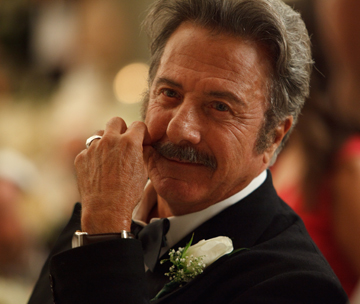
Dustin Hoffman in "Barney's Version" (photo by Takashi Seida, courtesy of eOne Films).
Speedman) that, “For the first time in my life, I am truly, seriously, irrevocably in love.” The only trouble is that Barney has just met the love of his life, Miriam (appealingly played by Rosamund Pike, the English actress who also played an important role in the 2007 film adaptation of another acclaimed Canadian novel, “Fugitive Pieces”), at his own wedding reception to wife number two! Minnie Driver plays the nameless second wife, the “rich man’s vulgar daughter” who is emotionally disowned even before her wedding day is over. Giamatti does award-winning work as the flawed but essentially good Barney; and he is surrounded by a strong supporting cast, foremost among them being Dustin Hoffman as his retired policeman father Izzy. Hoffman steals every scene he’s in, and that’s no mean feat when he
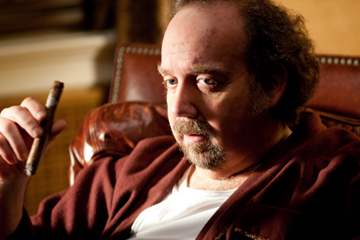
Paul Giamatti in "Barney's Version" (photo by Sabrina Lantos, courtesy of eOne Films).
shares nearly all of his scenes with as skilled an actor as Giamatti: (Q) “Are you saying you were gratuitously violent with suspected felons?” (A) “Gratuitously? No, I always got paid. I ain’t gonna work for free.” Bruce Greenwood makes an impression, as he always does, in a supporting role. And watch for a amusing roll-call of other Canadians in small cameos — ranging from actor Paul Gross as a sitcom actor playing a Mountie (shades of Gross’ role in the 1994-99 television series “Due South”) to directors David Cronenberg and Atom Egoyan in blink and you’ll miss ’em walk-ons as (what-else?) directors. The result is a film that effectively blends humor, satire (it skewers hypocrisy and pretension), romance, and moments of real poignancy: (Barney) “Have I ever given up when it comes to you/” (Miriam) “No.” (Barney) “So what makes you think I’m going to start now?” “Barney’s Version” won seven of Canada’s Genie Awards — Best Actor (Giamatti), Supporting Actor (Hoffman), Supporting Actress (Driver), Original Score, Costume Design, Make-up, and Art Direction — and it was nominated as Best Film, Director, Adapted Screenplay, and Actress (Pike). Giamatti won Best Actor at the Golden Globes; and the film won the Little Golden Lion (a kind of runner-up prize) at the Venice International Film Festival. And that barely skims the surface of the film’s many award wins and nominations. The DVD’s deleted and extended scenes (27 minutes worth in all) are well-worth watching, nicely enhancing the development of several characters and situations; indeed, it’s a shame most or all of the cut footage was not left in situ. For ages 18+: Coarse language and mild sexual content.
“The Celebration” [“Festen”] (Denmark, 1998) (B+/A-): When a family gathers to celebrate the 60th birthday of their wealthy patriarch, it soon becomes clear that deep stresses and strains lay close beneath the nominally celebratory surface. At first, it seems that we are simply seeing the little frictions, jealousies, and resentments that bedvil most families to one degree or another. But, there’s a much darker secret at the heart of this particular family’s malaise; and the deplorable truth will out, if the eldest son has anything to say about it. Let it be said: Scandinavian angst is a dish best served with some stellar acting. The result is a virtuoso display of acting by an ensemble cast that includes Ulrich Thomsen (who appeared in 2010’s “In a Better World”) as the tormented eldest son Christian; Henning Moritzen as the father whose success and outward charm mask an ugly secret; Thomas Bo Larsen as the volatile, bullying younger son, Michael; and Paprika Steen (who starred in 2009’s “Applause”) as Helene, the daughter whose wild, free-spirited ways veil a troubled psyche. Supporting players include Birthe Neumann (as a mother complicit in her husband’s crime); Trine Dyrholm (as Pia, a servant who years for Christian’s love); Helle Dalleris (as Michael’s verbally abused wife Mette); Therese Glahn (as Michelle, the servant to whom Michael once came in the night but to whom he will now not even give the time of day); Gbatokai Dakinah (as the outsider who witnesses the family reunion from hell); and Bjarne Henriksen (as Christian’s childhood friend and the present-day chef who mobilizes the downstairs staff to see justice done). “The Celebration” is part psychological drama and part satire, giving us a glimpse of the brutishness that can lurk behind civilized facades. Emotionally riveting and occasionally disturbing, it also has moments of humor — of both the light and dark varieties. It is a powerful film that will stay with you. The film earned many awards and nominations, such as the Jury Prize at Cannes (where it was also nominated for the Palme d’Or); Discovery of the Year at the European Film Awards; and Best Foreign Language Film at the Independent Film Awards. It was nominated in that same category at the Golden Globes. “The Celebration” was written and directed by Thomas Vinterberg; and it is the first film made in the “Dogme 95” film movement that Vinterberg founded with fellow Danish director Lars von Trier in 1995. The movement’s goal was to hew to unadorned storytelling and to eschew special effects and intrusive technology. It amounts to a reaction to the prevailing norm in Hollywood of big budget blockbusters. Dogme 95 dogmatically proclaimed a number of rules (though its adherents tended to break those self-imposed rules when it suited them). Among its tenets were: (i) a requirement to shoot only on location — without props and sets, (ii) to avoid music unless it is “diegetic,” that is, music that takes place in the story and is audible to the characters, (iii) to only use hand-held cameras, (iv) to avoid special lighting, (v) to avoid superficial action (like murders or gunfire), (vi) to present stories in the here-and-now (devotees of science fiction and fantasy need not apply, it seems), and (vii) to avoid all genres in favor of contemporary realism. For ages 18+. Warning: Coarse language and sexual talk; racist language in one scene; sexual content and nudity in one scene; verbal references to sexual abuse.
“King of Devil’s Island” [“Kongen av Bastoy”] (Norway/France/Sweden/Poland, 2010) (B/B+): Norway prides itself on being an enlightened, liberal society nowadays (though that did not spare them from
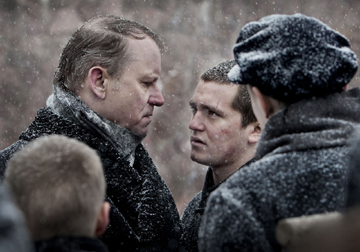
Stellan Skarsgard & Benjamin Helstad in "King of Devil's Island" (courtesy of Film Movement).
the terrible massacre of 77 people on July 22, 2011 by a violent homegrown ideologue). But for more than 50 years (1900-53), Norway put its delinquent minors out of sight and mind at a foreboding institution “for maladjusted boys” on the one square mile island known as Bastoy. The island is now home to a minimum security prison for adult males; the current institution aims to be the first “ecological prison” anywhere, housing its inmates in wooden cottages and offering them leisure activities like horse-back riding, tennis, and cross-country skiing. Things were not so cozy during its reform school days, when a far more draconian approach prevailed. Based on actual events, director Maruis Holst’s film focuses on a new inmate, the 17-year-old Erling Kaspersen (played by Benjamin Helstad). A tough, taciturn, and sturdy fellow who has worked as a harpooner aboard a whaling ship, Erling is rumored to have killed a man. We never know the actual nature of his offense. What is clear is that his fierce independence of spirit has put him on an inevitable collision course with Bastoy’s no-nonsense overlord. Governor Hakon (another stellar performance from Stellan Skarsgard) is a strict disciplinarian. Each new boy is assigned a number by which he is thereafter known. Erling becomes C19. Hakon tells him, “You know how important discipline is… Here, I’m your captain. This island is my ship… Our goal, and your goal, is to find an honorable, humble, useful Christian boy in here. S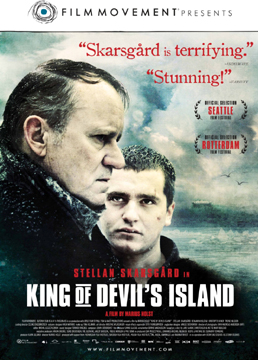 hape him and polish him. And if we don’t find him, you’ll stay here.” Erling is thrown together with Olav, or C1 (played by Trond Nilssen), a boy who has conformed to the rules and risen to a position of trust in desperate anticipation of his impending release. Meanwhile, a weaker boy, Ivar, or C5, who arrived at the same time as Erling, is having a harder time keeping his head above water; he has fallen victim to a predatory “house-father” named Brathen (Kristoffer Joner). The film is part character drama and part battle of wills — a battle that pits human dignity and free will against what amounts to a microcosm of totalitarian oppression. When we hear Erling’s words in voice-over describe the fate of a whale he helped hunt, we know that he has now taken his place as a victim of forces intent on breaking him: “I once saw a whale get hit by three harpoons and still keep going. It took him a whole die to die.” The film contains some moderate violence.
hape him and polish him. And if we don’t find him, you’ll stay here.” Erling is thrown together with Olav, or C1 (played by Trond Nilssen), a boy who has conformed to the rules and risen to a position of trust in desperate anticipation of his impending release. Meanwhile, a weaker boy, Ivar, or C5, who arrived at the same time as Erling, is having a harder time keeping his head above water; he has fallen victim to a predatory “house-father” named Brathen (Kristoffer Joner). The film is part character drama and part battle of wills — a battle that pits human dignity and free will against what amounts to a microcosm of totalitarian oppression. When we hear Erling’s words in voice-over describe the fate of a whale he helped hunt, we know that he has now taken his place as a victim of forces intent on breaking him: “I once saw a whale get hit by three harpoons and still keep going. It took him a whole die to die.” The film contains some moderate violence.
The DVD’s accompanying short film is “Bale” (U.K., 2009) (C+/B-): This simple 15-minute story in miniature takes place on a single sunny afternoon. Three young boys travel by bicycle to a farmer’s field where they turn stacked bales of hay into their very own fortress of the imagination. But barbarians are soon at the walls in the form of teenagers intent on teasing and driving off their younger foils. Soon both sides learn that the simplest pranks can yield dire results. Brief coarse language.
“Albert Nobbs” (U.K./Ireland, 2011) (B+/A-): “We are both disguised as ourselves,” says a character to the eponymous subject of this intriguing film. And he doesn’t know how true his words are. For Mr. Nobbs, who is
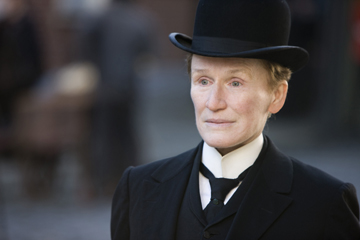
Glenn Close in "Albert Nobbs" (courtesy of Lionsgate Films).
the very epitome of a 19th century butler — efficient, discrete, and ever-alert to the needs of those he serves — is actually a woman masquerading as a man. Glenn Close, who also co-wrote and co-produced this film, delivers an astonishing, award-caliber performance. As the story opens, her character is completely closed-off from the outer world and from any semblance of a personal life. Her only life is her work, and the nature of the monumental ‘deception’ she is perpetrating makes friendships impossible. Yet, in an unexpected way, Nobbs is very much an innocent abroad in the world; she is a lonely, introverted soul who is utterly naive about the things most people take for granted. She has never known family, or love, or friendship, or sexual passion. She makes the perfect butler — she is both efficient and invisible to those she serves. But things are about to happen that will shake the narrowly circumscribed parameters of her simple life. It is impossible to take one’s eyes off Close. Her performance is supremely subdued and subtle — hinting at much through simple things, like when she makes eye contact and when she does not. Close brings great dignity and humanity to the character she inhabits, often relying on silent movie mannerisms to express her isolation and her puzzlement at the world around her. And Close is surrounded by an exceptionally strong cast — among them, Janet McTeer (who is a charismatic powerhouse in every scene she’s in), Mia Wasikowska, Aaron Johnson, Brendan Gleeson, Pauline Collins, Brenda Fricker, Bronagh Gallagher, and Maria Doyle Kennedy, to name only a few of this dream cast. The result is a blend of “Downton Abbey,” “Upstairs, Downstairs,” and “The Remains of the Day,” with a cross-gendered twist. First and foremost a character-study, it is also a study of the manners and mores of its time and place, with satirical barbs directed at the impenetrable walls that social class and money erected around 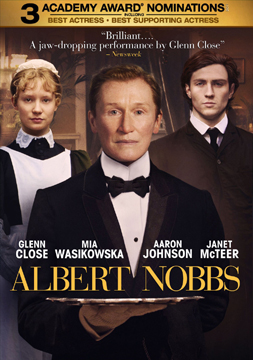 (and between) people. It is not a comedy, but it has many quietly humorous moments. Columbia-born director Rodrigo Garcia’s film is about identity, about what makes us who and what we are. It is also about the notion that there are no little dreams in life. “Albert Nobbs” earned many award nominations. It was nominated for Academy Awards as Best Actress, Supporting Actress (McTeer), and Make-up, for Best Actress, Supporting Actress, and Original Song at the Golden Globes, for Supporting Actress at the Independent Spirit Awards, and for both Actress and Supporting Actress at the Screen Actors Guild. At the Irish Film and Television Awards (that country’s version of the Oscars), it won Best Actress, Score, Sound, and Makeup; and it was nominated for Best Film, Script, Supporting Actress (for Fricker and for Doyle Kennedy, this time), and Supporting Actor (Gleeson). This film is not to be missed! For ages 18+: Coarse language; brief partial nudity; and brief sexual content. The DVD commentary by the director and Glenn Close deserves a rating of (A) for very usefully enhancing our insight into their storytelling techniques and objectives. The DVD extras also include three deleted scenes, each of which is well-worth watching.
(and between) people. It is not a comedy, but it has many quietly humorous moments. Columbia-born director Rodrigo Garcia’s film is about identity, about what makes us who and what we are. It is also about the notion that there are no little dreams in life. “Albert Nobbs” earned many award nominations. It was nominated for Academy Awards as Best Actress, Supporting Actress (McTeer), and Make-up, for Best Actress, Supporting Actress, and Original Song at the Golden Globes, for Supporting Actress at the Independent Spirit Awards, and for both Actress and Supporting Actress at the Screen Actors Guild. At the Irish Film and Television Awards (that country’s version of the Oscars), it won Best Actress, Score, Sound, and Makeup; and it was nominated for Best Film, Script, Supporting Actress (for Fricker and for Doyle Kennedy, this time), and Supporting Actor (Gleeson). This film is not to be missed! For ages 18+: Coarse language; brief partial nudity; and brief sexual content. The DVD commentary by the director and Glenn Close deserves a rating of (A) for very usefully enhancing our insight into their storytelling techniques and objectives. The DVD extras also include three deleted scenes, each of which is well-worth watching.
“Georgia O’Keeffe” (USA, 2009) (B+): “I have been absolutely terrified my entire life; and I have never let it stop me from doing a single thing I wanted to do.” That seems to be the credo for the art and life of Georgia O’Keeffe, the daughter of Wisconsin farmers whose trail-blazing art earned her lasting international renown. Opening in 1916, this film follows the closely intertwined joys and tribulations of her personal life and those of her creative life as an artist. Joan Allen brings great strength and resolve to both aspects of O’Keeffe’s life; and she has a perfect foil in Jeremy Irons, as her sometime lover, husband, friend, and impresario Alfred Stieglitz. A talented artist in his own right (he is regarded as the father of American photography), Stieglitz loved O’Keeffe but failed to remain maritally faithful to her. Their relationship was fraught with pain and disappointment, but the ties that bound them nevertheless endured for their lifetimes. The result is a bittersweet love story; an account of a woman’s journey to find fulfillment and independence; and an artist’s struggle to express her vision of the world she sees around her. O’Keeffe is taken by the philosophy of a native-American she meets in Taos, New Mexico, who tells her: “It means that you’re one with nature… Not better or worse, not different, not separate, but all the same… It means that you are the earth and sky.” And she brings the same attributes to her art as she does to her life: “I can’t help being honest. I don’t know if it’s a fault in my nature, or a good thing, but I’ve never had any choice in the matter.” Directed by Bob Balaban, this made-for-cable-television movie is a far better character study than most movies made for the big screen. It attracted a host of award nominations, including nine prime-time Emmy nominations (among them Best Movie, Actress, and Director); Golden Globe nominations as Best Movie, Actress, and Actor; Sceen Actors Guild nominations as Best Actor and Actress; and a Director’s Guild nomination as Best Director. It won the TV writing award from the Writer’s Guild of America. Brief slightly crude language. The DVD has a nine-minute featurette about the making of the film.
“A Screaming Man” [“Un homme qui crie”] (France/Chad, 2010) (B/B+): “The pool’s my whole life. I was Chad‘s first pool attendant. I was the central African swimming champion in 1965.” So says Adam (Youssouf Djaoro), a middle-aged man whose longstanding job as pool attendant at a
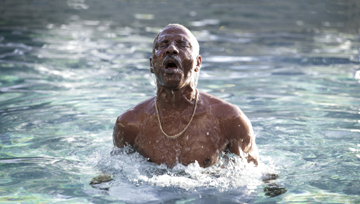
Youssouf Djaoro in "A Screaming Man" (courtesy of Film Movement).
modern hotel in the central African nation of Chad is the all-important source of his self-identity. The foreign-owned hotel, which caters to visitors from more prosperous parts of the world, seems to be the only one in town that has a swimming pool. (Chad is a landlocked sub-Saharan country which gained its independence from France in 1960. It is situated due south of Libya, and it has an estimated population of 10.3 million people.) Known to one and all as “Champ, ” on the strength of his long-past athletic accomplishments, Adam is a dignified man, calm in demeanor and respected by others. He gleans his income and much of his sense of self-worth from his position at the pool, and it has also enabled him to hire his young adult son Abdel (Diouc Koma) as his assistant. Just as important, the pool keeps Adam connected to the water and his past glories as a competitive swimmer. But the hotel has new owners and there is a civil war raging in the hinterland far from the city. People are losing their jobs; 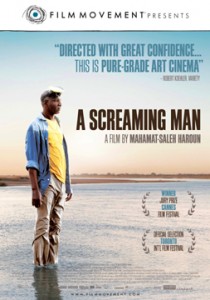 some are losing their lives. When Adam is confronted with an indignity that throws all of his inner certainties into question, he makes a desperate decision that threatens to tear apart the very fabric of his life. What do we hold dearest in life? What will we do to hold onto it? If we betray the truest part of ourselves, what then is left? Will it be a mistake that will haunt us forever? Writer/director Mahamad-Saleh Haroun (who is from Chad) has fashioned a quiet, gently-paced study about crushing losses, making mistakes, and seeking redemption. It’s a simple story — and very much a festival film, gleaning much of its interest from its exotically unfamiliar setting and from the quiet dignity and understated charisma of its leading man: Djaoro may be an African variation on America’s Denzel Washington. “A Screaming Man” won the Jury Prize at Cannes, where it was also nominated for the Palme d’Or. Thematically, it brings to mind Edvard Munch’s famous painting, “The Scream.”
some are losing their lives. When Adam is confronted with an indignity that throws all of his inner certainties into question, he makes a desperate decision that threatens to tear apart the very fabric of his life. What do we hold dearest in life? What will we do to hold onto it? If we betray the truest part of ourselves, what then is left? Will it be a mistake that will haunt us forever? Writer/director Mahamad-Saleh Haroun (who is from Chad) has fashioned a quiet, gently-paced study about crushing losses, making mistakes, and seeking redemption. It’s a simple story — and very much a festival film, gleaning much of its interest from its exotically unfamiliar setting and from the quiet dignity and understated charisma of its leading man: Djaoro may be an African variation on America’s Denzel Washington. “A Screaming Man” won the Jury Prize at Cannes, where it was also nominated for the Palme d’Or. Thematically, it brings to mind Edvard Munch’s famous painting, “The Scream.”
The DVD’s accompanying short film is “Expectations” (France/Chad, 2008) (B-/B): Leading man Youssouf Djaoro and writer/director Mahamad-Saleh Haroun are reunited in this 28-minue short film that debuted at a film festival in South Korea. Its characters and stories seem to be unrelated to the main feature. Its long opening section unfolds in near silence, as a man trudges across desert sands. We learn that he is on some kind of unspecified quest, which also constitutes a test. He survives his ordeal in the desert, but he returns to the city without accomplishing whatever it is that took him to the wilderness in the first place. Friends and family are baffled by his resolute silence: “Everyone says you’ve gone crazy. But nobody actually believes it.” Djaoro may have little to say here, but he has a wonderfully expressive face. The result is unapologetically enigmatic. It may represent Man’s struggle against Nature. It may be a parable about Man’s relentless quest for some indefinable something. It may be about society ostracizing those who fail to meet its expectations. Or, it may just be a mood-poem. It is slow-moving and mighty light on story; so it definitely is not to all tastes. The film is called “Expectations,” but you’d be wise to see it without having any expectations — especially when it comes to of encountering anything conventional.
“The Time That Remains” (France/Belgium/Italy, 2009) (B/B+): How ought we to accept our destinies in life — with equanimity, bitterness, defiance, or just a bemused smile? “Israeli-Arabs” is the term used for Arabs who remained (be it by choice or by force of circumstance) in the State of Israel after the 1948 Arab-Israel War. Their situation is different from that of Arabs in the territories (the West Bank, Gaza, the Golan Heights, and East Jerusalem) occupied by Israel after the Six Day War in 1967, insofar as they are citizens of Israel rather than a occupied population per se. But writer/director Elia Suleiman’s film implies that at least some Israeli-Arabs may feel like occupied (or conquered) people, whatever advantages their citizenship may confer on them relative to their brethren in the Occupied Territories. Set in the city of Nazareth, a predominantly Arab city which remained inside Israel proper after the 1948 conflict, “The Time That Remains” is an autobiographical story about the lives of Suleiman’s own family. Opening in 1948, his own father Fuad (Saleh Bakri) has taken up arms (it seems in a defensive posture) against the forces of the fledgling State of Israel. Narrowly escaping death in the conflict, he remains quietly embittered about the outcome, even as he marries Thuraya (Leila Muammar) and has a son, Elia. The story takes place in 1948, 1970, 1980, and 2009. The setting and the underlying situation — which periodically involves life and death conflict between two peoples struggling over the same land — are not ones that instantly bring to mind a comedic approach. But that’s what makes this film so pleasingly unexpected. In the present-day section, Suleiman appears as himself, a silent, bemused observer of life’s absurdities who brings to mind a modern-day variation on Buster Keaton or Charlie Chaplin. Some have compared the film to the work of the French actor and director Jacques Tati. Its little vignettes about things domestic and political are wry, keenly observant, and gently satirical; for Suleiman’s tone is very much a humanistic one. He may imply criticism of Israel, but this is not a hateful or sectarian film. Rather, it uses the driest of humor to tell an inter-generational story of an ordinary family coping with unusual circumstances; and it as aware of their foibles as it is of their small triumphs. The result is refreshingly original and engagingly down-to-earth. “The Time That Remains” was nominated for the Palme d’Or (Best Film) at Cannes. For ages 18+: Some coarse language.
“Shame” (U.K., 2011) (B+/A-): What lies behind some facades is a howling void — a place that gives no comfort and a psyche that knows no joy. Brandon

Michael Fassbender in "Shame" (photo by Abbot Genser, courtesy of Fox Searchlight).
Sullivan is the embodiment of just such a facade. Outwardly, he is a comfortably-off Manhattan businessman. But his every waking moment is devoted to sexual compulsion. In lieu of relationships, he has a succession of one-night stands. The closest he comes to any other human being is anonymous sex. His promiscuity runs the gamut from pornography to prostitutes to casual pick-ups to compulsive masturbation. And none of it brings him pleasure, let alone happiness. Brandon seems to be afflicted with a male variant of nymphomania. Detached, numb, solitary, and emotionless, he is connected to nothing and loves no one. The film’s muted palette of grey-blues echoes the troubled state of Brandon’s soul. When another character utters the words, “I find you disgusting. I find you inconsolable. I find you invasive,” it seems, at first, to us and to Brandon, that the words refer to him. They don’t, but, then again, they do. At a moment of sexual climax later in the film, Brandon’s face,
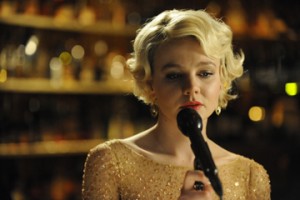
Carey Mulligan in "Shame" (photo by Abbot Genser, courtesy of Fox Searchlight)
shockingly, is a revealing study not of pleasure, but of grief, pain, and anger. This is one badly damaged soul. The film doesn’t offer any explanations for the source of the damage; but it’s clear from the visit of Brandon’s equally troubled sister that the damage runs in the family and was incurred much earlier in life. “We’re not bad people; we just come from a bad place,” Sissy tells Brandon. The German-born actor Michael Fassbender (2009’s “Fish Tank”) delivers a riveting performance as Brandon, while Carey Mulligan (2010’s “Never Let Me Go” & 2009’s “An Education”) is very affecting as the lost-soul Sissy. These are deeply disturbed people, but they aren’t so far gone that we can’t feel empathy for their broken lives. One critic dubbed “Shame” a ‘psychosexual drama,’ and that term seems as apt as another critic’s description of the film as ‘a great act of filmmaking and acting.’ It’s difficult to watch, and its gritty sexual content is as relentless as it is blatant; but there is also something inexplicably mesmerizing about its glimpse into the abyss of two riven psyches. The effectively foreboding, emotional score by composer Harry Escott conjures a mood reminiscent of a Hitchcock film. “Shame” was nominated as Best Film and Actor at BAFTA; it was nominated as Best Actor at the Golden Globes; it won Best Actor at the British Independent Film Awards, where it was also nominated for Best British Independent Film, Director, Screenplay, Supporting Actress, Cinematography, and Editing; it won the Top Ten Independent Films Award and the Spotlight Award for its leading man at the National Board of Review; and it won three prizes at the Venice Film Festival, where it was also nominated for the Golden Lion (Best Film). “Shame” was directed (and co-written) by Steve McQueen. For ages 18+. Warning: Very strong sexual content, nudity, coarse language (including explicit sexual language), and some violence.
“Martha Marcy May Marlene” (USA, 2011) (B+): Early one morning, a young woman flees the isolated farm where she has been living as part of what initially seems to be a commune. But the commune is in fact a cult, and

Sarah Paulson & Elizabeth Olsen in "Martha Marcy May Marlene" (photo by Jody Le, courtesy of Fox Searchlight).
Martha finds that evading them psychologically is a lot harder than leaving them behind physically. Reunited with an older sister whom she hasn’t seen in two years, Martha is tormented by the life she barely summoned the courage to escape. The result is a gripping drama about the seduction and domination of one psyche by others, with award caliber work by 22-year-old Elizabeth Olsen (the younger sister of the celebrity twins demonstrates real acting chops). When she arrives at the farm, she’s a self-confident young woman. But she is
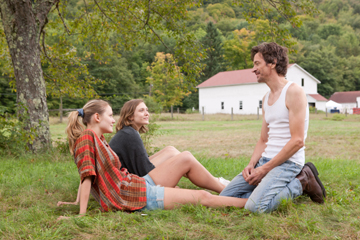
Louisa Krause, Elizabeth Olsen, & John Hawkes in "Martha Marcy May Marlene" (courtesy of Fox Searchlight).
outmatched by the cult’s leader Patrick, who is equal parts charisma and quiet menace. Played by John Hawkes, who was nominated as Best Supporting Actor at the Academy Awards for his equally intense portrayal of Teardrop in 2010’s “Winter’s Bone,” Patrick incrementally increases the pressure on Martha, playfully renaming her the first time he meets her, and later exhorting her to bend to his will: “If you feel safe here, and I hope you do, let us in. We want to help you… If you’re going to live here, you need to be part of things.” That entails some increasingly transgressive behavior; but the film adeptly ratchets-up the more sinister aspects of the cult very gradually. Martha is urged by her female mentor at the farm to, “Trust us.” And she so does, becoming an active participant in the farm’s alternate lifestyle, until her conscience reasserts itself as the true horror of her predicament becomes unmistakeable. Martha finds sanctuary at the lakeside home her sister Lucy (nicely played by Sarah Paulson) shares with her husband (Hugh Dancy) in another seemingly idyllic rural setting: “How far are we?” asks Martha. “From what?” replies Lucy. “Yesterday,” explains Martha. In fact, they are a mere three hours “from yesterday,” that is, from the nightmare Martha has fled — not nearly far enough to elude the 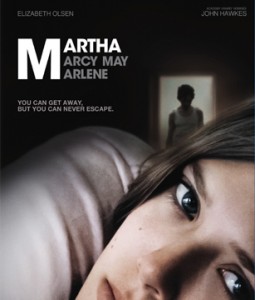 psychological demons she’s brought with her. Martha’s behavior is erratic, like that of a person recently arrived from another world or still half-resident there. “It’s not normal,” exclaims her sister in a display of understatement, when Martha’s behavior becomes too shocking to ignore. Meanwhile, Martha is tormented by memories (the film constantly flits between her life at the farm and her life at her sister’s) and by sounds in the night. When Patrick tells her, “You’re my favorite, and I won’t lose you,” it’s as much a veiled threat as it is an expression of affection. Are her former captors on her trail, or is Martha experiencing a paranoid break-down precipitated by fear, guilt, remorse, shame, and doubt? The ambiguity in Olsen’s performance gives added heft to writer/director Sean Durkin’s feature film directorial debut. The result is riveting, nuanced, and quietly scary. A jarring, dissonant musical score adds to the nerve-wracking tension. The film won Best Director at Sundance and earned lots of nominations at film festivals; but it didn’t get nearly the public notice it deserved. It’s a shame there’s no commentary on the DVD: It would have been nice to hear from Sean Durkin and key members of his cast. For ages 18+. Warning: coarse language, nudity, sexual content, violence, brief sexual violence, and disturbing content.
psychological demons she’s brought with her. Martha’s behavior is erratic, like that of a person recently arrived from another world or still half-resident there. “It’s not normal,” exclaims her sister in a display of understatement, when Martha’s behavior becomes too shocking to ignore. Meanwhile, Martha is tormented by memories (the film constantly flits between her life at the farm and her life at her sister’s) and by sounds in the night. When Patrick tells her, “You’re my favorite, and I won’t lose you,” it’s as much a veiled threat as it is an expression of affection. Are her former captors on her trail, or is Martha experiencing a paranoid break-down precipitated by fear, guilt, remorse, shame, and doubt? The ambiguity in Olsen’s performance gives added heft to writer/director Sean Durkin’s feature film directorial debut. The result is riveting, nuanced, and quietly scary. A jarring, dissonant musical score adds to the nerve-wracking tension. The film won Best Director at Sundance and earned lots of nominations at film festivals; but it didn’t get nearly the public notice it deserved. It’s a shame there’s no commentary on the DVD: It would have been nice to hear from Sean Durkin and key members of his cast. For ages 18+. Warning: coarse language, nudity, sexual content, violence, brief sexual violence, and disturbing content.
The DVD’s accompanying short film is “Mary Last Seen” (2009) (B). While “Martha Marcy May Marlene” was still in its conceptual stages, its writer/director, Sean Durkin, set the stage for the planned feature film with this 14-minute short film, which depicts the journey to the main story’s farm by another young woman, Mary, brought there by her seeming boyfriend. It’s an introduction, or, more accurately, a prelude, to the earliest stages of indoctrination and initiation which are explored more fully in the feature film. It was shot in two days on a shoestring budget (the director says it was a mere $500!), but it has the look of a feature film, and it sets the ominous tone — of predatory betrayal — of the feature film. For ages 18+.
“Storm” (Germany/Denmark/The Netherlands/Sweden/Bosnia-Herzegovina, 2009) (B+): The horrifically savage internecine conflict that ravaged Bosnia-Herzegovina between April 1992 and December 1995, in the
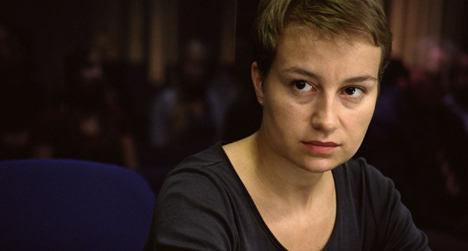
Anamaria Marinca as "Mira" in "Storm" (courtesy of Film Movement).
wake of the disintegration of Yugoslavia, was the most destructive conflict to occur in Europe since the Second World War. With a death toll of up to 110,000 (and 2.2 million people displaced, many of them permanently), the Bosnian War put the lie to the self-satisfied notion of a Europe moving inexorably toward brotherhood and goodwill. As a former constituent republic of Yugoslavia, Bosnia-Herzegovina was comprised of three main groups: Muslim Bosniaks, Serbs, and Croats, who made up 44%, 31%, and 17% of Bosnia’s population, respectively. The cultural, linguistic, historical, and religious differences between groups which had coexisted peacefully for years suddenly took on murderous proportions, thanks, in large measure, to the irredentist aggression of the neighboring statelets of Serbia and Croatia. Those two former republics in the disintegrating federal state of Yugoslavia were determined to carve out sections of Bosnia which were home to their ethno-linguistic kin and to expel (or simply murder en masse) any of the other two groups who lived there. In the process, we witnessed the barbaric spectacle of so-called “ethnic cleansing,” systematic mass rape, genocide, and rampant war crimes (like the deliberate targeting of non-combatants in the hitherto happily cosmopolitan capital city of Sarajevo and elsewhere). Although none of the parties was entirely free from blameworthy conduct, the Bosniaks were the chief victims of the savagery. Meanwhile, we in the West ignominiously failed to take any meaningful action to stop the vicious violence for more than three years. When NATO fighter jets finally intervened against Serbian and Bosian-Serb forces, the conflict came to a rapid end. That’s the background of this film’s drama about the bitter aftermath of this horrible conflict and the brave souls who seek justice. It’s a fictionalized story that closely echoes traumatic real-life events. One of its protagonists is a prosecutor at the International Criminal Tribunal for the Former Yugoslavia (or ICTY), a court set up by the U.N. to hold the perpetrators of worst atrocities accountable. The character of Hannah Maynard (played by New Zealand-born actress Kerry Fox of 2009’s “Bright Star”) is a tough, no-nonsense attorney who is loath to sacrifice justice (or the rights of the victims) for political expediency: “What about the witness? This is not an acceptable deal for the witness. She’s become a pawn in some sort of political stitch-up… It is unjust! We have a woman who needs to be heard. She needs to tell her story.” The woman who needs to tell her story is Mira Arrendt (played by Romanian actress Anamaria Marinca of 2007’s “4 Months, 3 Weeks, and 2 Days”). Mira knows awful secrets about crimes against humanity perpetrated during the conflict. She is reluctant to put her current life at risk by coming forward, but she does so — on the strength of the promise of justice. But will justice be done; or will geo-political
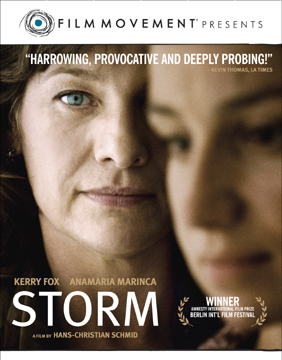
Kerry Fox & Anamaria Marinca in "Storm."
considerations hijack the process? The film combines a very personal story of two strong women, with elements of a crime mystery and investigation, and a dab of courtroom drama. Because it is a fictionalized story and not a documentary, the filmmakers choose to heighten the drama at times with some plot contrivances (in the form of violence or threats of violence against both women, and somewhat heavy-handed machinations by persons in positions of trust) which may strain verisimilitude a tad. But that’s a minor cavil in a story that is most effective when it is a character drama about conscience, courage, and the holding to account of those whose repugnant crimes befoul any notion of human decency. Directed and co-written by Hans-Christian Schmid (2006’s “Requiem”), “Storm” won Gold for Best Editing and Score and Silver for Best Film at the German Film Awards, where it was nominated for Best Director and Screenplay. It also won the Amnesty International Film Prize at the Berlin Film Festival, where it was nominated for the Golden Bear (Best Film). It’s an issue-driven film that combines a macro-theme (crimes against humanity) with a very personal micro-drama centered in its two strong female characters. For ages 18+: Some coarse language; brief violence.
The DVD’s accompanying short film is: “Toyland” [“Spielzeugland”] (Germany. 2007) (B+): Marianne (Julia Jager) and her young son Heinrich (Cedric Eich) are friends with a family (a man, a woman, and a young boy named David) in the neighboring flat. David is her son’s best friend; the man teaches both boys piano. But the neighbors are expected to be leaving very soon. To explain their imminent departure, Marianne tells Heinrich that the neighbors are going to take a train to Toyland. Heinrich is determined not to be left behind: “I’m coming with you to Toyland, even if mother won’t let me.” He confides to David that, “We’re blood brothers. We swore we’d do everything together.” Sure enough, one morning, when Marianne awakens, the neighbors are gone — and so is Heinrich. The wrinkle in this 14-minute short film from director Jochen Alexander Freydank has to do with its time and place. It takes place in Nazi Germany in 1942. The neighbors in questions are Jews, you see, while Marianne and her son are not. And the destination of Toyland is a white lie a mother has (ironically) told her son to protect him from the ugly truth about their friends’ true fate. “Toyland” won an Academy Award as Best Live Action Short Film.
“The Descendants” (USA, 2011) (B+): “Our family seems exactly like an archipelago, all part of the same whole, but still separate and alone and always drifting slowly apart.” An archipelago, of course, is a group of
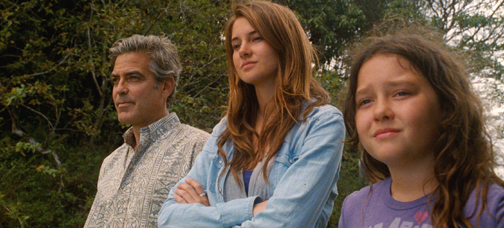
George Clooney (as Matt King), Shailene Woodley (as Alexandra), and Amara Miller (as Scottie) in "The Descendants" (courtesy of Fox Searchlight).
neighboring islands, and the simile employed in the words quoted above refers both to the setting of the story, the Hawaiian islands, and to the troubled King family the story concerns. Our narrator, Matt King (George Clooney), is also the story’s protagonist. A real estate lawyer by profession, he is the sole trustee for a 25,000 acre swath of land owned by his extended family. The land, which is situated on Kaua’i (the fourth largest and geologically oldest of the Hawaiian islands), has been in the family since the 1860’s. It is in pristine natural condition, and it happens to be immensely valuable. The family is

George Clooney in "The Descendants" (courtesy of Fox Searchlight).
considering bids from competing developers to buy the land. As Matt observes, “A lot of my cousins are broke, and the sale will make us very, very rich.” It’s up to Matt to oversee that process and to make the final decision. But he has other things on his mind: His wife has been grievously injured in a boating accident and lies in a coma from which she may never awaken; his youngest daughter Scottie (Amara Miller) is acting-out badly; and his older daughter Alexandra (Shailene Woodley) is even more of a discipline problem: “What is it with the women in my life that makes them want to destroy themselves?” he wonders. Distraught over his wife’s precarious situation, guilty about allowing his work to take precedence over his family over the years, daunted by the prospect of suddenly having to step-up to the unaccustomed role as primary caregiver to his children (“I’m the back-up parent, the understudy,” he admits); traumatized and nearly felled by an unexpected revelation, George is a picture of a man who is in danger of being overwhelmed by a tsunami of troubles. Directed and co-written by Alexander Payne (“Sideways”), “The Descendants” is a hard film to pin down in terms of tone. Some viewers insist that it is a drama; but this reviewer sees it as a quirky dark comedy with a dryly deadpan tone reminiscent of, say, “Broken Flowers.” Either way, it is played with a straight-face, so much so, in fact, that some might find its tone somber. But, there’s always something slightly askew, something a little off dead-center about these characters and the situations they encounter, that removes them from the realm of straight drama and strict realism. For this reviewer, those little twists in the fabric of realism make this film a kind of theater of the ever-so-slightly absurd. The stand-outs in the cast are Clooney and the teenage Woodley, while Julie Speer (as the wife of a man Matt has reason to resent) and Beau Bridges (as a cousin) also make an impression. For his part, Nick Krause grates at first, then grows on you, as Sid, a ‘stoner’ friend of Alexandra, who inappropriately tags along on very private family functions and proceeds to say whatever pops into his head. For all its fascinating off-beat tone, “The Descendants” does yield some very authentic insights into human relationships and some touching moments, especially in a couple of Clooney’s one-way conversations with his comatose wife: “Isn’t the idea of marriage to make your partner’s way in life a little easier? For me, it was always harder with you; and you’re still making it harder.” The film attracted a tidal-wave of awards and nominations. To mention only the smallest few: It won Best Film (Drama) and Actor at the Golden Globes, where it was also nominated as Best Director, Screenplay, and Supporting Actress (Woodley); it won Movie of the Year at the American Film Institute; it won Best Adapted Screenplay (it is based on a book by Kaui Hart Hemmings) at the Academy Awards, where it was also nominated as Best Film, Director, Actor, and Editing; it was nominated at BAFTA for Best Film, Actor, and Adapted Screenplay; and it won Best Supporting Actress (Woodley) and Screenplay at the Independent Spirit Awards, where it was also nominated for Best Film and Director. For ages 18+: Abundant coarse language.
“City Island” (USA, 2009) (B): Who’d have guessed that the metropolis of New York City harbors in its very bosom a quaint little fishing village called City Island. Technically part of the Bronx, it’s really a small world onto itself, a place where, “the world can be divided between clam-diggers and mussel-suckers, those who stay and those who wander.” The idiosyncratic sense of place suggested by those words gives this small festival film much of its charm, just as the watery vistas provide the appealing, ready-made set-dressing that gives this low-budget film a bigger, lusher, more extravagant look than it would have had in a more conventional setting. Written and directed by Raymond De Felitta, “City Island“ is the story of one eccentric family. The father is a prison guard by day, and (secretly) an aspiring actor by night. He is played by Andy Garcia, who co-produced the film. He also delivers its best performance, with his intense first acting audition worth the price of admission all on its own as the movie’s best scene. His wife — a de-glammed, sassy-mouthed Juliana Marguiles (of television’s “The Good Wife”) — comes to believe that her spouse’s acting lessons, which he disguises as poker games, are actually an illicit affair in progress. Meanwhile, an odd son (Esra Miller) is skipping classes and obsessing over internet sites devoted to very large women (a bit of strangeness that is the film’s one unappealing plot device); while his sister (Dominik Garcia-Lorido, who is leading man Andy Garcia’s daughter in real-life too) has lost her college scholarship and is secretly working as a stripper to make up the difference. Into this already volatile mix comes a twenty-something convict (sympathetically played by Steven Straight) who is eligible for parole — if he can find a berth with his family. Turns out that Garcia’s character, Vince Bizzo, is his family, though no one knows it save Vince. Along for the ride is the always entertaining Alan Arkin as a drama teacher (if only the film made more use of him) and the British actress Emily Mortimer, who uses her native accent in an unexpected way. “City Island“ won the Audience Award at New York’s Tribeca Film Festival. It’s a small film that seeks to endear us towards its quirky brood, and, for the most part, it succeeds in its mild, low-keyed way. Some have compared its tone to that of “Little Miss Sunshine,” and it’s not a bad comparison. One might even say it’s a lightly comedic variation on “Secrets and Lies,” without the anguish, but with some Americana. For ages 18+: Brief coarse language and mild sexual content. The DVD offers an engaging and informative commentary with the director and the leading man.
“Karen Cries on the Bus” [“Karen Ilora en un bus”] (Colombia, 2011) (B): You know a marriage is in trouble when the wife is fond of reading
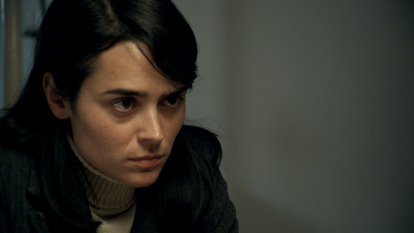
Angela Carrizosa Aparicio as Karen in "Karen Cries on the Bus" (courtesy of Film Movement)
Ibsen’s play “A Doll’s House.” It seems that that play sets the template for this film’s protagonist. She is taken for granted and patronized by an insensitive husband: “If you want to go, just go. This is the last chance I will give you. I don’t want to see you coming back asking for forgiveness.” So, 30-something Karen (Angela Carrizosa Aparicio) does go — leaving a loveless marriage and a comfortably middle class life for the emotionally turbulent and financially risky alternative of being alone and jobless in a big city (Bogota) that seems to hold out very few opportunities for her. She finds shelter in a terribly squalid rooming house, a place where the shared bathroom is too wretchedly dirty to use. Attempts to find work as a shop clerk go nowhere; and a disreputable outfit selling “free” courses expects Karen to start working without pay. Before long, Karen is reduced to begging on the street and petty theft — just to feed herself! But, this is the story of a woman’s empowerment. At the nadir of her fortunes, Karen confides in the seemingly carefree friend Patricia (Maria Angelica Sanchez Parra) whom she meets at the rooming house that, “I feel ugly and old.” But Karen is neither, and she gradually learns to fend and think for herself, making new friends, taking on responsibilities, and even encountering hope of being with “a guy who loves you as you deserve.” Patricia exhorts her to “Take all these things you’re feeling now and use them to your own advantage. You are a very pretty and smart woman. Don’t be afraid of living life and taking risks.” And that’s just what Karen resolves to do, rehabilitating herself in the process after a precipitous socio-economic fall. On the down side, there are a few too many scenes of her desperate recourse to begging, as well as a couple of nagging inconsistencies (why doesn’t she find temporary refuge with her 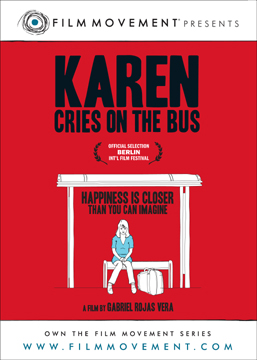 comfortably-off parents, and how does she treat her ex to drinks at a time when she has no money to spare for such luxuries?). More importantly, though, the film — which was written and directed by a man (Gabriel Rojas Vera) with an adept understanding of his female characters — offers nice performances in a down-to-earth, unpretentious slice of life. It’s also an interesting look at another part of the world. For ages 18+: Some coarse language; brief nudity; and brief sexual content.
comfortably-off parents, and how does she treat her ex to drinks at a time when she has no money to spare for such luxuries?). More importantly, though, the film — which was written and directed by a man (Gabriel Rojas Vera) with an adept understanding of his female characters — offers nice performances in a down-to-earth, unpretentious slice of life. It’s also an interesting look at another part of the world. For ages 18+: Some coarse language; brief nudity; and brief sexual content.
The DVD’s accompanying short film is “Lessons from the Night” (Australia, 2009) (B). This eight-minute documentary written and directed by Adrian Francis has as its subject a middle-aged woman named Maia. Maia was a respected translator in her native Bulgaria; but unforeseen changes find her in Australia, where she works as a cleaning woman. We see her go about that humble work in the office towers of a big city by night. Her workplace is deserted; but, any stragglers from among the white-collar set would not take notice of Maia. She is effectively invisible to them. We hear her thoughts by way of her own voice-over narration. Maia is an ordinary human being, much reduced in material circumstances but still perceptive, mutedly humorous, and in possession of dignity. She is also something of a philosopher: “If you buy a diamond, it doesn’t matter how much you spend; after 20 years, you still have a diamond. I come and clean… and that’s it, it’s gone.” The film is very simple in concept and execution, but it evokes a kind of homespun wisdom. To closely paraphrase Maia, ‘It is a solitary job, but it is not a lonely job, because you are still living with people. It’s just that they don’t know that you are there because you live with what they left behind.’
“Take Shelter” (USA, 2011) (B+/A-): “You got a good life Curtis… I
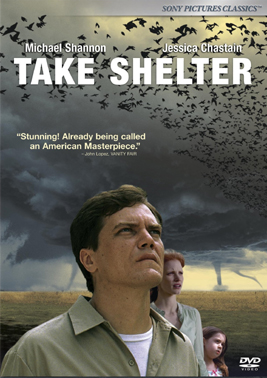
Courtesy of Sony Pictures Classics.
think that’s the best compliment you can give a man. Take a look at his life and say ‘That’s good. That man is doing something right.'” Should your best friend ever express a similar sentiment to you, you might want to run for cover. Curtis (Michael Shannon) does indeed seem to lead a good life. He is happily married to Samantha (Jessica Chastain). Their young daughter Hannah (first-time actor Tova Stewart) is deaf but otherwise happy and healthy. But, in very short order, nothing at all is going right for Curtis. Someone once said that whom the gods would destroy they first drive crazy. As if in fulfillment of that aphorism, Curtis becomes stricken with vivid nightmares and waking dreams associated with violent storms. Curtis becomes convinced that something bad, possibly apocalyptically bad, is coming. It starts as a vague feeling, grows into a certainty, and manifests as an obsession. “I’m thinking about cleaning up that storm shelter out back,” he says laconically. It’s a major under-statement as he mortgages the house and illicitly uses construction equipment from work to build a shelter capable of weathering doomsday. He’s nearly as troubled by his own actions as his family and neighbors come to be. For Curtis labors under the knowledge that his mother (nicely played by Kathy Baker) was diagnosed with paranoid schitzophrenia in her 30’s. He worries that he may have inherited the same mental illness that afflicted her. But he cannot shake the feeling of dread that comes with his visions of violent lightning storms and acidic rain: “It’s hard to explain because it’s not just a dream. It’s a feeling. I’m afraid that something might be coming. Something’s that’s not right. I cannot describe it. I just need you to believe me.” Is Curtis a prophet or a madman? The line between the two is never easy to make out. How much can we take on faith from those we are close to, once they start tuning into signals which the rest of us cannot discern? In a sense, of course, something bad always is coming for us, though we never know the day it will appear or the shape it will take. Curtis believes he senses the shape of the particular catastrophe that he’s convinced is headed his way. Written and directed by Jeff Nichols, “Take Shelter” has an intriguing premise and very good performances. For her part, Jessica Chastain has done stand-out work in more recent movies than one can shake a stick at, including “The Tree of Life,” “Coriolanus,” and “The Help.” The film’s byword is ambiguity — about what is real and what is merely perceived. “Take Shelter” won the Critics Week Grand Prize and FIPRESCI (or International Federation of Film Critics) Award at Cannes. It has attracted numerous other nominations and awards at film festivals; and, the Toronto Film Critics Association awarded it both Best Actor (for Shannon) and Best Supporting Actress (for Chastain). For ages 18+: Some coarse language.
“The Tree of Life” (USA, 2011) (B+/A-): In the opening moments of this strange, impressionistic, and beautiful reflection upon life and love and
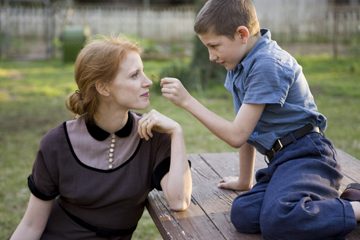
Jessica Chastain & Tye Sheridan in "The Tree of Life" (courtesy of Fox Searchlight)
grace, an unseen narrator tells us that, there are two ways though life, “the way of nature and the way of grace. You have to choose which one you’ll follow. Grace doesn’t try to please itself. It accepts being slighted, forgotten, disliked. It accepts insults and injuries. Nature only wants to please itself and get others to please it too. It likes to lord it over them, to have its own way. It finds reasons to be unhappy when all the world is shining around it and love is smiling through all things.” Grace is personified here by the wife and mother played by Jessica Chastain (“I will be true to you, whatever happens.”); her stern and remote husband (played by Brad Pitt) represents the way of nature (“The world lives by trickery. If you want to succeed, you can’t be too good.”); while their oldest son Jack (played as a child by Hunter McCracken and as an adult by Sean Penn) represents the every-child and everyman who is torn between those two forces (“Mother. Make me good. Brave.”). Writer-director Terence Malick eschews conventional storytelling here in favor of a radically different approach. He fills the celluloid canvas with brief vignettes — fragments of scenes, fragments of sentences — culled from a span of time that starts with the creation of the universe and extends to moments from the lives of a suburban family in 1950’s Texas. The result is temporal fluidity, an agglomeration of images and impressions that jump around in time in the lives of its characters and in the life of our shared planet. Here is impressionism writ large, filmmaking that is completely unconventional in substance and style. Story is subordinated to imagery and the feelings it evokes in the viewer. We are present for the Big Bang; we see far-flung galaxies, the formation of nebulae (the immense nurseries where stars are born), the first oceans, the origins of life, the age of the dinosaurs, the asteroid impact believed to have extinguished them, the ascendancy of mammals and then of man. Much like the film’s O’Brien family, we each have our place on that expansive canvas. And, somehow, despite our humble smallness in the great immensity of creation, we each possess uniqueness and importance; we each have our own irreplaceable part in the cosmic dance of life. This film juxtaposes the macrocosm of the universe with the microcosm of individual human lives and finds something of holiness in each. The narrator’s words are part inner monologue, part
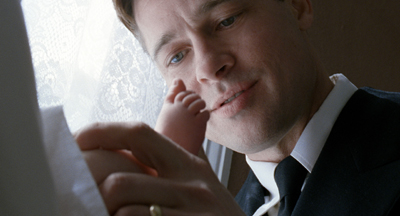
Brad Pitt in "The Tree of Life" (courtesy of Fox Searchlight)
prayer, and part dialogue with the unseen: “Lord? Why? Where were you?” Those who search in vain for meaning and coherency in this abstract work of art should remember that the film itself is a question; or, rather, a quest — for meaning, for understanding, and for a sure path to the heart of grace. It’s a film about aspiring to be better than we are; a film about being tempted to sin (“You mother’s naive. It takes fierce will to get ahead in this world. If you’re too good, people will take advantage of it.”); a film about our stumbling, blindfolded need for God, or, if you prefer, for ascendancy over our own weak natures; and a story about our individual roles in the greater tree of life. Its spoken words often take the form of a fragmentary monologue, a whispered prayer to the God who created the endless universe that surrounds us: “You spoke to me through her. You spoke with me from the sky, the trees. Before I knew I loved you. Believed in you. When did you first touch my heart?” It’s a film about the search for faith, the import of the natural beauty and boundless diversity that surrounds us, and the struggle between right and wrong. It’s about the awakening of conscience and the gathering of wisdom and the desire for happiness that consumes so much of our energies (whether we know it or not): “The only way to be happy is love. Unless you love, your life will flash by. Do good to them. Wonder. Hope.” The film is full of wonder, hope, beauty, mystery, and majesty. But don’t expect it to present its rewards in a straightforward package. It will challenge you. It may even confound you. But, it’s a work of art — to be marveled at rather than easily or definitively understood. It’s about themes more than story in the conventional sense. Whether it is profound or impenetrable and self-indulgent depends on your point of view. This reviewer urges you to leave your preconceptions behind and prepare to be amazed by this daringly impressionist exploration of acceptance, grace, and faith. “The Tree of Life” is nominated for Academy Awards as Best Film, Director, and Cinematography. This critically-acclaimed motion picture won Best Director, Actor (Pitt), Supporting Actress (Chastain), and Cinematography from the National Society of Film Critics stateside, where it also won second place as the Best Film of the year. Too bad there’s no commentary on either the DVD or Blu-ray discs.
“Cafe de Flore” (Canada/France, 2011) (B+/A-): “This is the story of a
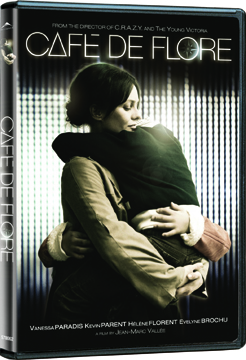
Courtesy of Alliance Films
man with every reason to be happy and the lucidity to realize it.” The man is Antoine (Kevin Parent). He lives in present-day Montreal. He married his soul-mate Carole (Helene Florent) when they were both adolescents; they have two lovely daughters; and he has found remarkable success through his love for music — though exactly how one earns such a good living as a disc jockey remains a mystery. But things aren’t as perfect as they seem, for Antoine has left Carole for another woman, the sexy and blonde Rose (Evelyne Brochu). Carole clings to the hope that it’s just a midlife crisis that’s taken her first and only love from her: “It’s not surprising I can’t leave him… I’ve never known any other men. I’ve never kissed anyone else. I’ve loved once in my life. One man. But loved like no one else. That kind of love, when you lose it, there’s only one way to survive. You look for an explanation, or else you die.” But Carole is troubled by strange dreams that somehow seem to involve the film’s second story-line, the story of a mother and her young son in Paris of 1969: “And here’s a boy who doesn’t have every reason to be happy or the lucidity to realize it. Fortunately, he has Jacqueline.” Deserted by her husband after the birth of their handicapped son, Jacqueline (Vanessa Paradis) is deeply loving and fiercely protective of young Laurent (Martin Gerrier). He has Down’s Syndrome; but Jacqueline is determined that his life will be long and full: “That day, at that precise moment, Jacqueline gave her life meaning. Her baby, Laurent, would live to a ripe old age” in defiance of the average life expectancy of 25 years for those born with Down’s. But when the child falls in love (at age seven!) with a girl who also has Down’s, he starts to choose his young love over his older one. Writer-director Jean-Marc Valle’s (“C.R.A.Z.Y.” and “The Young Victoria“) film glides through space and time, interconnecting its two seemingly separate, but mirrored, stories with a myriad of symbols. Keep your eyes peeled for the fleeting reflections of figures in windows, the juxtaposition of a character from one story to the other, and images as cleverly ubiquitous as rose-window motifs. “Cafe de Flore” is a strange, intoxicating marvel of impressionism — and, oh, the wonderful use it makes of moments of silence. Those silent interludes speak volumes, as its twin stories unfold in poetic, dreamlike vignettes. It’s a highly original meditation on love, and life, and the things that connect us to others. It has all the intricate complexity — and beauty — of a spider’s web glistening with dew in the early morning. And it’s not to be missed! “Cafe de Flore” has been nominated for 13 Genie Awards (Canada’s version of the Academy Awards), among them: Best Film, Director, Actor (Gerrier), Actress (Paradis), Supporting Actress (Florent), and Original Screenplay. The Vancouver Film Critics Circle has already named the film Best Canadian Film of the year. For ages 18+: Sexual content, nudity, and coarse language. Inexplicably, the DVD has no extras at all.
“XXY” (Argentina, 2007) (B+/A-): Fifteen-year-old Alex (Ines Efron) 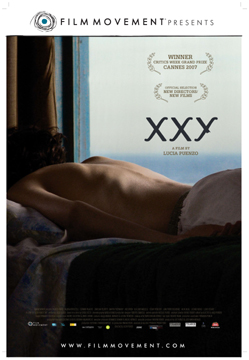 and her parents, Kraken (Ricardo Darin of “The Secret in Their Eyes”) and Suli (Valeria Bertuccelli), have quit their native Argentina for a secluded life on the sparsely populated coast of neighboring Uruguay, where Kraken works as a marine biologist, caring for sea turtles. But things in their seaside haven are not as calm as they appear on the surface. Alex has recently had a harsh break with her best friend; and visitors who come at the behest of her mother become embroiled in the secret that torments Alex and her parents. For Alex is a “hermaphrodite,” that is, she possesses both male and female characteristics and the sexual organs of both genders. It is important to note that word ‘characteristics.’ Alex’s duality is not confined to physical body parts. Indeed, it is no coincidence that an alternate meaning for the word “hermaphrodite” is “a person or thing in which two opposite forces or qualities are combined.” The combination in one person of contradictory elements is an extremely difficult thing to live with. For Alex, those disparate elements go to the heart of her gender and her sexual identity. The friend of her mother (Erika, played by Carolina Peleritti) who comes to visit is married to a plastic surgeon (Ramiro, played by German Palacios), and he wants to resolve Alex’s otherness through surgery. Alex’s own mother regards Alex as female and is alarmed when she stops taking the drugs that suppress the development of male attributes. The visitors bring with them a son, Alvaro (Martin Piroyansky), who is one year older than Alex, and an attraction develops between the two adolescents. But, Alvaro senses that Alex is different, even before he knows why: “You’re not normal. You’re different, and you know it. Why do people stare at you? Why? What’s wrong with you?” Alvaro may already have his own issues of sexual identity to confront; or, he soon does as things progress with Alex. At heart, though, “XXY” is about more than sexual identity. It is about what it means to be ‘different’ for any reason, to be someone who does not fit in with
and her parents, Kraken (Ricardo Darin of “The Secret in Their Eyes”) and Suli (Valeria Bertuccelli), have quit their native Argentina for a secluded life on the sparsely populated coast of neighboring Uruguay, where Kraken works as a marine biologist, caring for sea turtles. But things in their seaside haven are not as calm as they appear on the surface. Alex has recently had a harsh break with her best friend; and visitors who come at the behest of her mother become embroiled in the secret that torments Alex and her parents. For Alex is a “hermaphrodite,” that is, she possesses both male and female characteristics and the sexual organs of both genders. It is important to note that word ‘characteristics.’ Alex’s duality is not confined to physical body parts. Indeed, it is no coincidence that an alternate meaning for the word “hermaphrodite” is “a person or thing in which two opposite forces or qualities are combined.” The combination in one person of contradictory elements is an extremely difficult thing to live with. For Alex, those disparate elements go to the heart of her gender and her sexual identity. The friend of her mother (Erika, played by Carolina Peleritti) who comes to visit is married to a plastic surgeon (Ramiro, played by German Palacios), and he wants to resolve Alex’s otherness through surgery. Alex’s own mother regards Alex as female and is alarmed when she stops taking the drugs that suppress the development of male attributes. The visitors bring with them a son, Alvaro (Martin Piroyansky), who is one year older than Alex, and an attraction develops between the two adolescents. But, Alvaro senses that Alex is different, even before he knows why: “You’re not normal. You’re different, and you know it. Why do people stare at you? Why? What’s wrong with you?” Alvaro may already have his own issues of sexual identity to confront; or, he soon does as things progress with Alex. At heart, though, “XXY” is about more than sexual identity. It is about what it means to be ‘different’ for any reason, to be someone who does not fit in with
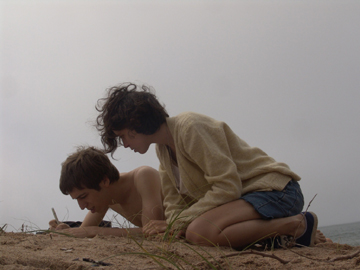
Alvaro (Martin Piroyansky) & Alex (Ines Efron) in "XXY" (courtesy of Film Movement)
conventional notions of what is expected or ‘normal.’ How does the person who is outside of the ordinary deal with his or her own difference? Are those who are different from the norm doomed to be ostracized by others? To what extent do we accept and accommodate those we perceive as being different from ourselves? (Given the endlessly recurring habit we humans have of dividing our fellow beings into “us” and “them” on the flimsiest of grounds, our track record for accepting differences does not inspire confidence, alas.) Should we change to make ourselves more acceptable to others, or even to make life more superficially comfortable for ourselves? These are huge issues for a 15-year-old to be forced to confront. Her own confusion and uncertainty is mirrored in the attitudes of those around her, all save, perhaps, her father. Alex: “What are you doing?” Kraken: “Taking care of you.” Alex: “You can’t take care of me forever.” Kraken: “Until you choose.” Alex: “What?” Kraken: “Whatever you want.” Alex: “What if there isn’t a decision to make?’ (If there is any significance to the fact that the name ‘Kraken’ denotes a huge sea monster in mythology, it is never
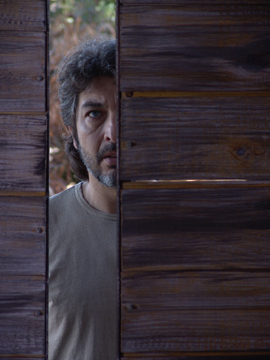
Ricardo Darin (as Kraken) in "XXY" (courtesy of Film Movement)
developed in the film.) While the specific dual-gender issues at play in “XXY” are outside the ken of most of us, they in no way impede the broader applicability of being ‘different.” Alex’s plight may seem strange, and even outlandish, when described; but the magic of good storytelling (and good acting) is that we get caught up in her story. Although the film isn’t only about sexuality, sexuality plays a prominent part, so take note of the warnings at the end of this review. Born in 1978, Lucia Puenzo, who wrote, directed, and produced “XXY,” has a Ph.D. in Argentine literature. She is the author of three novels; and she has directed short films, documentaries, and a TV miniseries. “XXY” is her first feature film. Puenzo describes her film as a love story, her protagonist as having an “intersex” body, and her film as asking, “Who decides that there are only two ways to be human?” The film has attracted numerous festival awards and nominations. For example, at the Argentine Film Critics Association Awards, it won Best Film, Actress, and Adapted Screenplay (adapted from the short story “Cinismo” by Sergio Bizzio); where it was also nominated as Best Director, Cinematography, Art Direction, Music, and Sound. At Spain’s Goya Awards, it won Best Spanish Language Foreign Film. And, it won the Critics Week Grand Prize at Cannes. For ages 18+. Warning: Occasional coarse language; sexual language; partial nudity; one mildly disturbing scene of sexual violence; and sexual content which is frank and which some may find disturbing.
In the DVD’s accompanying short film, “The Pick-up Artist” [“Der Aufreisser”] (Germany, 2006) (A-), Olli’s (Steffen Groth) modus operandi when it comes to ‘romance’ is the one-night stand; in other words, he likes his sex non-committal. Sneaking out the morning after his latest conquest (Laura, played by Nina Weniger, is still asleep), Olli comes face to face with Laura’s six-year-old daughter Yvonne (Chantal Hourticolon): (Q) “Are you Mama’s new boyfriend?” (A) “Me? No.” (Q) “Then what are you doing in her bedroom?” Yvonne insists on showing Olli her room and her drawings. (Q) “Do you want to be my Papa?” (A) “No.” (Q) “Why not?” He forgets his keys; little Yvonne flushes them, and then she reads his little black book in which he rates his amorous adventures, disarming him with her plucky determination: “You’re just afraid of closeness,” she concludes. Poor Olli. He meets his match in the person of a precocious young child who won’t take no for an answer. The result is very funny. This charming 13-minute short was directed by Steffan Weinert.
“The Sunset Limited” (USA, 2011) (A): Imagine a ruthless verbal
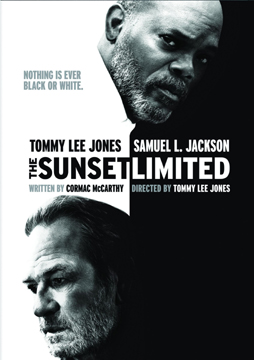
Courtesy of Warner Bros.
wrestling match between darkness and light. It would be a struggle between life and death, quite literally. It would be a conflict that would engage every ounce of its opponents’ strength, conviction, and guile. It would embody cosmic concerns in two flesh and blood mortals. C.S. Lewis presented one such struggle in his beautiful novel “Perelandra.” Now, author Cormac McCarthy (“No Country for Old Men”) has fashioned an equally compelling battle of words and ideas in this film, adapted from his own stage play: “The truth in the forms I see has been emptied out. They no longer have any content. A train, a wall, a world, a man… a thing… hanging in a howling void. No meaning to life; it’s words. You asked me what I’m a professor of. I’m a professor of darkness. The night in day’s clothing.” Stark moral opposites find themselves face to face in a desperate struggle for the human soul. Preacher is pitched against professor, faith versus disbelief, life against death, and hope against self-destruction and despair. Two nameless men, Black (Samuel L. Jackson) and White (Tommy Lee Jones, who also directed the film), face off in the Spartan setting of a plain apartment room. Black has intervened in White’s attempt to kill himself by throwing himself in front of a train called “the Sunset Limited.” White is a stranger to Black; but Black has taken responsibility for the other man’s fate and has taken him home in an effort to talk sense to him. But Black will not be moved: “The shadow of the axe lies over every joy; every road ends in death, every friendship, every love… Torment, loss, betrayal, pain, suffering, age, indignity… ” There is breathtakingly poetic eloquence on both sides; and the viewer is immersed in language of great power and beauty. And the performances are nothing short of spellbinding, full of heartfelt emotion and intense, passionate conviction. Black extols faith and love, “that thing that allows you to ladle out benedictions on the head of strangers, instead of curses.” Where White sees only futility, Black sees hope and purpose: (W) “Are you living the life you had planned?” (B) “No, it ain’t. But I got what I needed, instead of what I wanted. Sometimes, that’s the best kind of luck to have.” Utterly engrossing and wonderfully moving from its first word until its last, “The Sunset Limited” is a near-masterpiece of a film, an exquisite monument to outstanding writing and bravura performances. Don’t miss it, whatever you do! For ages 18+: Very brief coarse language.
“Gigante” [“Giant”] (Uruguay, 2009) (B/B+): Jara (Horacio
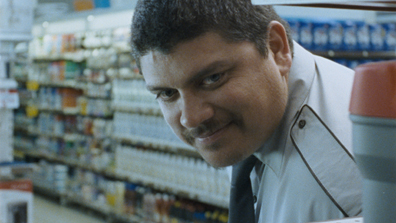
Horacio Camandulle in "Gigante" (courtesy of Film Movement)
Camandulle) is shy, solitary, and lonely. A big-boned, heavyset young man, he is employed as a nighttime security guard at a large supermarket in Uruguay’s capital city, Montevideo. He whiles away the hours watching video monitors to keep an eye on the staff. One of them, a young cleaning woman named Julia (Leonor Svarcas), attracts his notice. Jara starts watching her go about her cleaning rounds, even finding ways to deflect the manager’s attention from her mistakes. Soon, Jara takes to following Julia around after work (from a safe and anonymous distance) as she spends her days at the beach, the cinema, and an internet cafe. But there is nothing sinister or stalker-like about Jara’s intentions. On the contrary, he is an innocent abroad, enamored of a young woman he is too shy to meet, let alone ask out on a date. For all his size (and a weekend job as a nightclub bouncer), Jara is a gentle giant, and he soon becomes not only Julia’s secret admirer but also her guardian angel. “Gigante” is very simple, very quiet, and very much a small festival-type film. It’s an unconventional love story. It’s also surprisingly sweet, giving us a good sense of its shy, solitary protagonist — a young man who lives on the margins of society — with remarkably little dialogue. Director Adrian Biniez’s film won the Silver Bear (Best Director), Best First Feature Film, and the Alfred Bauer Prize (given to the film which best opens “new perspectives in film art”) at the Berlin International Film Festival; and it won Best Director at the Chicago International Film Festival. For ages 18+: Brief coarse language.
The DVD’s accompanying 18-minute short film, “Dennis” (Denmark, 2007) (B+/A-), also deals with a big man, a man who also resides on the margins of society. Its protagonist, Dennis (Kim Kold) is a shy body builder who lives with his mother (Elsebeth Steentoft, who appeared in 2010’s “In a Better World”). She’s not at all pleased to hear that he’s going out on a Friday night, playing the guilt and silent treatment cards in an effort to keep him at home: ‘‘If you can just stand people up like that…” But Dennis perseveres — and goes on a date with Patricia (Lykke Sand Michelsen), a young woman he has seen and admired at a fitness club. Like the protagonist in “Gigante,” Dennis seems to be a man-boy in some ways; he may be large in stature, but he’s clearly inexperienced in the ways of the world. The closeness between him and his mother may well involve an unhealthy degree of emotional co-dependency. It’s impossible to say more without spoiling the story; but the pair are intriguing characters. They may inhabit only a short film; but they are so authentic and unique, you’ll wish it was a feature length story. “Dennis” won festival awards in Toronto, Berlin, Melbourne, and elsewhere.
“Thorne: Sleepyhead” (U.K./Canada, 2010) (B+/A-): Based on the
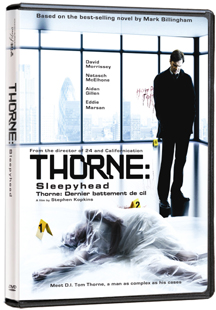
Courtesy of TVA Films
novel by Mark Billingham, this made-for-cable police drama has a tormented detective, Tom Thorne (David Morrissey) on the trail of a serial killer. One of the killer’s victims, a young woman, has been left afflicted with “locked-in syndrome.” A stroke, deliberately induced by her assailant, has left her utterly paralyzed: She is fully conscious, but unable to speak or move. Her nightmarish plight is chillingly depicted through the stricken woman’s voice-over narration, and actress Sarah Lloyd Gregory deserves strong kudos for capturing our attention and sympathies through her voice-work alone. For his part, Morrissey makes a nicely flawed hero in a suspenseful drama that not only has some edge of your seat moments but also an admirably strong grounding in both story and character. There’s superior direction (courtesy of Stephen Hopkins) and award-caliber performances all-round (with Aiden Gillen, Eddie Marsan, Natascha McElhone, Stephen Campbell Moore, and Joshua Close in supporting roles). More installments in the Thorne series are in production. This one’s an absolute must for lovers of English crime drama — and everyone else who appreciates their drama shaken, not stirred. For ages 18+: Coarse language, strong violence, and disturbing content.
“Trust” (USA, 2010) (B+): A 14-year old girl’s online correspondence with a male she met through a chat-room develops into an imagined romance with her unseen suitor. All the while, her feelings are being manipulated and she is being groomed to prepare her for their meeting. The lie that her suitor “loves” her is so successfully implanted that Annie (Liana Liberato) somehow accepts the shock, upon meeting him in person, of discovering that he is in fact 35 years old. Her subsequent violation at the hands of that adult predator sets the stage for the film’s primary concern, namely, what that assault does to the relationships within Annie’s family. Her father, Will (played by Clive Owen), starts to feel uncomfortable with his work devising advertising campaigns that target ‘tweens’ and teens, ads that feature scantily-clad young models. Will is obsessed with tracking down the man who sexually assaulted his daughter; but, contrary to the misleading DVD box art, which depicts Will with gun in hand, “Trust” is not a story about revenge. It’s about the family bonds that are damaged when trust between members of that family is compromised. Will puts it this way to Annie, “You were fearless… You just had this confidence… You just had this trust in things, people, the world. It was who you were. No fear. God, I loved that. I was so proud of it. I envied it. I was so afraid that you’d lose it as you grew up — that confidence, that faith. But you didn’t. And then I failed you: It was my job to make sure you didn’t lose it, keep you safe… I don’t know if you can ever forgive me; I don’t know if you should. But I’m sorry; I’m so sorry.” “Trust” has some unsettling moments when the child meets the predator; but, it is to be commended for focusing on the effect of the incident on the entire family. And it employs a nice technique of displaying the ongoing chat with Annie’s supposed friend superimposed over scenes of the family’s daily life. Though he is best known as an actor, David Schwimmer does a fine job at the directorial helm; he wanted this film to be “empowering,” by depicting a positive change in the characters of father and daughter. Catherine Keener and Viola Davis are among the supporting players.
“Another Earth” (USA, 2011) (B): “I was 17 when I got my acceptance letter to M.I.T. I felt like anything was possible. And it was.” So says a
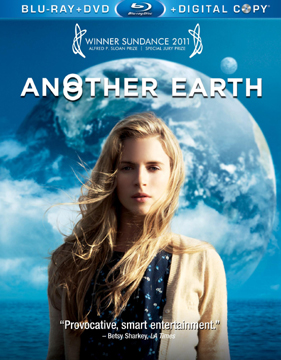
Courtesy of 20th Century Fox
young woman, moments before a violent automobile collision changes her life. Fascinated by astronomy, a radio news report about a newly discovered earth-like planet causes Rhoda (Brit Marling, who also co-wrote and co-produced the film) to take her eyes off the road and gaze into the night sky. That moment is enough to cause her to ram into another car. Two of its occupants are killed, and Rhoda goes to prison for four years. In the meantime, the new world has drawn ever closer to Earth, and a contest has been announced, the winner of which will join a space expedition to the mysterious planet — a planet which, incredibly, appears to be an exact replica of Earth. Rhoda enters the contest — in hopes of an escape from the tragedy that has shattered her life and (perhaps) a new beginning. She compares her self to the early expeditions on Earth, which were often “crewed by people living on the edge of life, the mad men, orphans, ex-convicts, like myself. As a felon, I’m an unlikely candidate for most things; but perhaps not for this. Perhaps I am the most likely.” But, Rhoda is still preoccupied with her past, growing obsessed with John (William Mapother), the university professor who survived the collision she accidentally caused but who lost his wife and child. (Rather annoyingly, Mapother’s character wears a pea-cap all the time, indoors and out — an inexplicable character tick that grates a tad.) Despite its sci-fi premise, “Another Earth” is really a psychological drama about a pair of damaged souls who are deeply wounded by their different roles (as wrongdoer and victim) in a life-altering tragedy. It has to do with second chances, the moments that change our lives (for good or ill), regrets, chance, curiosity, and causality. It’s an examination of the human psyche, which posits that we are the biggest mystery of all. It asks some big questions, like “what is real?” In the process, it alludes to great thinkers like Plato. It may lay-on the philosophizing a little heavy-handedly; but it is mighty refreshing to encounter a movie that cares about philosophical questions. Director Mike Cahill has fashioned a small, low-budget film that has no science fiction trappings at all, other than the eponymous mirror world in the sky. It’s a quiet story about two people struggling with guilt and unbearable loss. It’s low-key from beginning to end; but it gets under your skin with its convincing mix of characters and ideas. “Another Earth” won the Alfred P. Sloan Feature Film Prize and a Special Jury Prize at Sundance, where it was also a nominee for the Grand Jury Prize. It’s a shame the DVD doesn’t have a commentary by its director and leading lady.
“The Butcher, the Chef, and the Swordsman” (China/Hong Kong/USA, 2010) (B-): This satirical take on action dramas is made of up three interconnected stories. The opening section, “Desire,” is too zany for its own good — full of pratfalls, kooky characters, over-the-top action, self-consciously showy direction, and general buffoonery in the person of a loud-mouthed simpleton. Its characters even break into anachronistic pop music at one point. The other two sections — “Vengeance” and “Greed” — are thankfully less manic. In the former, a silent stranger enters service at a restaurant run by a diminutive chef and learns some wisdom into the bargain: “A swordsman’s blade only brings sorrow… Only a chef’s blade can bring joy.” Overall, the film is a mixed bag. It is obviously aiming for a combo-platter of zaniness, stylishness, and originality. But, the would-be artistry feels very self-conscious and forced at times; and it falls prey to a surfeit of kookiness and ostentatious ‘auteurism.’ Not for all tastes.
“Mr. Popper’s Penguins” (C-): The titular Mr. Popper is divorced, estranged from his kids, and preoccupied only with business (real estate acquisitions), till he gets a surprise gift from his long-lost father — in the form of six rambunctious penguins. The avian sextet take-up residence in his NYC apartment and the cool birds warm up Mr. P’s heart. It’s a sitcom premise, unpretentiously silly, that relies on slapstick and pratfalls. Jim Carrey’s schtik has long ago outworn its welcome: Indeed, we think the Canadian comedian has never been as funny as he thinks he is. This outing doesn’t set the bar very high, but it does manage to amuse in a mild way. There are far too many DVD extras for such a slight film. The interestingly named Ophelia Lovibond makes an impression as Pippi, an executive assistant who speaks only in alliteration.
“The Adjustment Bureau” (B-/B): Mysterious men in black hats intervene in human affairs to correct “deviations” from some master “Plan.” (Q) “What ever happened to free will?” (A) “You don’t have free will. You have the appearance of free will. Humanity just isn’t mature enough to handle the important things.” The love at first sight that arises between a promising politician (Matt Damon) and a dancer of contemporary ballet (Emily Blunt of “Young Victoria”) is just such a deviation. The two lovers are sure they’re meant to be together, but the mystery men disagree. And because the young man has accidentally “seen behind the curtain,” he is in danger. If he reveals what he knows about the outside manipulation of human affairs, he risks a complete “reset,” which will wipe his emotions, memories, and entire personality clean. But that doesn’t stop him from pursuing his one true love: “All I have are the choices that I make; and I choose her, come what may.” It sounds like a retread of “Dark City” and “The Matrix,” but, at its heart, this odd hybrid is a surprisingly witty and appealing romance, with ample chemistry and engaging banter between the couple. The stuff with the hat-men adds some mystery and suspense; but unlike the sinister antagonists of other films, these manipulators of human destinies (among them, Terence Stamp, Anthony Mackie, and John Slattery) are never really menacing, let alone malevolent. Instead, we occasionally see things from their point of view, which is often that of exasperated functionaries.
“Green Lantern” (D+/C-): Substandard super-hero fare hampered by a mediocre hero, an utterly uninteresting villain (in the form of a malevolent cloud!), a dull, uninspired story, casting that fails to connect (Ryan Reynolds, Blake Lively, and indie-fav Peter Sarsgaard hidden underneath “Elephant Man” makeup), and a tedious surfeit of empty digital effects. Marginally passable as a time-waster.
“Pirates of the Caribbean: On Stranger Tides” (C-/C): The fourth film in the series (the first without co-stars Orlando Bloom and Keira Knightley) is coasting on the roguish charms of Johnny Depp’s Captain Jack Sparrow. He’s still somewhat amusing (in fits and starts), but the series hasn’t had a story worth caring about since the first installment. Most have been sunk deeper than Davy Jones’ Locker by a wretched excess of special effects and overblown action sequences. The standout sequence here is the initial approach of some siren-like mermaids to sailors in a lifeboat, though, in due course, even that initially quiet, strange, and suspenseful scene succumbs to action and effects overkill. There’s one good line (from bit players): (A) “Come Papa, or we’ll miss the hanging.” (B) “It’s not a hanging, dear, it’s a trial. The hanging comes this afternoon.” But that’s not enough to support the weight of a peg-legged pirate. This series ought to have quit while it was ahead — immediately after the first (and only truly entertaining) film of the quartet.
“The Rite” (C/C+): A mortician’s son (Colm O’Donoghoe) decides to go to seminary. Four years later, he has graduated but intends to withdraw his intention to become a priest. But, his superior pressures him to take a two-month course in exorcism instead, complete with the film’s best line: “Two months in Rome. How bad could that be?” The result is a middle-of-the-road horror film — it’s not too scary, too gross, or too bad. Anthony Hopkins has eccentric charm as a Welsh Jesuit exorcist, though he and the story are less interesting after he himself becomes possessed. O’Donoghoe is okay, if unmemorable, as the protagonist. Ciaran Hinds makes an impression as a priest, as does Maria Gastini as a pregnant young woman who turns into a contorted snarling beast. Alice Braga and Toby Jones do well, and it is interesting to see Rutger Hauer (“Blade Runner”) as the lead’s father. The whole “mortician’s apprentice goes to seminary” plotline seems gratuitously odd — in a story supposedly “inspired” by real events. In the end, the low-key stuff is more interesting than the intrusions of the supernatural.
“Meet Monica Velour” (USA, 2010) (B/B+): Tobe (Dustin Ingram), a
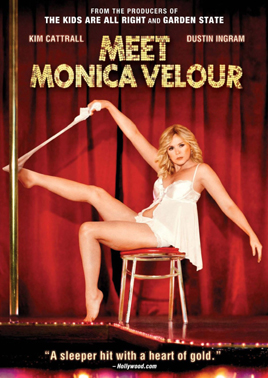
Courtesy of Anchor Bay
very awkward teen, goes on a cross-country road-trip to meet the titular Monica Velour (Canada’s Kim Cattrell, like we’ve never seen her before), a now long-retired porn star. The male lead is a bit like Canadian Michael Cera in “Youth in Revolt,” a bit like Canadian Jay Baruchel in “The Trotsky,” and a bit like Jesse Eisenberg in “Zombieland.” He’s smart, but he’s hopelessly geeky — awkward and sweet at the same time. In the best laugh of the film, the woman of his dreams (accurately) compares him to Jughead in the “Archie” comics, and he doesn’t take offense. Tobe has an oddly innocent crush on a much older woman — a former 1970’s vintage porn star who is now reduced to dire financial straights and a bitter fight for custody of her young daughter. (It’s not quite clear how Tobe’s interest in Monica can be so innocent, when he has devoted untold hours to watching her no-holds-barred sexual antics on celluloid.) Kim Cattrell is arresting in a gritty role; she’s a worldly-wise woman in somewhat squalid circumstances who still possess some pluck and humor. An appealing odd-couple relationship ensues, with strong supporting work by Brian Dennehy (as Tobe’s down at the heels grandfather) and especially by Keith David (as an eccentric artist). The result is very well-written — a bittersweet amalgam of coming of age story, odd couple friendship, road trip, and character-study that blends light humor with more serious moments: “This woman I’m with, she’s a mess. She’s angry all the time. It’s like she’s given up on things ever going right for her. It’s like the biggest problem she has is her.” Surprisingly good! For ages 18+: Coarse language, nudity, and sexual content.
“Priest” (C-/C): An animated prologue tells us that an order of warrior-priests (each with a cross tattooed on his/her forehead) turned the tide in an age-old conflict between humans and vampires; the remaining vamps have been confined to reservations, and the warrior-priests have been all but disbanded. Meanwhile, humanity lives in a theocracy-ruled urban dystopia, complete with automated confession booths (“God protects you, the Church protects you, the City protects you”). But assurances of safety have been greatly exaggerated; and one priest defies orders by leaving the city for the dessert wasteland top try to rescue his niece. Paul Bettany is disappointing in the title role. A good actor, he is miscast here. He seems to be channeling Clint Eastwood; he’s stiff, wooden, and none too convincing. Karl Urban is along for the ride as the chief villain: (“If you’re not committing a sin, you’re not having fun”), as are Maggie O, Cam Giganet, Lily Collins, Stephen Moyer (briefly on loan from a better vampire franchise, “True Blood”), and even Christopher Plummer, for heaven’s sake. In this notion of vampires, only the human-vampire hybrids look like traditional vampires (i.e. humans with fangs); the rest resemble huge, eyeless, carnivorous beats. Key plot elements parallel “The Searchers” (in which an Injun-hating John Wayne was determined to rescue his niece from Commanches, or kill her if she’d been ‘tainted’); but, in the end, it’s really all about the comic-book inspired action.
“The Long, Long Trailer” (1954) (B): Newlyweds Lucille Ball and Desi Arnaz embark on their honeymoon towing a 40-foot trailer across country, against the better judgment of hubby Arnaz. Mayhem ensues, putting strains on matrimonial bliss. At one point, a welcoming throng at a trailer park invites themselves over to greet the new arrivals. The result is amusing throughout, with a very funny segment involving a white-knuckled journey up a steep and narrow mountain highway. One of four films in the Turner Classic Movies Lucille Ball set.
“The Eagle” (B-/B): A prologue tells us that in 120 AD, the Roman 9th
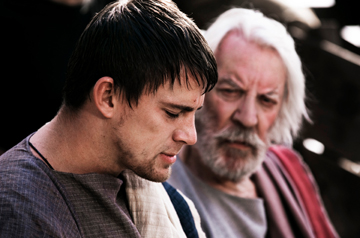
Channing Tatum & Donald Sutherland in "The Eagle" (courtesy of Alliance Films)
Legion entered the land of the Picts (present-day Scotland) and were never seen again. All 5,000 men were lost, along with their legionary standard, or eagle. The story opens 20 years later, as Marcus Flavius Aquila (Channing Tatum), an officer from Gaul arrives to take command of a garrison. His father was commander of the lost legion, and Marcus is intent on regaining his father’s lost honor. His instincts and courage soon save the garrison from attack; but he is badly wounded in the process. During his convalescence away from the frontier, Marcus saves the life of a slave, Esca (Jaimie Bell), who pledges to serve the Roman as a debt of honor. Marcus goes north of Hadrian’s Wall (where a guard asks, “Didn’t they tell you this is the end of the world?”) in quest of the fate of the lost legion with only Esca. The filmmakers use modern language but authentic-looking costumes and sets in a story, based on Rosemary Sutcliff’s novel “The Eagle of the Ninth,” that combines a redemptive quest with an unconventional friendship. The result (filmed in Hungary and Scotland) is better than expected, with good performances by the leads as well as Canada’s Donald Sutherland. It is refreshing to see as much (or more) attention paid to characterization as to action. Both of the DVD’s deleted scenes (a chariot race and a quiet conversation) ought to have been left in the film.
“Gulliver’s Travels” (C-): A modern-day Gulliver (Jack Black) works in the mailroom of a big city company before improbable misadventure lands him in Lilliput, where he has the stature of a giant — literally. He revels in being a big-shot for the first time in his life, even if his new persona is built on nothing more substantial than girth — and bogus braggadocio. Black indulges in much self-indulgent mugging, broad jokes about pop-culture, and way too many variations on his “School of Rock” stuff. Chris O’Dowd steals scenes as a pompously villainous general. This ever-so-slight comedy is an infantile take on Jonathan Swift’s 1726 biting social satire; it is utterly unsophisticated; but it generates a few laughs, and it isn’t an ordeal to sit through.
“The Trotsky” (Canada, 2010) (B/B+): An exceptionally bright high
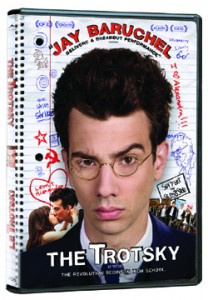
Courtesy of Alliance Films
school student named Leon Bronstein (winningly played by Canada’s Jay Baruchel) tells the world that he is the reincarnation of the Russian Marxist revolutionary Leon Trotsky and lives his life according to that completely impractical model. Leon is deeply earnest, dead-serious, and wildly idealistic; he also possesses a determination that brooks no compromise. He calls his father a ‘fascist landowner.’ His principal (one-time Stratford mainstay Colm Feore) offers Leon this choice: “You can spend your final year of high school in a war that you can’t win… or you can just float by and wreck havoc next year on someone’s poor, unsuspecting university. What’s it going to be?” There’s a pregnant pause, filled by a burst of Soviet patriotic music, before Leon replies, “I think the choice is obvious.” Leon never questions his destiny for a moment. His quiet certainty makes him a force to be reckoned with, and, as a policeman observes, “a serious shit disturber.” He may (or may not) be tragically deluded, but he is a definitely a study of individualism in action. Baruchel’s dead-pan earnestness makes Leon a memorable character and makes this movie a superior (and pleasantly unconventional) comedy! Domini Blythe and Liane Balaban appear in supporting roles.
“Skyline” (D): “It just doesn’t seem real,” says the lead in this disappointing alien invasion movie; and those words are truer than he knows. The film fails from the get-go. Its characters and script utterly never engage. We know next to nothing about these people; and, worse still, we don’t care about them. They grate, and that’s it. They possess no charisma whatsoever, and we are left with seventeen minutes of tedium before spheres of blue energy start raining upon a city from the night sky. The posters for the film’s theatrical release were intriguing. It showed the skyline of a modern city. But, when you looked closely, you could see hundreds of human figures being drawn helplessly upward into the sky to hovering alien machines. Things are far less interesting in the movie than the poster suggests. The marauding menaces are soon on the ground. Resembling a cross between the giant bugs of “Starship Troopers” and the medusa-like machines of “The Matrix,” they are monsters, or giant machines, or maybe a bit of both — and they eat human brains! (Good grief!) After less than 90 minutes, it all comes (none too soon) to a ridiculous non-ending. Skip it!
“Dirty Pretty Things” (U.K., 2002) (B+/A-): Inexplicably marketed as a suspense thriller, this film is actually an extremely well written, beautifully acted character drama. Set in London, England, it draws its dramatis personae from the ranks of that city’s illegal immigrants and refugee applicants — the invisible people whose precarious status renders them vulnerable to the worst kinds of exploitation and predation: “You’re an illegal… You don’t have a position here. You have nothing. You are nothing.” The story’s protagonist, Okwe (a dignified, sympathetic performance by the always interesting Chiwetel Ejiofor, of 2005’s “Serenity”) is in exile from his native Nigeria, where his life is in jeopardy. In Britain illegally, he drives a taxi by day and mans the front desk of a middling hotel by night. He’s fond of the Turkish chambermaid Senay (the enchanting Audrey Tautou, fresh from her delightful title role in 2001’s “Amelie”) who rents him a couch in her small flat. Her strict regard for propriety between the sexes means that he can only occupy said sleeping accommodation when she’s not in the flat. The supporting players — from Sophie Okenedo’s (“Hotel Rwanda,” “Scenes of a Sexual Nature,” and “The Secret Life of Bees”) Juliette, a no-nonsense prostitute who woks out of the hotel; to the Greek mythology reading, chess-playing Guo Yi (winningly portrayed by English-born actor Benedict Wong) who works at a hospital mortuary; to the gleefully shameless villain Juan (Spain’s Sergi Lopez, who was so chilling as the fascist captain in “Pan’s Labyrinth”), who divides his time between managing the hotel and running a high risk, high profit black-market business selling human organs from donors who are so desperate (for forged residency documents) that they’ll risk their lives in unsafe backroom operations. Even a Russian doorman, played by Zlatko Buric, makes an impression. These characters feel effortlessly authentic. A man of quiet integrity, intelligence, dignity, Okwe discovers a human heart in a plugged hotel toilet one night; he wants to report it to the authorities, but his illegal status in the country obliges him to remain silent. What is a good man to do when his own life and that of others may be jeopardized by doing the right thing? His friend tells him, “For you and I there is only survival. It is time you woke up from your stupid dream.” Meanwhile, his mirror-opposite and would-be tempter sneeringly tells him, “Stop acting like you have a choice… The whole world is wrong, except you Okwe?” Director Stephen Frears and writer Steven Knight have crafted a memorable, character-driven story that is also one of the very best films of 2002. It won the British Independent Film Awards for Best Film, Actor, Director, and Screenplay and was nominated for Best Supporting Actress (Okenedo) and Best Supporting Actor (Wong). It was an Academy Award nominee for Best Original Screenplay; and it got that same nomination, as well as one for Best British Film, at BAFTA. At the European Film Awards, it was nominated for Best Film, Actor, Screenplay, and Cinematography, and it won the Audience Awards there for Best Actress (Tautou) and Actor (Lopez). Don’t miss it! For ages 18+: Coarse language, sexual content, brief (mostly implied) sexual violence, and disturbing content. Note: “Dirty Pretty Things” is part of a three film set from Alliance that also includes Peter Jackson’s early psychological drama about a pair of a pair of disturbed teenage girls “Heavenly Creatures” and the 1998 Canadian film “Last Night,” which is a character study of six people on the eve of doomsday.
“Tangled” (A-): In Disney’s version of the Rapunzel fairy tale, the princess (voiced by Mandy Moore) with the golden locks is kidnapped as an infant by a witch (Voiced by Donna Murphy), who holds her unwitting captive in tower with only a newt for a friend. Rapunzel is turning 18; she is becoming a young woman; and she is getting restless “When will my life begin?” Meanwhile, her jailor pretends to be her mother in order to keep her captive under control and in captivity, for Rapunzel’s hair rejuvenates the witch. Disney’s 50th animated feature film has an engaging heroine, a cute (and non-talking sidekick in Pascal the newt), a rougish love-interest in the person of burglar Flynn Rider (voiced by Zachery Levi), and Rider’s foil — in the equine form of a horse called Maximus. But the film doesn’t need the songs: The early ones fail to impress; but some in the middle are quite a bit better — like the heroine’s song of freedom when she leaves the tower for the first time. Best of all is the moving love song, “All At Once Everything is Different, Now That I See You,” which is sung as thousands of floating paper lanterns fill the night sky. The film looks lovely, though at first the animation style used for its people seems somewhat plastic and doll-like. But the characters catch and hold the viewer’s sympathies, and their story brings tears to the eyes — with its elements of romance, dreams, and destiny achieved. Highly recommended!
“Gunless” (Canada, 2010) (C+): A brash, impulsive American gunfighter (Paul Gross) holes up in a quiet Canadian town (populated by Sienna Guillory, Graham Greene, Laura Bertram, and others) with an ensuing cultural clash, in a film that pokes fun at stereotypes of the neighboring nations. It looks like it is emulating James Garner’s western spoofs, though it’s not as good as them. It’s simple, silly, and kind of corny. But, it’s also rather cute and even a little bit charming. It works better on the small screen than it did at theaters precisely because it is a small, unassuming story. Fact is: it improves on a second viewing. Callum Keith Rennie is among the supporting players.
“Suck” (Canada, 2009) (C+): Vampires meet rock-and-roll in this darkly
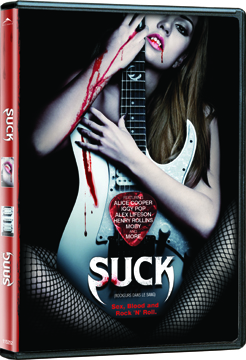
Courtesy of Alliance Films
comic tale of a rock band (made of up 30-something musicians who aren’t as young as they used to be) that’s run out of prospects. Even before they start get getting vampirized (i.e. changed into the undead), their ride is a hearse. Afterwards, they resolve that, “What happens on the road stays on the road.” The film plays as a combination of road trip, comedy, rockumentary, and horror flick. Lead player Peter Stefaniuk (who also wrote and directed this film) aimed for something “undeniably cool.” He may have fallen short of the mark, but he did manage a mildly amusing (and occasionally quite funny) film with a stylized look and comedic tone that pays some attention to characterization. (A) “I can read your mind.” (B) “What am I thinking of right now?” (A) “You’re afraid of being a loser the rest of your life. Too late for you, too late for the band. I would say you’re 30 pounds of junk food and a retail job away from killing yourself. Just a guess.” But it gets ghoulish and gory in a couple of scenes. The cast includes Stefaniuk, Jessica Pare, Dave Foley, Moby, and Malcolm McDowell; but the standouts are real-life rockers Alice Cooper and Iggy Pop, who are entertaining onscreen and have some very interesting things to say in the DVD interviews, coming across as rather thoughtful! Indeed, while the film rates only a C+; its fascinating featurette gets a B+. Warning: Coarse language and gore.
“Lesbian Vampire Killers” (U.K.) (C-/C): A narrator solemnly relates of a centuries-old battle, then dryly adds, “then he cut her effing head off.” That’s a nice off-beat moment that plays with the genre. Bright main titles emulate a graphic novel with head and shoulders pictures of the cast to the sound of music reminiscent of the old song “Monster Mash.” The visuals are inventive throughout, sometimes, for example, using captions like a comic book would. The film is silly fun, that’s only ever mildly amusing, as opposed to laugh-out-loud funny. It lags at times, but it also has moments of deliberate (and effective) ridiculousness. It’s a spoof on the vampire genre, retaining some of its tropes — such as a bevy of seductively dangerous (and bodacious) scantily-clad female vampires (red-blooded males are as apt to run toward Vera Filatova’s ‘Eva’ as away from her), numerous stakings, dark isolated settings, fog, and graveyards. As one cast member says, “It’s all there in the title.” Another describes it as “’Dawn of the Dead’ with tits.” It’s horror comedy and buddy movie, with a sexy tease for male viewers (though the actual nudity is very brief). It is a very good idea, whose execution falls short of its potential.
“Greenberg” (B-/B): Ben Stiller plays the recent victim of a nervous breakdown in this dark comedy. He is an inveterate writer of complaint letters, anxiety-prone, depressed, obsessive, uncomfortable in his own skin, and ill at ease around others. He’s also obnoxious and egotistical. In short, he’s not an easy man to warm up to. Can the pattern of his life change when a young woman (winningly played by Greta Gerwig) enters the picture? She seems to find something positive in this sorely dysfunctional soul: “I’m impressed by you…You seem really fine doing nothing. It’s like you don’t feel the bullshit pressure to be successful… I mean, by other peoples’ standards.” (She seems sincere, though, frankly, that would strike most of us as pretty damning praise.) As unlikable as his character is, Stiller keeps the faintest glimmer of sympathy alive for this self-destructive man. But, my, oh my, it is a faint glimmer. That’s a problem as far as our engaging with the character is concerned. Too often, we wonder if he deserves to get the girl. She’s an overly self-effacing but sweet personal assistant (and nanny) to his brother’s family. The pair are attracted and repelled in fits and starts. The awkwardness of their incipient relationship and Gerwig’s vulnerable performance lend things a certain charm. But the jagged personality of the male lead throws cold water on any hopes for outright romantic redemption. With Rhys Ifans and Jennifer Jason Leigh.
“Coraline” (B+): The story of a young girl ensnared in a destructively
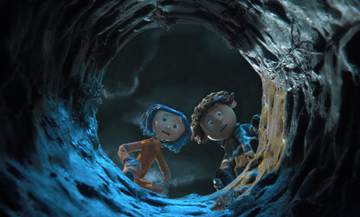
Through the proverbial looking-glass in "Coraline" (Courtesy of Alliance Films)
appealing alternate version of her own reality is brought to life with stop-motion animation. Both the story and the visuals are remarkably inventive and original. Like a classic fairy tale, there’s real danger and darkness at the heart of things, with an “Other Mother” who wants to sew buttons into the eyes of a flesh and blood girl. Writer/director Henry Selick also directed “The Nightmare Before Christmas,” and both films share a sense of strangeness and other-worldliness. The two-disc edition has 2-D and 3-D versions of the film, though the latter doesn’t seem to work on the standard television set employed (with provided glasses) employed by this reviewer.
“The Guitar” (USA, 2008) (B): “I changed everything.” Diagnosed with

Courtesy of Alliance Films
inoperable cancer, Melody (Saffron Burrows) is given a month or two to live. Then, she gets fired from her job and dumped by her boyfriend — all in the first eight minutes of the film. But she seems detached and numb, without much reaction to any of these severe blows. Instead of killing herself, she impulsively decides to rent a large loft. Once installed there, she orders take-out food, throws stuff (including her clothing) out the window (shedding her past life in the process, one assumes), and goes au natural for awhile, occupying herself with ordering new stuff on a yellow banana phone. Meanwhile, she cradles her guitar like a child — or a lover — and tells a visitor, “If you come back, just come back for the moment. That’s all there is.” The objects she acquires whisper to her in the strange language of objects, giving her some kind of hope of redemption. Fate takes a hand when she follows some guys with guitars, does some buskering in a park, and joins a band. “The Guitar” is a prototypically “small” movie, directed by Amy (daughter of Robert) Redford. It’s the character-study of a woman who is coming to terms with her life and her mortality. She finds what she was denied (in flashback) as a child and discovers that it’s never too late to chart a new course. Warning: Nudity, sexual content, and coarse language.
“Defendor” (Canada, 2009) (B/B+): “Look out termites. It’s squishing time!” Arthur (Woody Harrelson) is a simple man — unsophisticated in intellect but uncompromised in integrity — who is a humble public works employee by day (he holds traffic signs) and a self-styled superhero by night. His alter-ego, Defendor, who is adorned in a mishmash of hockey gear and duct tape, doesn’t have any superpowers, or any time for firearms (“Guns are for cowards”). Instead, he prefers bees, marbles, a WWI trench club, and the advantage of surprise. A man-child in many ways, he’s a simple soul, but also an honest, kind, good-hearted one — driven both by a benevolent desire to help others and a need to rise above the limitations that inhibit all of us: (Q) “Why do you dress up as a superhero?” (A) “Cause superheroes aren’t stupid, they’re not afraid, and when I’m Defendor, I’m not either anymore. I’m a million times better.” Woody Harrelson is on a roll these days, with memorable work in “Zombieland,” “The Messenger,” and now “Defendor” all appearing in the space of a few months. Here, he creates a figure who is a little comical, a little pathetic, and very admirable: “You were just a regular guy doing something remarkable. You don’t need a costume. Ordinary people, they do extraordinary things all the time. You’re always going to be that her… just by being yourself.” The result is a film that, surprisingly, is more poignant character study than it is comedy or action film, though it contains elements of all those things. Set in an unnamed Hamilton, Ontario, it has a nice mean-streets atmosphere, solid supporting work by Michael Kelly, Sandra Oh, Kat Dennings, Lisa Ray, and Elias Koteas, and an original quirky sensibility all its own. There’s a good assortment of DVD extras. Written and directed by Peter Stebbings. For ages 18+: Abundant very coarse language.
“The Young Victoria” (U.K./USA, 2009) (A-): Victoria: “Do you ever
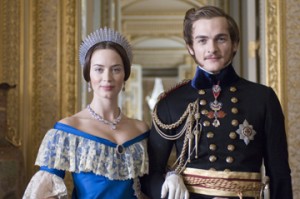
Emily Blunt & Rupert Friend in "The Young Victoria" (courtesy of Alliance Films)
feel like a chess piece… in a game being played against your will?” Albert: “Then you had better master the rules of the game until you can play it better than they can.” That exchange between the young woman who went on to become the longest reigning monarch in British history and the German prince who became the great love of her life sets the tone for this historical romance. Canadian director Jean-Marc Vallée ventures into very different territory here, compared to his past work, and he succeeds admirably. It’s a lavish recreation of its time (1838 and thereafter) and place, winning an Oscar for Best Costumes. But, it’s not just pretty to look at. Emily Blunt captures our interest and sympathies as the ‘chess piece’ who’s determined to have a will of her own; Rupert Friend is quite disarming as the unexpectedly sweet and genuine Albert; and supporting players like Paul Bettany, Miranda Richardson, Jim Broadbent, and Mark Strong also help give these characters nuance and heft. In short, it’s an engaging, character-driven romance from beginning to end — and one of the best films of 2009. There’s a nice array of DVD extras, though, alas, no commentary.
“Moneyball” (USA, 2011) (B+): Based on a true story, “Moneyball” is about an odd couple of impromptu colleagues who turn conventional
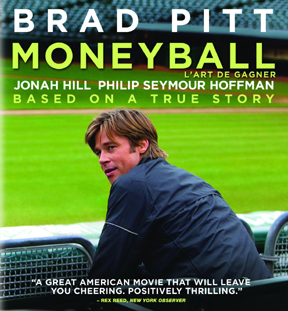
Courtesy of Sony Pictures
thinking on its ear by daring to think outside the box. (How’s that for a sentence chock full of colloquialisms?) Billy Beane (Brad Pitt) showed great promise as a baseball player when he was a teen. Drafted by the professional leagues, he abandoned his education (a full scholarship at Stanford University), only to fizzle as a ballplayer. Now, in his 40’s, he’s the General Manager of a third-rate team, the Oakland A’s. Starved for cash, it keeps losing its best players to teams with deeper pockets. “There are rich teams, and there are poor teams, then there’s fifty feet of crap, and then there’s us. It’s an unfair game. And now we’ve been gutted — organ donors for the rich…” But Beane embarks on a radical change, convinced that the 20-something Yale economics graduate, Peter Brand (Jonah Hill), whom he meets by chance, is on to something with his new way of analyzing statistics to evaluate players. It’s not a glamorous approach, but it does offend the status quo, insofar as it replaces the tried and true objective of “buying players” with the subtler objective of “buying wins.” Beane butts heads with his staff (key members of whom are played by Philip Seymour Hoffman and Ken Medlock); but he remains adamant: “We’ve got to think differently. We are the last dog at the bowl. You see what happens to the runt of the litter? He dies.” Although it is set in the world of professional baseball, “Moneyball” is not restricted in its appeal to sports fans. On the contrary, its appeal lies in it being an underdog story, as Beane and Brand set out to assemble a championship team from a pool of players whom others undervalue, “like an island of misfit toys.” Its two protagonists are as unlikely a pair of allies as one could imagine, each of them struggling with their own failure to “fit in” or achieve others’ expectations. That’s especially true of Pitt’s character: His heritage has been one of failure and unfulfilled promise; and it is a heritage that both propels him and holds him back. We hear the words of a commentator writing-off young Billy’s prospects as a ballplayer: “There’s not an organization in baseball who would not have taken a chance ion this young guy. He didn’t pan out. It happens every year. Some do, some don’t… Few scouts can go into the mind of a young man and determine whether he’s really confident about what he can do. So you can sign him based on his ability, but then he’s got to be successful to be confident. And once he becomes confident, that’s when you’ve got something. You make a decision on what you see; and things don’t pan out; and you move on. That’s baseball. Many are called; few are chosen.” But, for the filmmakers, baseball is a metaphor for life; and those for whom things don’t seem to “pan out” may be ‘down’ without indeed being ‘out.’ “Moneyball” has a nice redemptive undercurrent; and it’s hard not to root for those who dare to challenge the powers that be! The film is more character study than it is a baseball movie (sports footage is used sparingly) and Pitt and Hill do solid work, as do the supporting players already mentioned and Kerris Dorsey in a small role as Beane’s young daughter Casey. “Moneyball” has earned critical acclaim. It won Best Actor from the National Society of Film Critics; and it is a nominee as Best Film, Actor, Supporting Actor, and Screenplay at this year’s Golden Globes. For ages 18+: A few instances of coarse language.
A song called “The Show” gets prominent play in the film on two separate occasions. In the movie it is sung by Kerris Dorsey. Co-written by the Australian singer-songwriter Lenka, the song is on this reviewer’s hit-list — along with its original fetching singer from Down Under (and her arched left eyebrow!):
http://www.metacafe.com/watch/sy-1778578953/lenka_the_show_official_music_video/
“Mother of Mine” [“Aideista Parhain”] (Finland/Sweden, 2005) (B+/A-): During the Second World War, Sweden, which was neutral during the war, offered sanctuary to children from Finland, which was at war with
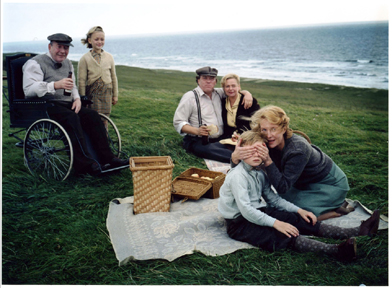
"Mother of Mine" (courtesy of Film Movement)
the Soviet Union. More than 70,000 “war children” were given temporary homes with Swedish families (much as some English children were evacuated to the countryside from London during the Blitz). The film is the story of just one of them, a nine-year old boy named Eero (Topi Majaniemi) who is relocated against his will from his widowed mother, Kirsti (Marjaana Maijala) to a Swedish couple. His new foster father Hjalmar (Michael Nyqvist, the male lead in “The Girl with the Dragon Tattoo” and its sequels) is sympathetic and kind; but his wife Signe (Maria Lundqvist) is cold and brusque to her new charge. The foster arrangements prove difficult for all concerned, as the characters struggle with issues of loss, resentment, and the need for acceptance. On a very intimate level, the film asks us to consider what family means? Is it a word only for those to whom we are related, or more generally for those we love, or does it extend further still — to those for whom we are called upon to exercise responsibility and care? “You think everything’s fine. But it isn’t. I don’t know that kid. I don’t know who he is! Just a stranger. How could I be a good mother to a child I don’t want?” Must the emotional scars we bear dog us all our days, especially when they have been incurred early in life and have fundamentally 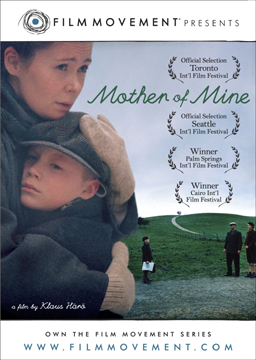 undermined our sense of security: “I could never believe what you said. I thought you’d disappear at any moment. ” Or, can we learn to trust again? Director Klaus Haro’s film is a quiet, gentle story of a boy caught between two prospective mothers; it treats us to some poignant, even very moving moments, though on occasion it briefly skirts the borderlines of melodrama. That dichotomy is reflected in the musical score, which evokes strong emotion when it is orchestral but grates a little when it is reduced to a lachrymose (and repetitive) solo piano. Repeatedly showing us two of the characters much later in life (the film makes substantial use of flashbacks) is another distraction. A far better course would have been to leave the present-day section of the story to a single afterward at the end of the film. Those small qualms aside, this is a gorgeous-looking film, and it offers several award-caliber performances. At Finland’s Jussi Awards, it won Best Actress (Maria L.), Cinematography, and Set Design. It also won Best Actress (Maria L. again) at Sweden’s Guldbagge Awards, where Michael N. was nominated as Best Supporting Actor. And it was nominated for Best Original Score at the European Film Awards.
undermined our sense of security: “I could never believe what you said. I thought you’d disappear at any moment. ” Or, can we learn to trust again? Director Klaus Haro’s film is a quiet, gentle story of a boy caught between two prospective mothers; it treats us to some poignant, even very moving moments, though on occasion it briefly skirts the borderlines of melodrama. That dichotomy is reflected in the musical score, which evokes strong emotion when it is orchestral but grates a little when it is reduced to a lachrymose (and repetitive) solo piano. Repeatedly showing us two of the characters much later in life (the film makes substantial use of flashbacks) is another distraction. A far better course would have been to leave the present-day section of the story to a single afterward at the end of the film. Those small qualms aside, this is a gorgeous-looking film, and it offers several award-caliber performances. At Finland’s Jussi Awards, it won Best Actress (Maria L.), Cinematography, and Set Design. It also won Best Actress (Maria L. again) at Sweden’s Guldbagge Awards, where Michael N. was nominated as Best Supporting Actor. And it was nominated for Best Original Score at the European Film Awards.
The DVD’s accompanying short film is “Uncle” (Australia, 1996) (B/B+), written, animated, produced, and edited by Adam Benjamin Elliot. It’s the biography of a humble old man, his lemon tree, his over-cooked crumpets, and his pet chihuahua named Reg. The six-minute film has won awards at more than a dozen film festivals, including the Aspen International Shortfest Prize. Its simple theme has something in common with the main feature, namely that, “Life can only be understood backwards; but we have to live it forwards.”
“Rich in Love” (USA, 1992) (A): “One afternoon last May, my life veered from its day-in, day-out course and became for awhile the kind of life that
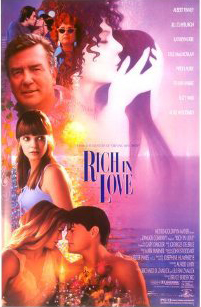
courtesy of MGM
can be told as a story…” The opening words in this film are spoken by film’s protagonist — the plucky, precocious, and perspicacious Lucille Odom, a teenage girl in her senior year of high school who is also on the threshold of becoming a young woman. Lucille is a wry observer of the world around her, as aware of her own foibles as she is of her family’s eccentricities. But her family’s life is thrown into utter confusion by the abrupt defection of one of its members. Lucille returns home from school one day to find that her mother has deserted them, without warning, leaving only a cursory note of farewell. But Lucille is a take-charge sort of person, and her first act is to re-write her mother’s note, to soften the emotional blow on her father. What unfolds from there is the tale of a family that is forced to veer from its accustomed path in life. (A) “I must tell you, I’m knocked off my perch, completely knocked off my perch by this… I suspected nothing. I thought we were happy…” (B) “I thought we were happy, too, Papa.” As quick on her feet as Lucille is, she resists change: “I just want things back to normal; that’s all I want.” But, as someone points out, “Normal’s a problem… it keeps changing on you.” “Rich in Love” is a beautiful film, full of poignancy, humor, gentleness, and deep affection for its family of characters: “You think you’re so virtuous Lucille, but it’s your form of vanity.” There is great warmth here, as well as a bittersweet nostalgia about the coming of age we all experience. The power of fiction — be it in print or on celluloid — springs, in the main, from two things — the ability of its story to capture our interest and the ability of its characters to capture our sympathies. “Rich in Love” does both — admirably. Based on the wonderful 1987 novel of the same name by Josephine Humphreys, it is set in Charleston, South Carolina; and it embodies the rhythms and atmosphere of the south with sublime authenticity. The stellar ensemble cast deliver a slew of award-caliber performances, with Kathryn Erbe a sheer brilliant revelation as Lucille, the girl on the verge of adulthood who discovers that she has ‘a lot of love in her.’ Albert Finney is equally good as her father Warren, as are Suzy Amis as her flamboyant older sister Rae, Kyle MacLaclan as Rae’s new (and northern) husband Billy McQueen, the always intensely watchable Alfre Woodard as Rhody, a family friend, and Piper Laurie and Ethan Hawke as other characters in orbit of this quirky family. Only Jill Clayburgh, in a supporting role, as the errant wife and mother Helen, fails to fully engage our sympathies; but, then, she does play the role of the one who deserts the others. The screenplay for “Rich in Love” was adapted by Atlanta-born Alfred Uhry who won a Pulitzer Prize for his play “Driving Miss Daisy” and went on to earn an Academy Award for his screenplay of that same story. The late Georges Delerue (1925-92) delivers a beautifully lyrical and poignant score; and Australian-born Bruce Beresford (“Mao’s Last Dancer,” “Driving Miss Daisy,” and “Breaker Morant”) directed the film. “Rich in Love” came and went without notice in 1992; and that’s a great shame. It was easily one of the best films of the year, and perhaps of the decade, and it deserves to be appreciated as such. Perhaps the biggest mystery of all is why the film has yet to be released on DVD!! It is available only in VHS, but it is highly recommended!
“Sarah’s Key” [“Elle s’appelait Sarah”] (France, 2010) (B): On July 16 & 17, 1942, French police rounded up 13,000 of their compatriots (French men, women, and children who also happened to be Jewish) and handed 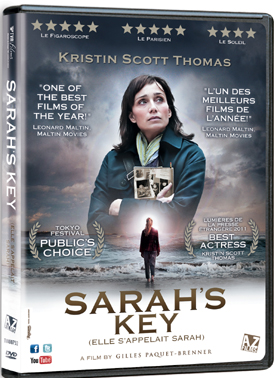 them over to their Nazi overlords in the notorious “Vel d’Hiv” round-up. That shameful instance of actively collaborating with evil took its name from the Velodrome d’Hiver (or ‘Winter Velodrome’), the cycling stadium in Paris in which the thousands of people were confined — in inhuman conditions — before their transportation (in stages) to Auschwitz for extermination. In all, occupied France cooperated with the Nazis by sending 74 trains to Auschwitz, carrying 76,000 French Jews to their slaughter — innocents who were never seen again. This new character drama concerns just one of them, a 10-year old girl named Sarah (winningly played by Melusine Mayance), whose precocious resourcefulness enables her to size up the situation and act when the authorities come to collect her family. She secrets her younger brother away in a locked closet to protect him, only to realize later than she won’t be going back to let him out. Sarah is desperate to get back to her brother, realizing that her brave action to save him will inadvertently seal his doom if she doesn’t find a way back to him soon. The film intersperses Sarah’s story with that of Julia (Kristen Scott Thomas), a journalist in 2009 who is about to move into the Paris flat that has been in her French husband’s family sine August 1942 — mere days after its original occupants (Sarah and her family) were taken to their deaths. Julia is determined to learn the truth — about Sarah’s fate and how much her husband’s family knew about those vile events: “I wanted to know the truth… [It] often [has] a high price.” The result is a story about consciences in conflict, a story, based on the popular novel by Tatiana de Rosnay, that spans 67 years. It offers solid performances and touching moments, with a take on the Holocaust that is more personal and more focused on the conventions of a mystery and suspense drama than other stories set in the same dark period. It is a story about someone who becomes what one character calls “the saddest person I ever met.” But it is also a story about courage and determination. The only DVD extra is the film’s trailer. Surprisingly, the DVD’s English subtitles are badly flawed, even amateurish, at times, either translating the French dialogue incorrectly or clumsily ignoring the basics of English grammar.
them over to their Nazi overlords in the notorious “Vel d’Hiv” round-up. That shameful instance of actively collaborating with evil took its name from the Velodrome d’Hiver (or ‘Winter Velodrome’), the cycling stadium in Paris in which the thousands of people were confined — in inhuman conditions — before their transportation (in stages) to Auschwitz for extermination. In all, occupied France cooperated with the Nazis by sending 74 trains to Auschwitz, carrying 76,000 French Jews to their slaughter — innocents who were never seen again. This new character drama concerns just one of them, a 10-year old girl named Sarah (winningly played by Melusine Mayance), whose precocious resourcefulness enables her to size up the situation and act when the authorities come to collect her family. She secrets her younger brother away in a locked closet to protect him, only to realize later than she won’t be going back to let him out. Sarah is desperate to get back to her brother, realizing that her brave action to save him will inadvertently seal his doom if she doesn’t find a way back to him soon. The film intersperses Sarah’s story with that of Julia (Kristen Scott Thomas), a journalist in 2009 who is about to move into the Paris flat that has been in her French husband’s family sine August 1942 — mere days after its original occupants (Sarah and her family) were taken to their deaths. Julia is determined to learn the truth — about Sarah’s fate and how much her husband’s family knew about those vile events: “I wanted to know the truth… [It] often [has] a high price.” The result is a story about consciences in conflict, a story, based on the popular novel by Tatiana de Rosnay, that spans 67 years. It offers solid performances and touching moments, with a take on the Holocaust that is more personal and more focused on the conventions of a mystery and suspense drama than other stories set in the same dark period. It is a story about someone who becomes what one character calls “the saddest person I ever met.” But it is also a story about courage and determination. The only DVD extra is the film’s trailer. Surprisingly, the DVD’s English subtitles are badly flawed, even amateurish, at times, either translating the French dialogue incorrectly or clumsily ignoring the basics of English grammar.
“Protektor” (Czech Republic, 2009) (B+/A-): “A Czech is a cyclist who hunches over as he pedals.” That curious observation, attributed to Adolf Hitler, is quoted on-screen at the opening of this strange, highly original,
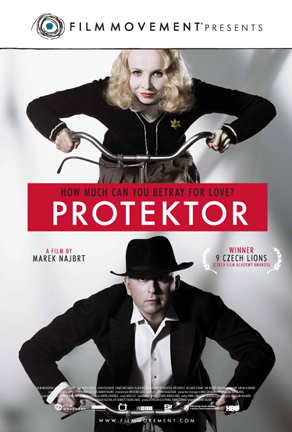
Courtesy of Film Movement
sometimes surprisingly playful film about a man and a woman in Prague before and during its occupation by Nazi Germany. And bicycles figure prominently in the film — whether in scenes of characters pedaling determinedly or in close-ups of bicycle spokes turning with ominous relentlessness. The revolving spokes may connote the passage of time, or they may stand for change (be it good or ill) that is represented by movement, or they may signify hapless mortals on metaphorically stationary bicycles — restlessly spinning their wheels without actually moving at all. The film’s title, in part, is an allusion to the ruthless German overlord (or ‘Deputy Protector’) of the occupied Czech lands, Reinhard Heydrich, who is assassinated off-screen about two-thirds of the way through the film. But the story is not his. Rather, it is the story of Hana (an award-caliber
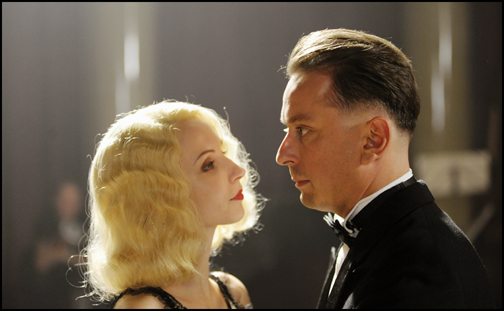
Jana Plodkova (Hana) & Marek Daniel (Emil) in "Protektor"
performance by the mesmerizing Jana Plodkova) and Emil (a low-key study in extemporizing and moral compromise by Marek Daniel). When their story opens, in 1939, she’s an acclaimed film star — beautiful, seductive, popular, and feted by the who’s who; he’s a radio journalist who is colorless next to her radiance. But invasion turns those roles on their heads: Hana is Jewish and suddenly finds herself ostracized by society and film business colleagues alike. For his part, however, Emil profits from the downfall of an on-air counterpart and soon finds himself the primary Czech radio mouthpiece for the Nazi invaders. Just as the surrendering Czech government cites the promise of protection it received from the Nazis in exchange for capitulating, so Emil promises to protect his now outcast and endangered wife. But his motives may be mixed and not as selfless and noble as a more conventional narrative would have it: “You’re actually happy about it,” suggests Hana. “No need to be jealous anymore.” The pair are locked in a paradoxical embrace: As one’s fortunes plummet, the other’s are in the ascendancy. The result is a fascinating study of two human personalities whose relationship, one to the other, undergoes a profound reversal of roles. It’s a story about complexly mixed motivations, it is an up-close-and-personal look at how different people choose to react in the face of evil (and why), and it is a journey down the slippery slope from capitulation to compromise to outright collaboration. Director and co-writer Marek Najbrt combines a retro-look (at times the film feels like it was shot in the era it depicts) with an unexpected douse of sheer whimsy (courtesy of an idiosyncratic musical score and some quasi-surrealistic use of visual imagery). The result is a highly original look at two conflicted characters, neither of whom fits easily into categorization as brave or cowardly, selfish or noble, steadfast or disloyal. “Protektor’ won nine awards at the Czech academy awards, among them Best Film, Director, Actress, Screenplay, Music, and Editing. For ages 18+: Brief sexual content and nudity. [Note: As of November 2011,“Protektor” is only available in Canada to Film Movement’s film club members; the company will make it available on an a la carte basis to non-members a few months hence.]
“I Was a Child of Holocaust Survivors” (Canada, 2010 (B+) [DVD extra accompanying the feature-length film “Protektor”] A gentler, more nostalgic kind of whimsy infuses this animated adaptation of Bernice Eisenstein’s memoir. Eisenstein herself gives voice to the narrator, her 11-year-old self in 1961, as she describes her “hallucinatory entry into the world of ghosts” represented by the painful memories of her loved ones’ ghastly experiences in the concentration camps of Nazi Germany. It’s a story about memory, loss, and love, presented in a fanciful fashion, thanks to the lively, inventive animation for which the National Film Board of Canada is so justly acclaimed. It has one thing in common with “Protektor,” from which it otherwise differs profoundly in tone, and that is its sense of duality, for its young protagonist is at once “curst and blest, black and white and shadowed.” This 15-minute short film was written and directed by Ann Marie Fleming.
“Water for Elephants” (B-/B): “I had a good life, a big life,” says an old man (very nicely played by Hal Holbrook) at the start of this adaptation of Sara Gruen’s novel. And then we return to Depression-era America to see
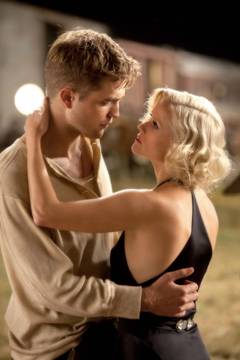
Robert Pattison & Reese Witherspoon in "Water for Elephants" (courtesy of Fox)
the pivotal moments that set a young man’s life on its course. At first, the future looks bright and sure for Jacob. He’s one exam away from finishing his studies in veterinary science at Cornell; but, sudden tragedy sweeps his plans aside and set him adrift. He jumps a train one night and finds himself in the midst of a traveling circus. It’s an exotically alien place where his instincts (and interrupted training) for animal care come in very useful; and he is signed-on by the company’s mercurial boss, August. The boss is an intense and charismatic figure; but he is also ruthless, tyrannical, and prone to rage when crossed. Christoph Waltz, the Austrian actor who won an Academy Award for his work in “Inglourious Basterds,” delivers another memorable performance here; he is easily the best thing in the movie. He may be the villain of the piece, but he’s an exceptionally compelling one: “You know how a circus survives? On blood, sweat, pain, and shit… Your heart goes out to an animal suffering; well, that’s noble and that’s good. But what it tells me is that you never saw men suffering.” August’s feelings of love and pride in his wife, the show’s main attraction, Marlena (how nice it is to see Reese Witherspoon in a non-comedic role for a change), sometimes run to a sense of ownership, and the arrival on the scene of a handsome younger man whom he initially treats as a protégé soon turns August’s 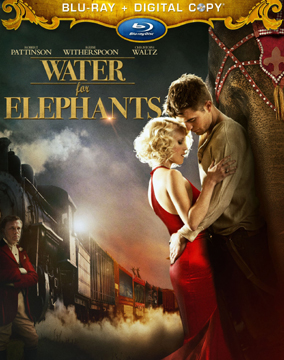 possessiveness to fierce jealousy. British actor Robert Pattison is best known for his stiff and stolid portrayal of the (allegedly) ‘romantic’ vampire in the “Twilight” film series so beloved by tween-aged girls. He’s much better here, doing serviceably well in the role of a decent young man smitten with another man’s glamorous wife. But the real acting chops come courtesy of Christoph and Holbrook; and one of the film’s highlights is an opening montage of scenes showing the setting up of tents and snippets of various big-op acts — scenes that are nicely evocative and nostalgic, even if you’re not a circus-buff. Irish character actor Jim Norton also makes a strong impression in a supporting role as Camel, an aging Polish-American roustabout who’s had a few drinks too many but retains a kind heart. The film works as a love story and drama, benefiting from its unusual setting, its resident elephant Rosie, and its thematic collision between innocence and the sort of cynical human hardness that takes no prisoners. For ages 16+: One brief sexual scene. DVD extras include a commentary with the director and writer.
possessiveness to fierce jealousy. British actor Robert Pattison is best known for his stiff and stolid portrayal of the (allegedly) ‘romantic’ vampire in the “Twilight” film series so beloved by tween-aged girls. He’s much better here, doing serviceably well in the role of a decent young man smitten with another man’s glamorous wife. But the real acting chops come courtesy of Christoph and Holbrook; and one of the film’s highlights is an opening montage of scenes showing the setting up of tents and snippets of various big-op acts — scenes that are nicely evocative and nostalgic, even if you’re not a circus-buff. Irish character actor Jim Norton also makes a strong impression in a supporting role as Camel, an aging Polish-American roustabout who’s had a few drinks too many but retains a kind heart. The film works as a love story and drama, benefiting from its unusual setting, its resident elephant Rosie, and its thematic collision between innocence and the sort of cynical human hardness that takes no prisoners. For ages 16+: One brief sexual scene. DVD extras include a commentary with the director and writer.
“Snow Flower and the Secret Fan” (China/USA, 2011) (B+): Director Wayne Wang made a strong impression with his emotionally powerful 1993 film “The Joy Luck Club.” He returns to related territory here, with two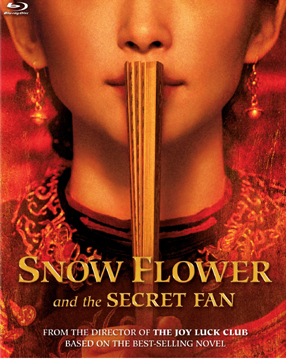 mirrored stories separated by 182 years about the close bonds between women based on the novel by Lisa See. In China’s Hunan Province of 1829, two young girls are brought together in the “laotong” vow, in which they promise each other lifelong affection and learn the coded “nu shu,” a secret language known only to them which is intended to underpin the intimacy of their bond: “I can still feel your heart in your words.” What begins as ceremonial becomes heartfelt, as Lily and Snow Flower forge a tangible sisterly bond that rises to platonic love; as the years pass that bond sees them through separation, marital troubles, plague, war, and unexpected reversals of fortune. Meanwhile, in present-day Shanghai, two thoroughly modern young women, Nina and Sophia, find their own commitment to be “sworn sisters for life” tried by the divisive vagaries of life. The film thus has two separate storylines, each of them jumping backward and forward in time. At first, that non-linear form of storytelling may pose a small
mirrored stories separated by 182 years about the close bonds between women based on the novel by Lisa See. In China’s Hunan Province of 1829, two young girls are brought together in the “laotong” vow, in which they promise each other lifelong affection and learn the coded “nu shu,” a secret language known only to them which is intended to underpin the intimacy of their bond: “I can still feel your heart in your words.” What begins as ceremonial becomes heartfelt, as Lily and Snow Flower forge a tangible sisterly bond that rises to platonic love; as the years pass that bond sees them through separation, marital troubles, plague, war, and unexpected reversals of fortune. Meanwhile, in present-day Shanghai, two thoroughly modern young women, Nina and Sophia, find their own commitment to be “sworn sisters for life” tried by the divisive vagaries of life. The film thus has two separate storylines, each of them jumping backward and forward in time. At first, that non-linear form of storytelling may pose a small
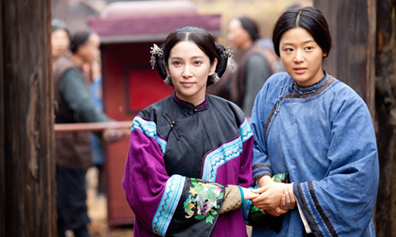
Li Bing Bing (as Lily) & Gianna Jun (as Snow Flower) in "Snow Flower and the Secret Fan" (courtesy of Fox Searchlight)
challenge to the viewer; but soon enough it becomes clear what is happening in each of the two mirrored storylines. The interconnection of the two tales — one to the other — also becomes evident late in the film. What took this reviewer by complete surprise, however, was the revelation that the same two actresses play the four roles, with Chinese actress Li Bing Bing playing both Nina and Lily, and South Korean actress Gianna Jun playing both Snow Flower and Sophia. The leading players so disappear into their roles that it was impossible to guess that they each played double roles. Composer Rachel Portman contributes a very fine score, music that is as exquisitely emotional as her score for the aforementioned “Joy Luck Club.” The score’s swelling violins match the poignancy of the scenes set in the 19th century. In the end, the historical part of the film is the most compelling. Its poignant depiction of enduring love (the “things of the heart that will never change”) and self-sacrifice is guaranteed to bring tears to your eyes. For ages 16+: One mild sexual scene. The DVD has a feature about the making of the film.
“Beautiful Boy” (USA, 2010) (B/B+): This emotional pressure-cooker of a film opens and ends with a voice-over narrator reading these poignant
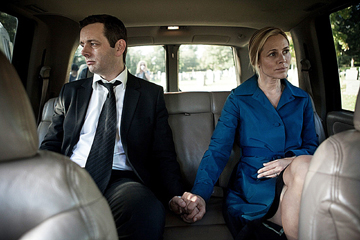
Michael Sheen & Maria Bello in "Beatiful Boy" (courtesy of Anchor Bay)
words: “As the boy and the girl ran out of the station wagon , the beach was happy. It was happy to have their small footprints on it; it was happy to have holes dug with plastic shovels; it was even happy to have paper wrappers blowing about after they’d gone. But the beach knew there would no longer be this to look forward to — no more careless play, only lonely snowfalls to mark the beginning of an endless winter. The beach loved the boy and the girl, though it had no way of telling them that this was their last time together. Things would be different from now on. They didn’t know if they would be better or worse, but for certain things would change.” Change things do for Kate (Maria Bello) and Bill (Michael Sheen) after a terrible, shocking tragedy overtakes their small family. In the midst of inconsolable loss, they’re 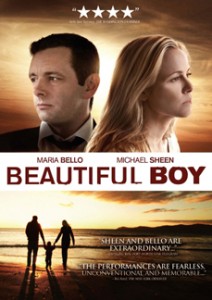 forced to contend with guilt, recrimination, and relentlessly nagging doubt: “Did we do something? Did we not do something?” Surprisingly subdued for most of its run, the story is an up-close-and-personal examination of two people who are struggling to suppress a tangle of complicated emotions, acute anguish being one of them. But the slowly building pressure finally explodes in an intensely emotional scene that’s full of raw pain. Korean-American director and co-writer Shawn Ku has fashioned a restrained and intelligent story about a pair of lives in crisis; and its two antagonists deliver award-caliber performances in a subtle pas de deux that encompasses both the deepest despair and the possibility of hope. Bello recently appeared in the stellar “The Company Men” and Sheen (who appears here without his British accent) has played roles as diverse as Tony Blair, David Frost, and the charismatic lead lyncanthrope in the “Underworld” series. DVD extras include two deleted scenes and a thoughtful commentary. For ages 18+: Coarse language, brief nudity, and brief sexual content.
forced to contend with guilt, recrimination, and relentlessly nagging doubt: “Did we do something? Did we not do something?” Surprisingly subdued for most of its run, the story is an up-close-and-personal examination of two people who are struggling to suppress a tangle of complicated emotions, acute anguish being one of them. But the slowly building pressure finally explodes in an intensely emotional scene that’s full of raw pain. Korean-American director and co-writer Shawn Ku has fashioned a restrained and intelligent story about a pair of lives in crisis; and its two antagonists deliver award-caliber performances in a subtle pas de deux that encompasses both the deepest despair and the possibility of hope. Bello recently appeared in the stellar “The Company Men” and Sheen (who appears here without his British accent) has played roles as diverse as Tony Blair, David Frost, and the charismatic lead lyncanthrope in the “Underworld” series. DVD extras include two deleted scenes and a thoughtful commentary. For ages 18+: Coarse language, brief nudity, and brief sexual content.
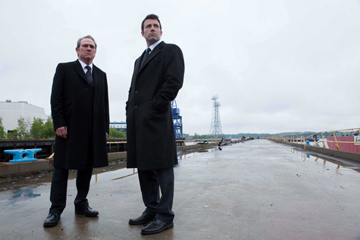
Tommy Lee Jones & Ben Affleck in "The Company Men" (courtesy of VVS Films)
“The Company Men” (USA/U.K., 2010) (A-): “I have begg
ed, I’ve effing begged for a lead, anything. There’s thousands of new MBA’s out there — no
mortgage, no kids… [who will] work 90 hour work weeks for nothing. You want honesty? I’m a 37-year-old, unemployed loser, who can’t support his family… When did it all go to shit?” That’s a question that applies as much to the current sorry state of the North American economy as it does to the desperate predicament of this film’s characters. All of them are highly paid sales managers and senior executives with an American corporation that is in the process of “downsizing.” As we all know, that’s the euphemistic term used for the ruthless purging of devoted, hardworking employees by employers whose only loyalty is to the corporate bottom-line. It’s funny how the many always seem to suffer for the enrichment of the few. Some are dumped while others reap the rewards: Slimming the corporate payroll at others’ expense means hefty increases in the value of stock options for those few at the top of the greased pole. Here, the head of the company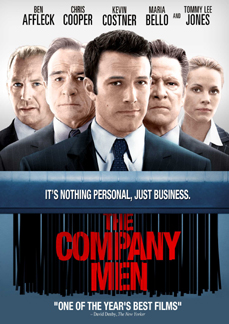 makes 700 times what the average worker at that company earns. It’s not hard to see what motivates citizen groups like “Occupy Wall Street,” given such egregious clashes between basic fairness and shameless greed. “The Company Men” boasts an impressively strong cast, comprised of Ben Affleck, Tommy Lee Jones, Chris Cooper, Maria Bello, Rosemarie DeWitt, Kevin Costner, and Craig T. Nelson. It’s a fictional story, but it’s set in the real world of here and now — a world in which we have been duped (or cowed) into going along with the supposed inevitability of phenomena like ‘globalization,’ ‘downsizing,’ and a process of corporate mega-agglomeration that puts the lie to real competition — all which benefit only the rich and powerful, while real opportunities and income for the rest of us (the 99.9% of us) plummet. The result is a strong, ensemble drama that focuses on characters (and the devastating effects joblessness can exact on human lives) while still commenting on a social ill. And it suggests that a just society is one in which standards higher than the lowest common denominator ought to prevail: (A) “I”m confident that all of these dismissals will stand up to legal scrutiny.” (B) “What about ethical scrutiny?” (A) “We aren’t breaking any laws…” (B) “I guess I always assumed we were trying for a higher standard than that.” “The Company Men” is easily one of the best films of 2010. DVD extras include interviews and a behind the scenes featurette. For ages 18+: Coarse language and brief nudity.
makes 700 times what the average worker at that company earns. It’s not hard to see what motivates citizen groups like “Occupy Wall Street,” given such egregious clashes between basic fairness and shameless greed. “The Company Men” boasts an impressively strong cast, comprised of Ben Affleck, Tommy Lee Jones, Chris Cooper, Maria Bello, Rosemarie DeWitt, Kevin Costner, and Craig T. Nelson. It’s a fictional story, but it’s set in the real world of here and now — a world in which we have been duped (or cowed) into going along with the supposed inevitability of phenomena like ‘globalization,’ ‘downsizing,’ and a process of corporate mega-agglomeration that puts the lie to real competition — all which benefit only the rich and powerful, while real opportunities and income for the rest of us (the 99.9% of us) plummet. The result is a strong, ensemble drama that focuses on characters (and the devastating effects joblessness can exact on human lives) while still commenting on a social ill. And it suggests that a just society is one in which standards higher than the lowest common denominator ought to prevail: (A) “I”m confident that all of these dismissals will stand up to legal scrutiny.” (B) “What about ethical scrutiny?” (A) “We aren’t breaking any laws…” (B) “I guess I always assumed we were trying for a higher standard than that.” “The Company Men” is easily one of the best films of 2010. DVD extras include interviews and a behind the scenes featurette. For ages 18+: Coarse language and brief nudity.
“Submarine” (U.K./USA, 2010) (B+/A-): Oliver Tate (played to perfection by Craig Roberts) is a virginal, acutely self-conscious teenager, whose

Craig Roberts & Yasmin Paige in "Submarine" (courtesy of Alliance Films)
world-view is nothing if not eccentric. Right after the victim of one of his ignoble pranks invites him to “Eff-off and die!,” our antihero dryly observes that, “In many ways, I prefer my own company. It gives me time to think.” A sure sign of an engaging story — be it a book or a movie — is a strong, distinctive voice for its leading character. Fifteen-year-old Oliver has just such a voice, as when he matter-of-factly observes that, “I suppose it’s a bit of an affectation, but I often read the dictionary. My word for today is ‘flagitious,’ which means wickedly shameful.” Based on the popular novel by Joe Dunthorne, and set in Wales, first-time director Richard Ayoade’s film is a marvel of off-beat whimsy: “My mom is worried that I have mental problems. I found a book about teenage paranoid delusions during a routine search of my parents’ bedroom.” Besides Oliver, the film’s personae comedis include Jordana (Yasmin Paige) the pyromaniacal girl of his dreams, his clinically depressed father Lloyd (Noah Taylor), his restless mother Jill (“Made in Dagenham’s” Sally Hawkins), and Graham (Paddy Considine), the New Age self-help guru next door. Every one of them is a study in quirkiness, yet each of them comes across as oddly authentic. The result is as dryly funny as it is unique. The story’s whimsical, highly original ways permeate its point of view (care of an ironic voice-over narration by Oliver himself) and even its filming style (title cards, accompanied by flourishes of deliberately over-dramatic music and bursts of primary colors, announce different sections of the story ). For ages 18+: Coarse language and some briefly crude subject matter. DVD extras include some deleted and extended scenes and a ten-minute making of featurette; but a commentary would have been welcome.
“Before Your Eyes” [“Min Dit”] [aka “The Children of Diyarbakir”] (Turkey/Germany, 2008) (B/B+): The modern state of Turkey has had a violent history of brutally oppressing its ethnic and religious minorities. Armenians fared worst of all, suffering savage persecution in 1894-96 before facing an outright methodical genocide in 1915-16 that is believed to have killed 1.5 million of these ethnically-European Christians. The world’s
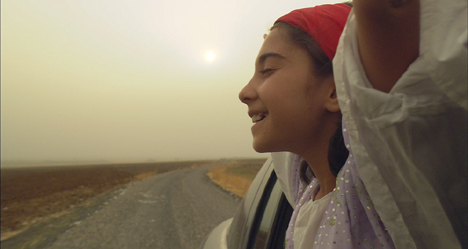
Senay Orak in "Before Your Eyes"
complacent failure to intervene was later cited by Hitler as evidence that his murderous plans for the Jews of Europe would likewise meet with no serious opposition. The fate of the Armenians is obliquely referenced once in “Before Your Eyes.” Anything more would have been difficult, not to mention very dangerous, insofar as Turkey still imprisons its own citizens for daring to acknowledge the Armenian Genocide. Indeed, a journalist who was in the midst of being prosecuted for such a so-called ‘affront to the state’ (“denigrating Turkishness,” they like to call it) was murdered for his trouble in 2007 before the verdict was in. The subject of the film is another ethnic minority — namely, the Kurds, a minority that is Muslim, but not ethnically Turkish. The setting is Diyarbakir in southeast Turkey. Populated mostly by non-Turks, the city had once been home to many Armenians. After their removal by slaughter, the city remained mostly Kurdish; and it is their repression, at the hands of the Turkish state, that forms the backdrop of this story about the plight of two young children. Gulistan and Firat are suddenly orphaned by the senseless murder of their parents by paramilitary forces. Money runs out and they find themselves living on the street, forced to eke out a precarious existence selling odds and ends to passersby. The result is a very simple story — very much a festival film. But it has elements of purity, grace, and poignancy that transcend its premise, thanks in large measure to a luminous, utterly moving performance by Senay Orak as the young girl Gulistan. This ten-year-old child is so utterly expressive, in such an understated, authentic way, as to be quite mesmerizing. In contrast to the plight of the children, we see the brute who killed their parents enjoying a life of domestic normalcy when he is off-duty. How do victims respond to gross injustice? Will they seek justice instead of vengeance? That was a central theme in the recent Danish film “In a Better World,” and it finds echoes here as well. “Before Your Eyes” juxtaposes gentle images involving the sprinkling of water (a presumed cultural tradition) on the graves of the dead and on the departing car of a friend, with a less optimistic scene of children playing with toy guns to the beat of rap music. Brief violence and mildly disturbing content. Film Movement continues its estimable practice of including a short film with every feature film on DVD; and this disc’s choice is exceptional:
“It’s My Turn” [“Bende Sira”] (Germany/Turkey, 2007) (A): Female director Ismet Ergun’s ten-minute short film is sweet, innocent, and irresistible. Its protagonists are a group of children who play a rhyming game to determine who will win the coins they pooled in order to pay for one of their number to go to the cinema, because they can only afford one ticket on a given day. All of this unfolds — quite deliberately — without subtitles. We don’t understand the words being spoken, but we don’t need to — their meaning is perfectly clear. And the sole girl in the group, a sweet little thing who clearly is the kid-sister of one the boys, steals the show as she shyly observes the boys from the sidelines while they select a different moviegoer each day and then listen in delight as their appointed delegate returns to describe the film he has just seen to his peers. The result is a lovely, enchanting ode to childhood — and to the magic of the movies. This short film won a number of festival awards, and it is not to be missed. [Note: As of September 2011, “Before Your Eyes” is only available in Canada to Film Movement’s film club members; the company will make it available on an a la carte basis to non-members in Spring 2012.]
“Jane Eyre” (U.K./USA, 2011) (B+): “I can see in you the glance of a
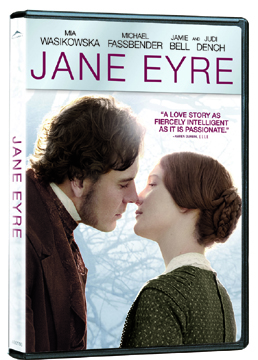
Courtesy of Alliance Films
curious sort of bird through the close-set bars of a cage, a vivid, restless captive. Were it but free, it would soar, cloud-high.” Those words are a succinctly perceptive description of this film’s eponymous protagonist. Banished by her aunt to Lowood, a harsh girls’ school, the orphaned Jane survives the cruelty and deprivation of that institution and, as a young woman, secures a position as governess in the great country house of Thornfield Hall, where she also finds both “[the] first home where I am neither dependent nor subordinate to anyone” and first love, for the moody master of the manor. Charlotte Bronte’s classic 1847 novel, Jane Eyre, has been filmed many times before. (One of this reviewer’s favorite adaptations is the 1970 version starring Susannah York and George C. Scott.) And why not? It tells a timeless story of romantic love that’s touched by tragedy, with star-crossed lovers, and a heroine who is at once brave, strong-willed, keen to be independent, and self-reliant. She is moral, arguably verging on being moralistic, forthright (“Deceit is not my fault”), and proud, nearly to a fault. In many respects a proto-feminist, Jane is curious about the wider world in ways that transcend her gender and class: “I wish a woman could have action in life like a man… If I could behold all I imagine!” The novel, like its filmed adaptations, is a romantic drama, but it also contains elements of social criticism, a morality tale about the wages of sin, and a coming of age story that follows its protagonist from childhood to maturity. There is something of a redemptive tale here, but also some of the conventions of the Gothic novel, with the moody, mysterious, and mercurial male lead who is haunted by his past and a dark manse that is inhabited by a few figurative ghosts. The result is a story well-worth revisiting; and this lovely adaptation, which does so in a non-linear fashion, is bolstered by an able cast. The 22-year old Australian actress Mia Wasikowski made an impression in the recent “Alice in Wonderland,” playing the title role there as a young woman rather than as a child. She likewise combines fragility and strength as Jane. German actor Michael Fassbender (2009’s “Fish Tank”) is a somewhat younger than usual Edward Rochester. And they are nicely supported by the estimable Judi Dench (as the housekeeper Mrs. Fairfax), Jamie Bell (as the earnest young clergyman St. John Rivers), Amelia Clarkson (as a very sympathetic younger version of Jane), Freya Parks (as young Jane’s religiously devout childhood friend Helen), Sally Hawkins (who played the lead in “Made in Dagenham,” as Jane’s cold and resentful aunt Mrs. Reed), and Simon McBurney (as Mr. Brocklehurst, the unkind master of Lowood, who admonishes his staff to render Jane “contrite and self-denying” and not to spare the rod in doing so). There is poignancy here (“I have been alone always”), as well as ill-fated romance and a woman’s struggle to overcome the limitations imposed upon her by social class, convention, and circumstance. [Incidentally, devotees of the literary Jane Eyre should read “Wild Sargasso Sea,” the 1966 novel, by Dominica-born writer Jean Rhys, which is a feminist imagining of the story of the first Mrs. Rochester — Antoinette (aka Bertha) Mason. Told in poetic stream of consciousness from her point of view, it postulates her as a tragic victim rather than as a mere malevolent madwoman.] DVD extras include deleted scenes, a feature commentary , and featurettes.
“In a Better World” [“Haevnen,” literally “The Revenge”] (Denmark/Sweden, 2010) (B+/A-): How does a moral man respond to gross injustice and violence? Does he answer violence with violence? Does he strike back with enough force to deter (and punish) the aggressor? If so, does he become an aggressor himself? When should we escalate a conflict that’s not of our making, and when should we just walk away? What parts of a man’s moral code — such as the injunction to ‘do no harm’ — are too sacrosanct to ever breach? What if upholding that moral code will permit harm to befall others? Those are some of the big questions posed by director Suzanne Bier’s award-winning drama “In a Better World.” But they arise in the lives of two ordinary families. Anton (Mikael Persbrandt) is a Swedish doctor working in a refugee camp in an unnamed African country. He is separated from his wife Marianne (Trine Dyrholm) as a consequence of his infidelity; but he returns to their home in Denmark periodically to spent time with his two sons. The oldest, twelve-year old Elias (Markus Rygaard), meantime, has found a much-needed friend in the person of the new kid at school. Christian (William Johnk Juels Nielsen) has recently lost his mother to illness and is acting-out under the trauma of that loss and of a strained relationship with his well-to-do father Claus (Ulrich Thomsen). The boys fall victim to bullies at school, even as the adult characters in the film face the ugliest side of human nature at home and abroad. The result is a study of unbearable grief, of victimization at the hands of those who are ruthless and brutal, and the ensuing cycle of pain, fear, anger, hatred, and revenge: (A): “If you hit him, he hits you, and then you hit him, and then it never ends. Don’t you see? That’s how wars are started.” (B): “Not if you hit hard enough the first time… No one will dare touch me now.” Biers embodies big moral and philosophical questions in these few characters, characters who spring to life in compelling performances. Her use of extreme long shots — putting human characters at the edge of a frame dominated by looming landscapes and big skies, or leaving human beings out of such shots altogether — may be a way to place all the sound and fury of human conflict into a context of the natural world. That world — with its red soil, limitless sky above, and swirling whirlwinds — is hardly aware of these characters and their troubles. The people who populate this story encounter (and are tempted by) extreme darkness. For this is a story about the worst and best angels of our nature: “I want to forgive you, but I can’t,” says one character, sorrowfully. In the end, it is also a story about the possibility of redemption, of people who have the free choice to give in to fear, anger, and retribution, or to forswear those things in favor of reconciliation. “In a Better World” won Best Foreign Language Film at both the Oscars and the Golden Globes. Sony has released the film on a DVD/Blu-ray combo-pack; but, as become the norm with such things, all the extras are on the Blu-ray disc only. For ages 18+: Coarse language, disturbing content, and violence.
“Blue Valentine” (USA, 2010) (B+): Tragically, falling in and out of love are two sides of the same coin for far too many of us. When you have been lifted high on the wings of romantic love, the ensuing crash down to earth, if it comes, can be devastatingly painful. Such is the experience of this film’s two protagonists. Dean (Canadian Ryan Gosling) and Cindy (Michelle Williams) are deeply in love with each other (and with their young daughter) when their relationship begins; but the story starts near its end, with a couple who are struggling with alienation, bitterness, and resentment. Director and co-writer Derek Cianfrance has opted for a distinctly non-linear approach to his storytelling, alternating scenes of current conflict and angst with the far happier days of past courtship and effortless intimacy. A closely-observed character study of one man and one woman, “Blue Valentine” is also a thoughtful, bittersweet mediation on romantic love: “I feel like men are more romantic than women, ” says Dean. “When we get married, we marry… one girl. Cause we’re resistant the whole way, till we meet [that] one girl, and we think, ‘I’d be an idiot if I didn’t marry this girl. She’s so great.’ But it seems like girls get to a place where they pick the best option or something… I mean, they spend their whole life looking for Prince Charming and then just marry the guy who’s got a good job and who’s gonna stick around.” In this relationship, Dean seems to be the more romantic one; while Cindy is the more practical one. Perhaps she is influenced by her grandmother’s observations about her own marriage: “He didn’t really have any regard for me, as a person. You gotta be careful of that. You’ve gotta be careful that the person that you fall in love [with] is worth it to you.” Seeing a love story turn out badly is always a melancholy thing to behold; but these characters hold our attention through thick and thin; and the performances earned the film nominations for Best Actress at the Oscars, Best Actor and Actress at the Golden Globes, and Best Actress at the Independent Spirit Awards. The film was also nominated for the Grand Jury Prize at Sundance. One thing is sure: It has two of 2010’s best performances! For ages 18+: Abundant coarse language; fairly strong sexual content; nudity; and brief violence.
FILM NEWS
Film Buffs Rejoice!
Distributor ‘Film Movement’ Brings Festival-Quality Fare to DVD
© By John Arkelian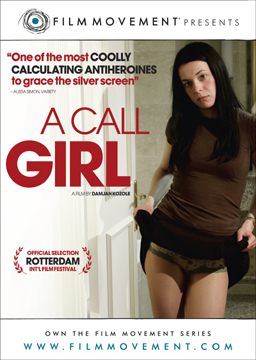
To the chagrin of film-lovers everywhere, many of the best new films remain tantalizingly out of reach. Foreign films, and most independent North American films, generally get severely limited theatrical releases. If they’re lucky enough to be screened anywhere at all, it’s only at a handful of art-house cinemas in the biggest cities. And things are no better when it comes time for their DVD-release. But devotees of film festival fare — in other words, people who like to see the very best quality motion pictures — will find succor in the form of the New York-based firm “Film Movement.” That company releases nothing but independent and foreign films. Launched nine years ago Stateside, Film Movement has recently expanded its operations north of the border; so, Canadian aficionados of high quality films can now access the company’s impressive catalogue of titles. There’s no longer any need to brave the overcrowded, disorganized, and inhospitable festivals of a distant metropolis (Toronto, you know who you are). The self-same fare, from the four corners of the globe, which is shown at festivals, is now available right at your door, on DVD. And, in an inspired move, each title comes with an attendant short film. You can shop à la carte from Film Movement’s website (there’s a separate site for customers in Canada); or, you can join the company’s film club and get twelve new films each year at a subscriber’s discount. The prices look attractive; the film selection even more so! Artsforum is so excited by the cinematic bounty that we plan to review new titles from Film Movement, as well as selected titles from its back-catalogue, on an ongoing basis. First-up is the 2009 Slovenian film “A Call Girl” (see below).
For readers in the United States: http://www.filmmovement.com
For readers in Canada: http://www.filmmovementcanada.com
© August 2011 by John Arkelian.
*******************************************************************
“A Call Girl” [originally called “Slovenka” (“Slovenian Girl”)] (Slovenia/Germany/Serbia/Croatia, 2009) (B+/A-): How many of us lead lives of quiet desperation? This utterly absorbing drama asks just that question. The film comes from the tiny country of Slovenia, a cozy corner of Central Europe occupying just over 20,000 square kilometers that was born as independent state only in 1991, as the larger country of Yugolslavia began an oft-violent disintegration into its constituent parts; and its characters’ lives of internalized desperation may serve, in part, as a metaphor for the larger geo-political tumult in the troubled part of Europe they inhabit. In an ironic, darkly humorous scene, two supporting characters exchange bleak observations about the inner despair that eats away at them as they muse
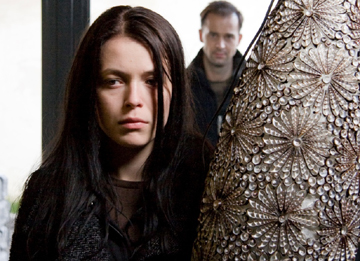
Nina Ivanisin in "A Call Girl" (aka "Slovenka")
about the allure of ending it all: “I’m afraid of myself, you know. If it wasn’t for my little girl, I would have done it, I’m sure… I think about death every day.” But this father’s “little girl” isn’t leading the life he imagines. At 23, Sasha has left the small town of her childhood and moved to the capital city of Ljubljana, where she studies English by day and plies a dangerous trade as a self-employed call girl by night, catering to visiting politicians and businessmen from more prosperous parts of Europe. Her nom de plume is “Slovenka,” which means “Slovenian Girl” in English and which was the film’s original title. And she is embodied in the absolutely mesmerizing person of actress Nina Ivanisin. Cool, composed, and utterly detached, she is endlessly calculating in her single-minded pursuit of material success, even when she is threatened by the unwanted attentions of both the police and ruthless underworld figures. There’s a natural sultriness to her heavy-lidded surveying of the people and situations around her. She’s a practiced liar; but the price for her impressively resourceful use of deceit and sex to achieve her ends is a numb, pitiful detachment from her own emotions — and from her soul — from which it is impossible for us avert our fascinated gaze. Another writer observed that Ivanisin “is probably the closest any actress will ever get to embodying an angel from hell.” Incredibly, this is Ivanisin’s first professional film role, and it is both award-caliber work and one of 2009’s best performances! Someone tells Sasha’s father Edo (Peter Musevski, in a natural performance full of simple dignity) that Sasha is “a good chick,” before modifying that rather inappropriate observation by adding that “she’s a good fighter.” And, there’s no doubt that Sasha is a fighter. While we may not approve of her choices, Sasha’s sheer determination to beat the odds and come out on top in the sometimes hopeless struggle we call life leaves us rooting for her. She may have repressed her emotions, but she does possess them — and, along with them, a realistic insight into the truth of things. “If anybody here should be called a fool, it should be me,” she offers, in a moment of brief resignation. And, in a moment of rare honesty with another human being, she concedes, “We are all lonely, each in our own way.” Although the film won acting awards at a couple of film festivals in Europe, it is a monumental mystery why it was overlooked at more prominent award ceremonies. Director Damjan Kozole’s powerful film is, indisputably, a haunting work of admirable artistry — a work that demands, like the last words uttered on screen, for us to “Watch me now.” Highly recommended. For ages 18+: Sexual content, brief nudity, coarse language, and brief violence.
Note: Although “A Call Girl’s” conventional extras are restricted to cast biographies and the film’s trailer; the DVD-producer, the U.S.-based “Film Movement,” offers a wonderful form of unconventional extra with each of its releases, in the form of a short film! What a great idea! In this case, it’s “Honored” (USA, 2009) (B-): Written and directed by Stephanie Fischette, the 19-mnute short concerns a young widow (Elizabeth Moss) living in seclusion who is visited by one of her fallen soldier husband’s comrades (Charles Borland), bearing letters. Their brief meeting gives us a glimpse into still more lives of quiet desperation: “I just couldn’t continue this non-life of ours; everything dried up.”
“Winter in Wartime”[ “Oorlogswinter”] (The Netherlands, 2009) (B+): A boy in his early teens (‘Michiel,’ played by Martijn Lakemeier) comes of age in occupied Holland one eventful winter in January 1945. Michiel’s father (Raymond Thiry, in a nicely understated performance) is mayor of the small town where they live; but, the boy is disdainful of his father’s quiet, responsible stewardship over the townfolk. It’s an approach that saves lives, but it’s not nearly as dashing or ‘heroic’ as the approach of his brash uncle in the resistance. But, when he tries to help a wounded British airman who is hiding in the forest, Michiel learns the true nature of courage and responsibility. This well-acted wartime drama unfolds from the youngster’s point of view and, refreshingly, relies much more on character drama than it does on gunfire. Kudos to Sony for making this title available on DVD on this side of the pond.
“Miral” (France/Israel/Italy/India, 2010) (B-/B): Director Julian
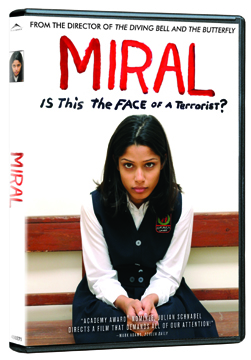
Courtesy of Alliance Films
Schnabel won Best Director at Cannes for his 2007 film “The Diving Bell and the Butterfly,” a film which also earned him an Academy Award nomination in the same category. His latest film looks at four Palestinian women in the occupied West Bank. The most interesting of the four is not the eponymous Miral (played by Freida Pinto of “Slumdog Millionaire”), but rather her teacher, a noble character named Hind Husseini, who is played by the elegant, beautiful, and dignified Hiam Abbass (of “The Syrian Bride”), an Arab-Israeli who (very much like the Persian actress Shohreh Aghdashloo) positively radiates warmth, intelligence, and class. Her character is based on a real-life woman who, until her death in 1994, raised orphaned Palestinian girls to become respected, accomplished, and powerful women. Alas, for much of the film, the beautiful Abbass is all but hidden beneath old age make-up. The putative female lead is played by Pinto; but, somehow, she is less compelling than either her mentor or her gentle imam father, played by Alexander Siddig (the male lead in 2009’s “Cairo Time”). That character’s quiet dignity and innate goodness provide a welcome antidote to the depictions we more often get of religious Muslims as wild-eyed radicals who embrace violence. Siddig and Abbass are the reasons to see this film, which is based on the fictionalized autobiography by Rula Jebreal. It aims to even the scales of perception in the ongoing conflict between Israelis and Palestinians, by presenting a story about Palestinians. And, of course, it is always a good thing to learn more about the world’s ‘underdogs’ and dispossessed. (Heaven knows, the Jews themselves were relegated to those unhappy and undeserved roles for centuries.) But, therein, too, lies part of what weakens the film: It lets its message get in the way of its storytelling at times. The goal always was to juxtapose a very large story with a very personal one; but the result is too often didactic, with expository dialogue explaining the politics — dialogue that is at times awkward and stiff. And some of the plot devices (a would-be bomber gets three life sentences — the third thrown in for good measure simply because she “disrespects” the court trying her by refusing to stand during sentencing) come across as heavy-handed. Apparently, “Miral” has attracted controversy, and, according to the filmmakers, a campaign by Israel to discredit it politically and artistically in effort to prevent it from being seen at all. The director and the screenwriter blame that campaign for the (apparently) mostly hostile critical reaction to the film; but, this critic doesn’t buy their explanation. After all, there really isn’t anything shocking (or, for that matter, courageous) about depicting Palestinians as fellow human beings; it should go without saying that that’s exactly what they are. The film is well-intentioned, and it has a few lyrical moments; but its performances are somewhat uneven, and its screenplay too often shaped by its political message rather than the dictates of good storytelling. That message may be a mostly innocuous one, but it is too often an intrusive distraction that takes us away from the story about these characters. That story is likewise uneven, and it does not consistently muster the emotional and dramatic impact that it should. The result is certainly worth seeing, but, for this politically unbiased critic, it falls short of its potential. Vanessa Redgrave has a cameo role in the film, as does Willem Dafoe. “Miral” was nominated for the Golden Lion at Venice. DVD extras include a commentary with the direct or and producer; three deleted scenes, and an informative Q&A session at a film festival in Chicago.
“Mao’s Last Dancer” (Australia, 2009) (A-): Based on the autobiography by Li Cunxin, director Bruce Beresford’s film is the real-life story of an 11-year old boy in rural China who is plucked from his peasant village and sent to Beijing to be trained in classical ballet. The state arbitrarily decides his fate, sundering this “sixth son” from his close-knit family and immersing him in a demanding, and totally alien, discipline. The state, in the tyrannical form of Communist China, also imposes its noxious totalitarian dogma upon the very art form it seeks to instill, branding any who dare to oppose the contamination of art by ideology as so-called “counter-revolutionaries.” But when Li is selected to visit the United States as a ballet student, he finds a hitherto unknown artistic and personal freedom: “I must dance political ballet in China, but I dance better here, because I feel free.” He also finds first love, in the arms of a young woman. Will Li hew to the ways of obedience, in which he has been relentlessly drilled; or will he break with culture, state, ideology, and even family in order to live free? The story of Li’s life (different actors play the character at ages 11, 15, and 18) is utterly engrossing and moving. It’s an uplifting story of what an individual — including any of us — can do with their life, starting with the simple, homespun wisdom of a father telling his son a story about a frog at the bottom of a well looking up at the sky and wondering what the wide world is like. It’s a story about overcoming obstacles, facing loneliness and self-doubt, and finding the courage both to defy oppression and to chase our dreams: “I don’t want to walk; I want to fly.” Chi Cao does a remarkable job as the adult Li, in a role that requires both acting and dancing skills. Canadian actor Bruce Greenwood deftly disappears into the role of Ben Stevenson, the artistic director of the Houston Ballet, the man who visits China and sees in Li a performing artist who, unlike his peers, is not more athlete than dancer. Supporting players like Joan Chen (as Li’s mother), Zhang Su (as the teacher who inspires him), and Amanda Schull (as his first love, Liz) all make strong impressions, as do the film’s score, and the original choreography by Graeme Murphy. This bittersweet film packs considerable emotional heft — and you don’t need to be an aficionado of ballet to appreciate its inspiring story of human determination, resilience, and redemption. Don’t miss it!
“Somewhere” (USA, 2010) (B): Writer/director Sofia Coppola (of “Lost in Translation”) had this to say about her latest look at two lives that change by intersecting with each other: “I wanted to do something really simple… more like a poem, just a little portrait. I’m not really interested in an elaborate storyline or narrative… but more mood and a portrait of this person and a moment in their life.” We saw an understated, simple pas de deux between a man and a woman in 2003’s “Lost in Translation.” This time around, the pair are a father (played by Stephen Dorff) and his young daughter (played by Elle Fanning). He’s Johnny Marco, a tabloid celebrity sort of Hollywood star, whose exclusive preoccupations (when not working) are wine, women, and song. But his self-indulgent, hedonistic life of anonymous sex and booze has left him numb and bored — a fact that is exemplified by his non-response to his unusual bedtime entertainment. A pair of blond exotic dancers pole-dance for him in his hotel room (at Hollywood’s Chateau Marmont Hotel, where the film was actually shot), but he lies disinterested and enervated on his bed. Indeed, he falls asleep as the girls mechanically go about their business; far from being an erotic display, the whole thing seems pathetic and empty. But, as the non-custodial parent of pre-teen Cleo, Johnny finds himself changing during his young daughter’s visits. He puts down his smart phone (surely an infernal device, if ever there was one, when it comes to putting a technological barrier in the way of real people interacting) and starts to really watch her at skating practice. She cooks for him; they share down-time by the hotel pool; and he starts to really connect with someone for the first time in a very long time. But that positive trajectory brings with it pain and regret: “I’m effing nothing! Not even a person.” Coppola makes very deliberate use of static and lingering scenes. At times, her camera lingers on a scene for a very long time. It’s puzzling and not always agreeable. But, it helps to recall her objective: “I wanted to do something experimental, very minimal. Everything about the way we filmed it was minimal.” The result is indeed experimental in tone; very gradually paced, it’s an extremely understated tone-poem about two lives and how they subtly change (for the better) through their contact one with the other. There’s a nice moment late in the film that is a variation on the enigmatic ending of “Lost in Translation.” In that earlier film, Bill Murray whispers words in the ear of Scarlett Johansson, but we cannot hear what he says. In “Somewhere,” by contrast, Stephen Dorff’s words (“Cleo, sorry I haven’t been around.”) are audible to us, but perhaps not to the character to whom they are being addressed. And, there’s room for an enigmatic ending a few minutes later in the last few frames. “Somewhere” won the Golden Lion (Best Film) at the 2010 Venice International Film Festival. It’s not as emotionally involving as one would like, but it gets points for daring for be different (very different!) and for embracing an unapologetically low-key approach from its first frame till its last. DVD extra consists of a 17-minute look at the making of the movie. For ages 18+: Coarse language and brief nudity.
“Behind the Sun” [“Abril Despedaçado”] (Brazil/France/Switzerland, 2001) (A): “We live in Stream-of-Souls. It’s in the middle of nothing. All we know is it’s above the ground and below the sun. It’s so hot that it sets our hearts boiling like a pot of molasses.” So says the youthful narrator of this study of the seemingly eternal conflict between our human yearning for freedom and our equal and opposite capacity for becoming shackled to beliefs or traditions that condemn us to relive cycles of oppression and destructiveness. Adapted from Ismail Kadaré’s novel “Broken April,” the story is set in rural Brazil in 1910. The initially nameless narrator, a precocious boy of perhaps ten years, who is later dubbed “Pacu” by a pair of exotic traveling circus performers, lives on a farm with his older brother Tonio and their parents. Theirs is a hard-scrabble existence — grinding sugar-cane to produce sugar. Indeed, the grinding wheels or gears of their mill are a metaphor for the crushing, repetitive cycle of the family’s bleak existence. As Pacu observes, “We’re like the oxen here. We go ’round and ’round and never go anywhere.” Like the aforesaid oxen, the members of this family lead narrowly circumscribed lives. They are so trapped and so regimented by the heavy burden of their own past history, they come to perform what is expected of them without even being driven to it. And what is expected is deadly serious business, for the Breves family is ensnared by its own rigid code of family honor and by a blood feud with a rival family that spans generations and has cruelly claimed many lives, including Pacu and Tonio’s eldest brother. That code of vengeance and self-sacrifice now falls to Tonio. Will he obey the dictates of tradition and a dour father, or will assert his freedom by choosing life and love (in the form of Clara, a beautiful young women who performs with a small itinerant circus)? From his vantage-point on a swing, from which he soars — suspended between earth and sky — young Pacu sees things clearly, for all his youthful innocence: “Pa says it’s an eye for an eye. One of theirs for one of ours, and so on, until everyone ended up blind.” Pacu has seen one brother murdered before his eyes, and he wants no more of violence and vendetta. Like Clara, he wants his brother to survive and to break free. Pacu is often immersed in the fairy tale storybook he is given by Clara. He can’t read, so he invents a story of his own imagining to accompany the illustrations and he commits it to memory. But his artful storytelling imitates life, and his own true story (and that of his brother) gets mixed in with his invented fantasy of a new life awaiting by the sea: “I’m trying to remember a story. Sometimes I can. Sometimes I get mixed up. Because there’s another one stuck in my head. It’s about me, my brother, and a [bloodstained] shirt in the wind.” “Behind the Sun” is a quiet but gripping story, with very intimate, affecting performances and lovely cinematography. Treading the borderlands between the human proclivity for destructiveness and our nobler ability to put the dictates of tradition and so-called ‘honor’ aside in favor of love and life, it is a bittersweet reflection on how we live and what we love; and, it has an almost dreamlike, transcendent quality at times, despite being set in a very specific time and place. A large part of the story’s appeal springs from the fact that it is largely told through the innocent eyes of a unusually perceptive child. “Behind the Sun” was directed and co-written by Walter Sales (“Central Station” and “The Motorcycle Diaries”). It was nominated as Best Foreign Language Film at both BAFTA and the Golden Globes, and it won the “Little Golden Lion” at Venice (where it was also nominated for that award’s big brother, the Golden Lion, or Best Film) as well as acting and directing awards in Brazil. For ages 16+: Brief moderate violence and mild sensuality.
“Trois Couleurs: Rouge” [“Three Colors: Red”] (Switzerland/France/Poland, 1994) (B+/A-): Set in Geneva, Switzerland, “Rouge” is the third (and final) part of director Krzysztof Kieslowski’s “Three Colors” trilogy. Each of the three films stands as a self-contained story, involving separate characters; and each (“Blue,” “White,” and “Red”) is associated with one of the colors of France’s flag (watch for a flurry of all things red in this installment) and with a corresponding third of France’s national motto of “Liberty, Equality, and Fraternity.” The theme here, then, is “fraternity,” and it takes the form of a most unconventional friendship between a young model named Valentine (played by the lovely Irene Jacob) and an older man (played by Jean-Loius Trintignant). He’s a retired judge. Detached, world-weary, and alone, he spends his days intercepting and eavesdropping on the telephone conversations of others: “I don’t know whether I was on the good or the bad side [as a judge]. Here, at least, I know where the truth is.” The oft-painful secrets of others into which he pries represent a parade of folly to this jaded, cynical critic of the human condition. Nothing seems to matter to him. Alluding to the secrets of one set of neighbors, he tells Valentine: “It matters little whether I spy or you tell them. Sooner or later, he’ll jump out a window or she’ll find out everything… It will be living hell. What can we do about it?” When Valentine arrives at his door, with the dog she accidentally injured in a road accident, the judge shows no interest in his pet and tersely dismisses the Good Samaritan. But that fleeting meeting leads to others, as something impels this pair to seek out each other’s company. Just as intriguingly, “Rouge” has to do with causality — the way our actions create ripples that set an unforeseen chain of cause and effect into motion (a theme to which Kieslowski and his writing collaborator Krzysztof Piesiewicz often return). Are either of the leads here aware of those unseen ripples? Valentine senses something: “I feel something important is happening around me me. And it scares me.” And it is possible that the judge’s perceptions of cause and effect may run even deeper: “Since then, I’ve never loved another woman…. I stopped believing. Maybe I met the woman. Maybe you’re the woman I never met.” The film is part unconventional love story, part philosophical meditation on human nature, part reflection on the chain of events that propels us all in unexpected directions, and part psychological drama, and it has an aura of mystery for good measure. The result is utterly absorbing, with fine performances, a strange and fascinating story, and another lovely score by Zbigniew Preisner. “Rouge” was nominated for Best Director, Cinematography, and Original Screenplay at the Academy Awards; for Best Foreign Language Film at the Golden Globes; for Best Foreign Language Film, Actress, Director, and Screenplay at BAFTA; and for Best Film at the European Film Awards. It won a Cesar in France for Best Score (where it was nominated for Best Film, Actor, Actress, Director, et al.); and it won Best Foreign Film at the Independent Spirit Awards. The three-disc “Trois Couleurs” set from Alliance has all three films in the trilogy, albeit without any DVD extras. For ages 18+: Brief sexual content and brief nudity.
“The King’s Speech” (U.K./Australia/USA, 2010) (B+/A-): A historical drama — about a man who would really prefer not to be king — becomes an up close and personal human drama in this award-winning film about the 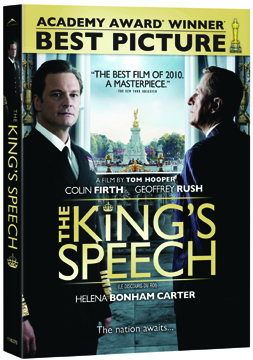 unconventional relationship between two men. Prince ‘Edward Arthur Frederick George’ (aka “Bertie”), the Duke of York, is second in line to the British throne when the story opens (in 1925); and, he’s more than content to keep it that way. Since the age of five, he’s been afflicted with a severe stutter, perhaps precipitated by shyness and a sense of inadequacy. He shuns the public spotlight (as best one can when one is the son of a king), and he feels nothing but relief that succession to the crown will fall to his older brother David. The death of their father does indeed bring his sibling to the throne, as Edward 8th, but the new king’s determination to marry a divorcee from America ends with his abdication, a turn of events that propels the prospective George 6th to the royal hot-seat better known as the Stone of Scone. Will he be the mad stuttering king? (“The nation believes that when I speak, I speak for them. But I can’t speak.”) Not if his self-taught Australian speech therapist, Lionel Logue, has anything to say about it. Colin Firth and Geoffrey Rush are two delights to behold as the proud but inwardly insecure monarch and his unorthodox, controversial, and undeferential mentor, respectively. Together, they are the making of this movie, with two deeply human, award-caliber performances that are indisputably among the year’s very best! And the supporting cast is first-rate, with Michael Gambon as George 5th; Jennifer Ehle as Mrs. Logue [trivia devotees take note: she played Elizabeth Bennet to Colin Firth’s Mr. Darcy in BBC’s 1995 acclaimed adaptation of “Pride and Prejudice”]; Caire Bloom as Queen Mary; Helena Bonham Carter as Bertie’s wife Elizabeth; Timothy Spall as Churchill; Guy Pearce as Edward 8th; and Derek Jacobi as the Archbishop of Canterbury. David Seidler’s wonderful screenplay is full of humor, painful discomfort that rises to sheer inner anguish, and dauntless human pluck and perseverance. It’s an absorbing, utterly involving character drama of two people who form an uneasy alliance to overcome a seemingly hopeless handicap. The film won four Oscars — as Best Film, Best Actor, Best Director, and Best Original Screenplay — and it was nominated for eight others, not to mention a roll-call of nominations and wards elsewhere. DVD extra: feature commentary with director Tom Hooper and more. For ages 18+: Coarse language.
unconventional relationship between two men. Prince ‘Edward Arthur Frederick George’ (aka “Bertie”), the Duke of York, is second in line to the British throne when the story opens (in 1925); and, he’s more than content to keep it that way. Since the age of five, he’s been afflicted with a severe stutter, perhaps precipitated by shyness and a sense of inadequacy. He shuns the public spotlight (as best one can when one is the son of a king), and he feels nothing but relief that succession to the crown will fall to his older brother David. The death of their father does indeed bring his sibling to the throne, as Edward 8th, but the new king’s determination to marry a divorcee from America ends with his abdication, a turn of events that propels the prospective George 6th to the royal hot-seat better known as the Stone of Scone. Will he be the mad stuttering king? (“The nation believes that when I speak, I speak for them. But I can’t speak.”) Not if his self-taught Australian speech therapist, Lionel Logue, has anything to say about it. Colin Firth and Geoffrey Rush are two delights to behold as the proud but inwardly insecure monarch and his unorthodox, controversial, and undeferential mentor, respectively. Together, they are the making of this movie, with two deeply human, award-caliber performances that are indisputably among the year’s very best! And the supporting cast is first-rate, with Michael Gambon as George 5th; Jennifer Ehle as Mrs. Logue [trivia devotees take note: she played Elizabeth Bennet to Colin Firth’s Mr. Darcy in BBC’s 1995 acclaimed adaptation of “Pride and Prejudice”]; Caire Bloom as Queen Mary; Helena Bonham Carter as Bertie’s wife Elizabeth; Timothy Spall as Churchill; Guy Pearce as Edward 8th; and Derek Jacobi as the Archbishop of Canterbury. David Seidler’s wonderful screenplay is full of humor, painful discomfort that rises to sheer inner anguish, and dauntless human pluck and perseverance. It’s an absorbing, utterly involving character drama of two people who form an uneasy alliance to overcome a seemingly hopeless handicap. The film won four Oscars — as Best Film, Best Actor, Best Director, and Best Original Screenplay — and it was nominated for eight others, not to mention a roll-call of nominations and wards elsewhere. DVD extra: feature commentary with director Tom Hooper and more. For ages 18+: Coarse language.
“Black Swan” (USA, 2010) (B+): “We all know the story — a virginal girl, pure and sweet, trapped in the body of a swan. She desires freedom, but only true love can break the spell. Her wish is nearly granted in the form of a prince; but, before he can declare his love, the lustful twin, the black swan, tricks and seduces him. Devastated, the white swan leaps off a cliff, killing herself, and, in death, finds freedom.” Life imitates art in this drama about a young ballerina who is selected to dance the lead role in the ballet “Swan Lake.” Nina (Natalie Portman) has one part of the double-role down pat: As the sweet, virginal white swan, she’s a natural. But the question her doubting artistic director (Vincent Cassel) keeps asking her is whether she can “let go,” embracing the wild lawless passion of the character’s evil twin. Can Nina embody both swans — the white and the black? Doing so entails a metamorphosis — not only of the character but of the dancer portraying her: “Forget about control [she’s urged], I want to see passion!” Well, Nina and company have reason to be careful about what they wish for. In an effort to remake herself to suit the demands of the artistic director and fend off the perceived rivalry of another dancer (Mila Kunis), Nina starts to unravel, losing not only her penchant for self-control but also her grasp on reality, as she is haunted by a destructive alter-ego of her own imagining. Pressures at work and at home, where Nina contends with an emotionally smothering mother (Barbara Hershey), induce what seems to be a schizoid break with reality. Natalie Portman does a fine job of portraying the ruinous unraveling of a young woman whose whole being revolves around her craft as a dancer. But the filmmaker, director Darren Aronofsky, is unduly heavy-handed in the depiction of this mind and psyche’s disintegration into madness. Feathers emerge from human flesh, hitherto repressed sexual wantonness erupts pretty blatantly, and blood flows (sometimes a tad ickily) from the physical changes that mirror Nina’s psychological ones. Why not eschew that reliance on make-up, effects, and violent imagery in favor of something more subtle and ambiguous? Much better takes on madness can be found in such masterworks as “The Innocents” (1961) and “The Haunting” (1963), as well as The Snake Pit” (1948) and “Black Snake Moan” (2006). That objection aside, however, the film is buoyed by strong performers all-round, including Winona Ryder as an “aging” (the shelf-life for dancers is all too brief) prima ballerina who finds herself discarded in favor of a new “little princess.” “Black Swan” won Best Actress at the Academy Awards, BAFTA (where it was also nominated in eleven other categories, including Best Film and Director), and Golden Globes. It was nominated for Oscars as Best Film, Director, Cinematography, and Editing; and supporting actress Mila Kunis won an acting award at Venice. For ages 18+: Warning: Abundant coarse language; some strong sexual content; violence; and some mildly disturbing content.
“Inside Job” (USA, 2010) (A): This startling investigation into the the world’s recent global recession makes it clear that the crisis — a cataclysm that cost the world tens of trillions of dollars, rendered 30 million people unemployed, and doubled the national debt of the United States — was no accident. It was the direct, avoidable result of deliberate wrongdoing by the rich and powerful, aided and abetted by high-ranking public officials. Produced, written, and directed by Charles Ferguson, this stunning documentary plays like a riveting suspense thriller driven by relentless investigative journalism. Without sacrificing narrative sweep or thoroughness, it presents concepts that may be unfamiliar to many viewers (like so-called “derivatives”) in a manner that lay-people can grasp and follow. It will leave you stunned, appalled, and enraged. It’s a revolting tale of limitless greed, systemic corruption, and massive legalized fraud perpetrated by white-collared criminals whose expensive mansions, cars, private jets, whores, and drugs were their reward for sticking a dagger into the heart of our society. Summary execution is too kind a fate for this monumental betrayal of all interests save their own. But not one of these malefactors has even been prosecuted! On the contrary, the self-same cabal of bald-faced liars and shameless villains arrogantly retain their vise-like grip on the reins of money and political power. Their reckless greed, gross conflicts of interest, and deliberate deceit caused a financial catastrophe and weakened the very foundations of countries like the United States. The outrage “Inside Job” fuels will leave you desperate for justice; but, alas, it is in as short supply as good governance, responsible regulation, genuine regard for the public interest, and basic accountability. Does a society — our society — that permits this sort of travesty deserve to survive? As the filmmaker says, “For decades, the American financial system was stable and safe. But then something changed. The financial industry turned its back on society, corrupted our political system, and plunged the world economy into crisis. At enormous cost, we avoided disaster and are recovering. But the men and institutions who caused this crisis are still in power, and that needs to change. They will tell us they we need them and that what they do is too complicated for us to understand. They will tell us that it won’t happen again. They will spend billions fighting reform. It won’t be easy. But some things are worth fighting for.” “Inside Job” won the Academy Award as Best Feature Length Documentary; it also won Best Non-Fiction Film from the National Society of Film Critics. It is one of the best films of any kind (fiction or non-fiction) of 2010!
“Winter’s Bone” (USA, 2010) (A-): Sometimes the vicissitudes of life force us to grow up early; and that’s certainly the case for 17-year old Ree Dolly. Abandoned by her father, she’s all that stands between her two young siblings and mentally incapacitated mother and utter ruin. Their survival is up to her, and the obstacles that confront her — youth, poverty, gender, the animosity of the rural region’s ruthless criminal clans, and a deadline imposed by the implacable workings of the legal system — seem impossible to overcome. But Ree (beautifully portrayed in a compelling, award-caliber performance by Jennifer Lawrence) is tough, resolute, and fiercely determined. She comes from sturdy stock (“I’m a Dolly, bred and buttered,” she says proudly); but she hasn’t been tainted by the rancor or brutality that poison so many of her kin. In a rare moment of doubt, teetering on despair, she confides to an uncomprehending mother that, “There’s things happening, and I don’t know what to do. Can you please help me this one time” But, her proclivity for understatement doesn’t obscure her crystal clear discernment of just how grave her family’s plight really is: “I got two kids who can’t feed themselves yet. My mom’s sick and she’s always gonna be sick. Pretty soon the laws are coming and taking our house and throwing us out to live in the field like dogs.” She also understands that her indefatigable attempts to forestall that fate are apt to get her killed by her own savage relations. For Ree has the misfortune to live in a rough, raw, ugly world — a rural expanse of vendettas and violence that’s set in the midst of the Ozark Highlands (a 47,000 square mile plateau that straddles parts of Missouri and Arkansas). It’s a place where only the tough survive. But Ree is tough without losing her integrity. She (and a few others) stand for decency in a tumultuous, dangerous sea of man-made ugliness. Jennifer Lawrence is ably supported by John Hawkes, who plays her volatile uncle Teardrop. Their performances are fiercely intense — the stuff of many award nominations. And the supporting players are instantly convincing, with performances so natural they seem to have stepped out of a documentary. “Winter’s Bone” exemplifies filmmaking at its finest — a first-rate motion picture, adapted from the novel by Daniel Woodrell, that won the Grand Jury Prize at Sundance (as well as that festival’s screenwriting award). It earned four Oscar nominations — for Best Film, Actress, Supporting Actor, and Adapted Screenplay. Jennifer Lawrence also earned a Golden Globe nomination as Best Actress. The film picked up seven nominations at the Independent Spirit Awards; and it deservedly won Best Breakthrough Performance (for Lawrence) from the National Board of Review. It may depict a dark world, but there is a light shining in that darkness, and it is an irresistible one. For ages 18+: Coarse language and some brief moderate violence.
“The Fighter” (USA, 2010) (B+/A-): “What are you going to do without your family?” That’s the recurring question in this true story of an underdog who yearns for a chance to make good. Micky Ward (Mark Wahlberg) is an all but unknown boxer, living in the shadow of his older brother Dicky Eklund (Christian Bale of “The Dark Knight”) in a small city in Massachusetts. For his part, Dicky clings to the renown of having once knocked down Sugar Ray Leonard in the ring; but his glory days are long behind him and all of his promise is spent. Ruined by failure and drugs, Dicky is still the apple of his mother Alice’s (Melissa Leo of “Frozen River”) eye. Alice is a iron-willed force of nature — an abrasive, trailer-trash variant on Sandra Bullock’s winning character in “The Blind Side.” When Micky tries to assert his independence, in part through the influence of a new girlfriend (Charlene, played by Amy Adams), his mother and sisters close ranks to repel the intrusion of this unwelcome outsider like a band of harridans. Add to the mix a well-meaning stepfather and said gaggle of trash-talking hussies, and you’ve got one big fat dysfunctional family. It’s a raucous, combative, foul-mouthed brood: They squabble incessantly, and they don’t know the meaning of being realistic, sensible, or decorous. But, they stick together (even if in mid-conflict amongst themselves) against the outside world through thick and thin. And that’s the secret of this movie’s appeal. You don’t have to care a fig for boxing to get strongly invested (and strangely charmed) by this boisterous bunch. There are award-caliber performances all around, as well as a narrative that holds out the hope of personal and professional redemption (“I was embarrassed. I’m sick of being a… disappointment!”) It is a classic underdog story — anchored in visceral performances and characters who, like the rest of us, are flawed but still deserving (on their best days) of admiration. At the Academy Awards, “The Fighter” was nominated for Best Film, Director, Actress (Amy Adams), Original Screenplay, and Editing; and it won for Best Supporting Actress (Melissa Leo) and Supporting Actor (Christian Bale). It won in those same categories at the Golden Globes; and it has attracted many, many nominations at BAFTA, the Directors Guild of America, and elsewhere. It is indisputably one of the best films of the year — and it’s not to be missed! For ages 18+: Abundant coarse language and moderate violence.
“Get Low” (USA, 2009) (A-): “I was always restless… but I didn’t go nowhere on purpose, because I did something I was ashamed of.” So says the aging recluse played by Robert Duvall — a man who has lived in self-imposed seclusion for the better part of a lifetime in the aftermath of a tragic past mistake: “I built my own jail and put myself in it. And I stayed in it for 40 goddamn years!” Perceived (wrongly) by nearby town-folk as a crazy old hermit, Felix Bush emerges one day from his cabin in the forest with an unexpected request. Figuring that it’s about time for him to “get low” (that is, to die and get buried), he wants to arrange for his own funeral. But, there’s one twist: He wants it to occur while he’s still alive — as a kind of living wake, an event that’s to be open to anyone who comes prepared to tell a story about him. His appointed agents for this unusual undertaking are the financially strapped proprietors of the local funeral home — played by a bemused Bill Murray (“What are the odds of a funeral home going broke?… What do you do when people won’t die?”) and his earnest subordinate played by Lucas Black. Felix is the proverbial man of few words, though, as Bill Murray’s character observes, “Is it just me, or is he extremely articulate when he wants to be?” Felix is burdened by a painful sense of responsibility for past tragedy, but he is also a clear-sighted, wryly funny man; and his story is a wise reflection on regret, forgiveness, and life. When someone remarks that, “There are two sides to every story,” Felix succinctly replies that, “People say that, but they don’t believe it… They think what they think, and they don’t want to know anything else.” The result is a poignant, endearing, and deftly humorous character study, with sparkling, note-perfect performances from the principal players (has Duvall ever been in a role that didn’t instantly, and memorably, engage us with his down-to-earth humanity?) and strong supporting work from Sissy Spacek, Bill Cobbs, and, briefly, Gerald McRaney. DVD extras include a commentary with Duvall et al., a cast and crew Q&A, and more.
“Never Let Me Go” (U.K./USA, 2010) (B+): Kathy, Tommy, and Ruth grow up together in the cloistered setting of a private school set in the verdant English countryside, where they’re told, “Students of Hailsham are special.” They are friends, but as they grow older, both girls develop a romantic interest in the boy. They (and we) soon learn what it is that’s so “special” about these characters and their classmates. Let’s just say that they are predestined to lead lives that are carefully circumscribed — both in the directions those lives can take and in their duration. Based on the novel by Kazuo Ishiguro (who is also the author of “The Remains of the Day”), “Never Let Me Go” uses what seems, at first glance, like a science-fiction convention as its underlying premise; but it is presented in unexpectedly matter-of-fact terms — taking place not in our future but in our near-past (specifically, the last half of the 20th century). On one level, the story may be a cautionary tale about selfishness, dehumanization, and exploitation (that age-old tale of human history) rearing their ugly (and all too ubiquitous) heads once again in a new scientifically-enabled social context. But on a far more profound level, it transcends its “brave new world” context and serves as a metaphor and allegory for all human lives — asking, as it implicitly does, “What is the soul?,” and “What does it mean to be human?” It’s a story about mortality — that common condition of us all — and about how we choose to use whatever time we’ve got. It’s also a story about life — everyone’s life. And, it’s a story about love — the very thing that connects us to others and perhaps the only thing we must not pass through life without embracing. The result is a gentle, bittersweet, softly tragic, yet somehow beautiful, meditation on the human condition. A great deal of the story’s tension, pathos, and repressed energy are veiled — leaving it to the cast to convey deep emotion with admirable subtlety and restraint. As screenwriter Alex Garland says, “It’s all quite toned down and behind the eyes.” In the film’s first act, the trio are twelve-year olds, played by the talented young actors Isobel Meikle-Small (as Kathy) , Charlie Rowe (as Tommy), and, Ella Purnell (as Ruth). When they reach young adulthood, those roles are assumed, respectively, by Carey Mulligan (of “An Education”), Andrew Garfield (of “The Social Network”), and Keira Knightley (of “Pride and Prejudice” and various piratical adventures). Those players are ably supported by Charlotte Rampling (as the school’s stern headmistress), Sally Hawkins (as a sympathetic teacher), and Andrea Riseborough and Domhnall Gleeson (as young adult flatmates). The cast (in both age-groups) do award-caliber work in nuanced, adeptly restrained performances. But if the story is often sad, the filmmakers were determined to avoid making a picture that was visually bleak and dour. Instead, they’ve created great visual beauty, making very conscious decisions about the pastel palette of colors they employ to frame their characters. And, Rachel Portman likewise contributes a lush original score. In the end, this is a story about shared sadness — the sadness of limited lifespans, uncertainty, and the need to hold on to others for sheer comfort — that we all share. As a character says, “Maybe none of us really understands what we live through or feel we’ve had enough time.” There’s sadness in that realization but also a kind of calm acceptance. “Never Let Me Go” won Best Actress (Carey Mulligan) at the British Independent Spirit Awards, where it was also nominated for Best Director, Screenplay, Supporting Actor, and Supporting Actress. It’s a shame it was overlooked in terms of Academy Award nominations, for it is certainly one of the best films of the year. For ages 18+: Brief nudity, brief sexual content, and mildly disturbing content. DVD extras include a highly insightful 30-minute featurette, but no commentary.
“Mother and Child” (USA/Spain, 2009) (B+): This well-acted ensemble drama presents three women in three different variations on a theme. Their lives intersect and collide, as their stories go in unexpected directions. One woman (Annette Bening) is haunted by the infant daughter she was obliged to give up when she gave birth at the age of 14. Another woman (Naomi Watts) has grown up as an adopted child, becoming a professional success but beset with a figurative hole in her heart when it comes to connecting with others. A third woman (Kerry Washington) is gambling her marriage and her hopes for happiness on her decision to adopt a child she cannot herself conceive. These are troubled, damaged souls, complicated people in search (whether they know it or not) of peace. Their lives are emotionally turbulent, and, in different ways, each of them keeps others at a distance: “I’m difficult. I don’t make friends easily. I demand a lot from others. It’s unfair, but I do. I don’t like being disappointed.” Written and directed by Rodrigo Garcia, a native of Columbia who also wrote and directed “Nine Lives,” the strength of this film is in its performances, with its trio of leading ladies ably supported by Jimmy Smits, Samuel L. Jackson, Cherry Jones, David Morse, Marc Blucas, and others. (Alexandria Salling makes a strong impression in a brief appearance as the teenage version of Annette Bening’s character.) For its part, the screenplay is quite good, but it is undermined in small ways by instances of contrivance and loose ends: When someone dies, we’re told (however improbably) that no one she knows hears about it. Elsewhere, someone’s ex-lover just happens to meet a replacement in very short order; an institution that should have better safeguards conveniently misplaces a critical document; and characters do things — like dumping spouses, serially changing accommodation, and behaving maliciously — that are not always adequately developed or explained in the story. Sometimes these glitches feel like instances of over-writing, that is, an over-indulgence by the screenwriter in complex, elaborate, or ornate plotting when simplicity would have worked better. But, such cavils aside, this is a very good film with very fine performances. It got nominations for Best Supporting Actress (Watts) and Best Supporting Actor (Jackson) at the Independent Film Awards. For ages 18+: Sexual content, brief nudity, and some coarse language.
“You Don’t Know Jack” (USA, 2010) (B/B+): “When a law is deemed immoral by you, you must disobey it.” So says the eccentric doctor whose support for “assisted suicide” brought him into direct conflict with not only the law, but also with a large segment of society. Dr. Jack Kevorkian played a direct role in over 130 deaths, seeing himself in a heroic battle against archaic, unenlightened legal prohibitions and social strictures against so-called assisted suicide. But, what he characterized as “death with dignity” looked like something very different to others. To some, he was a ghoul, a traitor to his duty to his duty as a physician to do no harm, and a mass murderer. To this film’s credit, it doesn’t draw any hard and fast legal, ethical, or public policy conclusions about this terribly difficult and controversial issue. It simply depicts the man — and his crusade. It is left to each of us to decide whether he was right or wrong. Al Pacino won an Emmy for his surprisingly understated, yet thoroughly convincing, performance as a man who is at once very smart, very driven, and very strange. Kervorkian isn’t an easy man to like — or to know — and that explains one-half of the title’s double-meaning. He’s willful, egotistical, emotionally remote, prone to grandstanding, and often self-destructive: “You’re a stubborn fool [says his lawyer]… For a brilliant man, you show an alarming lack of judgment when it counts the most.” But, Pacino’s performance also renders him fascinating, as it hints at inner pain and self-doubt, and perhaps flawed mixed motivations, that hide behind walls of intellectual hauteur and seeming moral certitude (“I don’t care what happens to me, and I’m not afraid, because I’m right“). Is Kevorkian’s comparison of the prohibition on assisted suicide, let alone outright euthanasia, to the Nazis a valid one, or a case of wildly inverted hyperbole? Does his coldly analytical (and resolutely unsentimental ) manner reveal a lack of empathy both for opposing points of view and for the anguished people he ‘helps’ to die? Does his true unbeliever’s atheism make him too adamant, too prone to proselytizing, and too certain he’s right and his opponents are wrong? He’s clearly eccentric, obsessive, and a bit kooky. But is he a mad scientist or a humanitarian? The film leaves us to ponder these and other questions, with strong performances from Al Pacino, Susan Sarandon, Brenda Vaccaro, an almost unrecognizable Danny Huston (as Kevorkian’s flamboyant defense attorney), and John Goodman. The film won Emmys for Best Actor and Best Writing; and it was nominated as Best Made-for-Television Movie, Director, Cinematography, Supporting Actress (for both Sarandon and Vaccaro), Supporting Actor (Goodman), and a long list of other categories. It is a very well-crafted story about a controversial man and an even more controversial subject. For ages 18+: Occasional coarse language. The DVD includes a featurette about the real people behind the movie’s characters, one of whom dubs Kevorkian “a character with a capital ‘C.'”
“Temple Grandin” (A-): “My name is Temple Grandin. I’m not like other people. I think in pictures, and I connect them.” Those are the opening words in an outstanding new bio-pic from the people at HBO — the same network that brought us the captivating 2009 version of “Grey Gardens,” starring Drew Barrymore and Jessica Lange. Well, they’ve done it again, with a made for cable television movie that’s infinitely superior to most of what’s made for the big screen. Claire Danes delivers a brilliant performance as the eccentric young woman who is simultaneously blessed and cursed by her condition. She is autistic at a time when that condition was poorly understood. She shuns physical contact with her mother, reaches the age of four without speaking a word, is prone to sensory overload and ensuing panic, and finds herself friendless, mocked, and marginalized. But the sheer determination of this unique woman, bolstered by the support of her mother (Julia Ormond), aunt (Catherine O’Hara), and high school science teacher (David Strathairn) keep propelling Temple through life’s doorways: “Think of it as a door. A door that is going to open up onto a whole new world for you, and all you need to do is to decide to go through it.” Think of it, indeed. Here’s a person with acute powers of observation. She instantly takes in details that the rest of us miss, with staccato flashes of amazing perception and astonishing bursts of insight. She has an instantaneous ability to to perceive geometric pattens and angles; she can sense the panic of an animal being immobilized for inoculation, with an intuitive understanding of the “sensory thinking” (“they think in pictures, they think in smells, they think in sounds”) that drives animal behavior. She has a kind of photographic memory – a mere glance at a page of French text allows her to perfectly recall every word. (Oh, for such an ability!) But her acute sensitivity – the gift that enables her to mentally photograph or scan what she sees – is also a terrible burden. She sees and hears all the cacophony the rest of us tune out or miss altogether: The result can overwhelm her. Her perception is at once enhanced and distorted. And her uniquely wonderful gift for visual thinking leaves her bereft in the more mundane matters of inter-personal relations. Temple thinks and talks in something like a stream of consciousness; she tends to take what people say very literally; and she’s well aware that she’s regarded as an oddball or freak by others: “I don’t understand people.” Yet those who care for her are adamant that what sets her apart as different ought not to hold her back: (A) “We know how different she is.” (B) “Different, not less.” Temple does the seeming impossible – graduating from high school, and then college,and then going on to earn a doctorate. Currently a professor at Colorado State University, Temple Grandin lectures worldwide on autism and on animal handling, her chosen field of study. And, over half of all the cattle in North America are handled in the remarkable humane systems she designed. This film transcends the small-screen medium for which it was made. It is the best film of the year to date. It earned 15 prime time Emmy Award nominations, among them: Best Made for Television Film, Best Actress, Best Director, Best Writing, Best Supporting Actor (Strathairn), two Best Supporting Actress nods (both O’Hara and Ormond were nominated), Best Music, Best Arts Direction, Best Editing – and more. It’s a beautifully made (it does a artful job of representing how Temple perceives the world), beautifully acted movie. In short, it’s a great film — one that’s not to be missed! The DVD has a fascinating commentary by the real Temple Grandin, the director, and the screenwriter.
